














Disruption, data, and digital technologies are shaping the future of energy. Customers, shareholders, and even employees are increasingly expecting digital innovation across all touchpoints.
Get ahead of tomorrow’s challenges. We can help you innovate strategically – from design and implementation of new business models, to deployment of new IT infrastructure and automation capabilities. www.deloitte.com/us/digital-utilities
Copyright © 2019 Deloitte Development LLC. All rights reserved.

In a fast-paced world, it’s imperative to see challenges as opportunities. Six executives share how they encouraged transformation from their seats at the table. ZSOLT




Trained physicist Axel Andre on how he transitioned into a stimulating career on Wall Street 40
Through each step of his career, Noel Marsden knew the most important thing was to learn how to lead people
8

Sahil Bloom brings leadership lessons learned on the baseball diamond to Altamont Capital Partners
17
Masha Trainor shares how she helps set strategy as Ampco-Pittsburgh Corporation’s general counsel 48
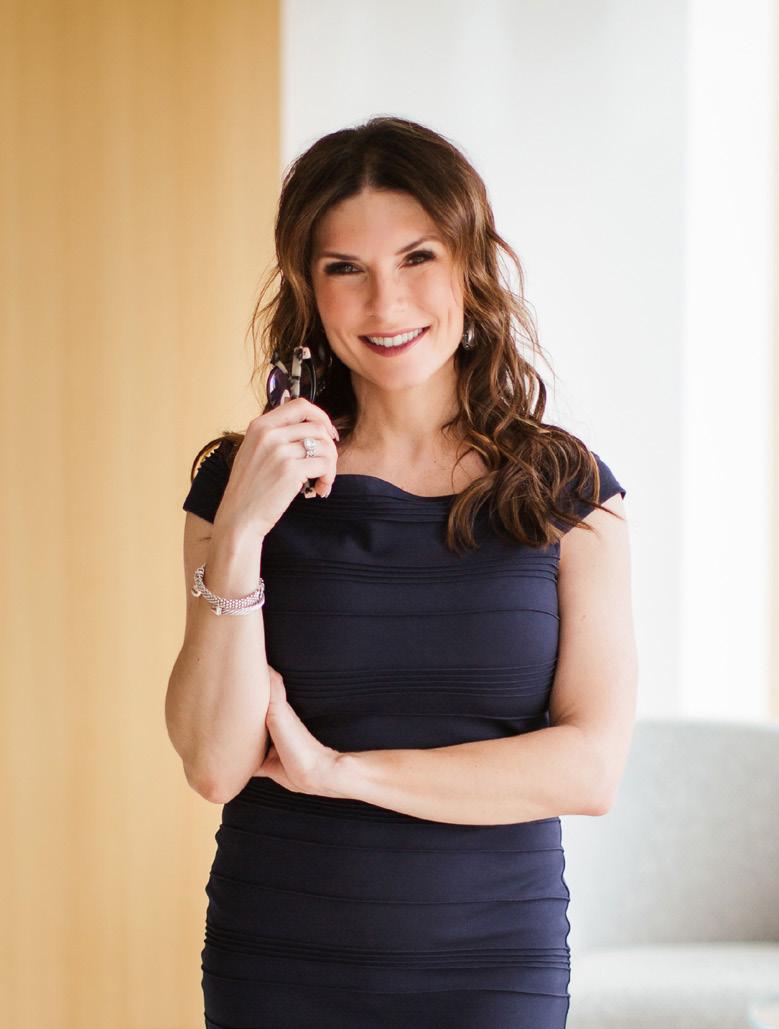
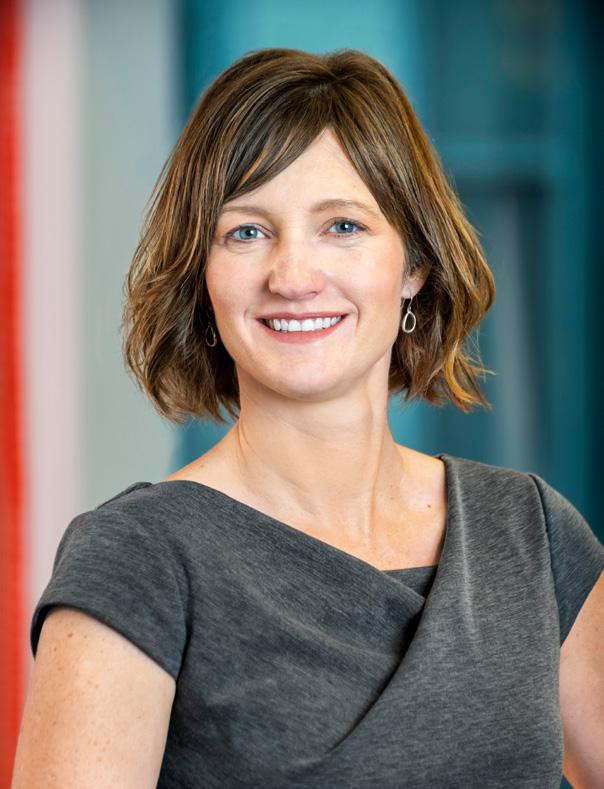
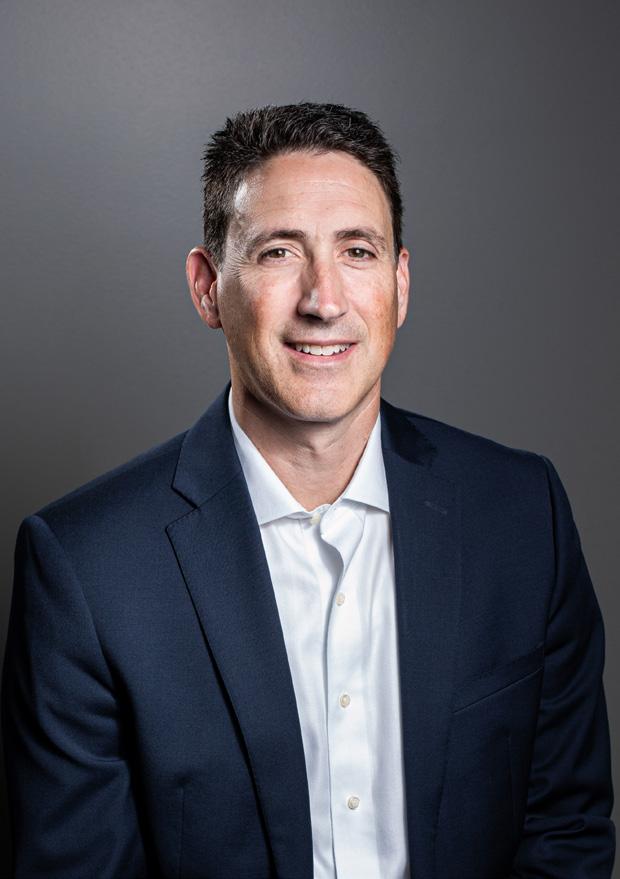

VP, Creative
Kevin Beauseigneur
Director, Editorial
Kevin Warwick
Director, Design
Topher Ellsworth
Managing Editor
Frannie Sprouls
Editors
Melaina K. de la Cruz
KC Esper
Kathy Kantorski
Hana Yoo
Staff Writers
Sara Deeter
Billy Yost
Contributors
Charlotte Foer
Peter Fabris
Chris Gigley
Will Grant
Russ Klettke
Kathryn Kruse
Bridgett Novak
Lior Phillips
Anthony Ruth
Paul Snyder
Clint Worthington
Stephanie Zeilenga
Senior Designer
Lauren Keeling
Designers
Melody Pohla
Yash Rastogi
Photo Editors/Staff
Photographers
Cass Davis
Gillian Fry
Production Assistant
Andrew Tamarkin
Profile® is a registered trademark of Guerrero, LLC.

© 2020 Guerrero, LLC guerreromedia.com
825 W. Chicago Ave. Chicago, IL 60642
Subscriptions + Reprints
For a free subscription, please visit profilemagazine.com /subscribe. Printed in China. Reprinting of articles is prohibited without permission of Guerrero, LLC. For reprint information, contact Reprints & Circulation Director Stacy Kraft at stacy@guerreromedia.com.
CEO & Publisher
Pedro A. Guerrero
Chief of Staff
Jaclyn Gaughan
VP, Sales
Kyle Evangelista
VP, Hispanic Division
Vianni Busquets
Senior Events Manager
Jill Ortiz
Senior Director, Finance
David Martinez
Director, Client Services
Cheyenne Eiswald
Senior Client Services Manager
Rebekah Pappas
Director, Talent Acquisition
Elyse Schultz
Talent Acquisition Manager
Haylee Himel
Director, Business Development
Jenny Vetokhin
Manager, Business Development
Angela Reeves
Director, Strategic Partnerships
Krista Horbenko
Director, Strategic Accounts
Taylor Frank
Senior Director, Sales
Ben Julia
Sales Training Manager
Alexa Johnson
Content & Advertising Managers
Christina Brown
Justin Davidson
Michelle Harris
Brandon Havrilka
Tyler Lott
Alex Tomalski

Michael Velasquez
Ashley Watkins
Growing up as a millennial (cue the avocado toast jokes), I was told that I could do anything. I could be a doctor, a scientist, the president— my options were limitless. But even I knew that while I could set my sights on anything, I was living in a world that prioritizes men and their successes. Whatever my goals were, I had to be as good as—if not better than— the men seeking the same things. And for the longest time, I tried to do it all by myself.
It wasn’t until I got to college to study journalism that I began to recognize the support that existed all around me. I met inspiring, accomplished journalists and editors who also just happened to be women. I’m forever grateful to my editing professor Sue Burzynski Bullard for showing me how to pursue a career as an editor. Could I have figured it out on my own? Sure, but Sue and other women provided the blueprint of possibilities that I would probably still be trying to create without them.
My experience in journalism exists across industries. Too often, the model of what leaders look like defaults to a white man. Diversifying C-suites and boardrooms becomes an uphill battle. But there are amazing women who are changing the game and showing how to be a leader in multiple ways. This is what we wanted to highlight in our first issue of 2020: sixteen women who are creating a new normal in leadership (p. 114).
Esther Fan, who graces this issue’s cover, extends her leadership beyond her role as assistant general counsel at Oracle. She also offers pro bono services as a temporary judge in the Santa Clara County Superior Court and as a volunteer at the nonprofit Justice At Last, which serves the legal needs of survivors of human trafficking—just to name two.
Lori Cochran Kinkade took the initiative to learn more about data privacy, marketing, and e-commerce so she and her legal department could better help the marketing team at David’s Bridal. Anna-Lisa Corrales provides her team members with flexibility and autonomy to keep them happy and thriving. Dolores DiBella has a passion for sharing her knowledge of IP, employment law, and litigation through various speaking engagements.
While I was interviewing the four legal leaders at Fifth Third Bank, Hope Schall said something that has been at the front of my mind ever since: “When you have ten, twenty, or forty people and they’re all different, it gives people another idea of who a leader is.”
My hope is that each of these inspiring women expand your own definition of what makes a leader.
Frannie Sprouls Managing Editor Gillian Fry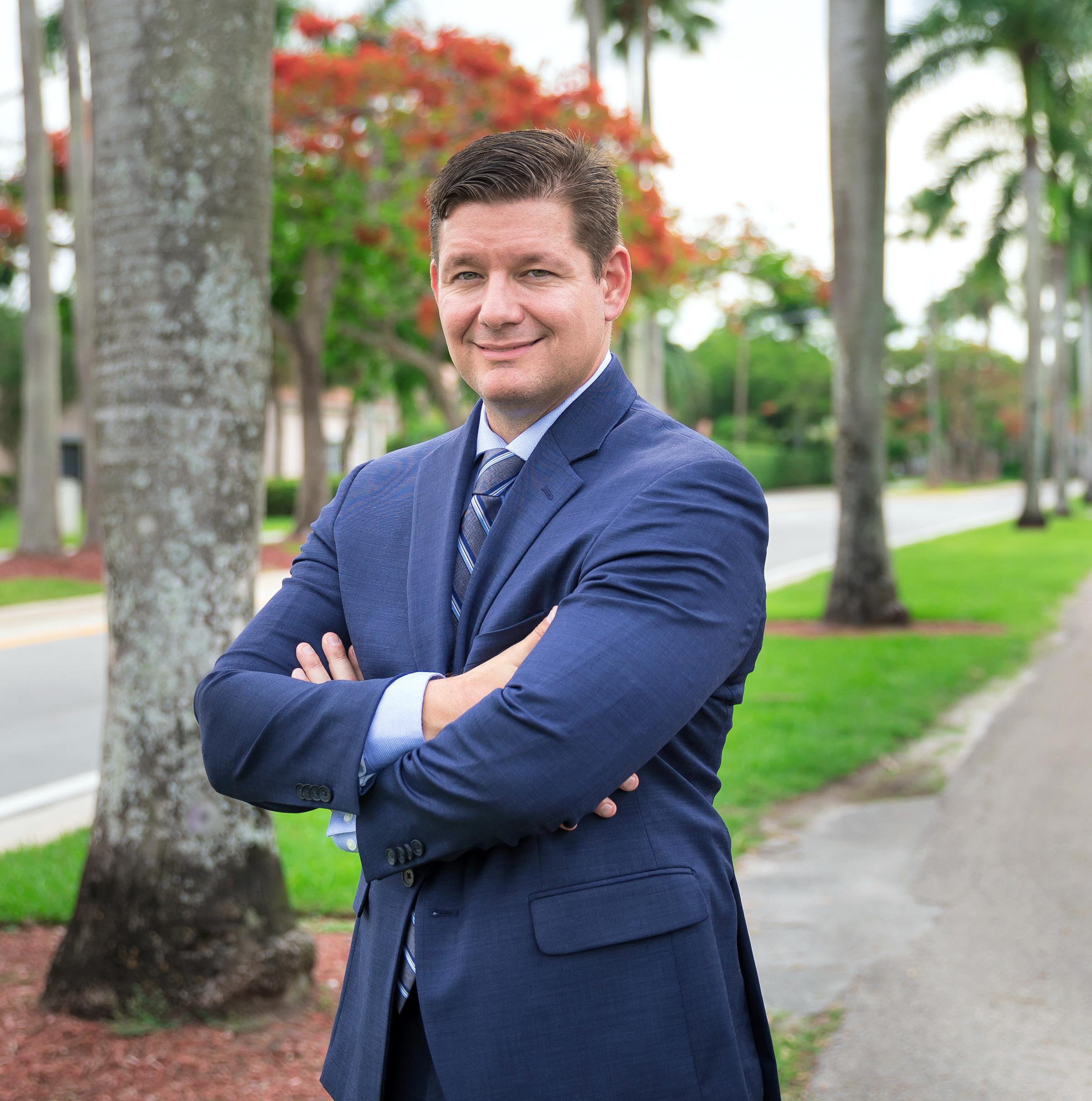 Noel Marsden
CFO
CareCloud
JulsNaranjo
Noel Marsden
CFO
CareCloud
JulsNaranjo

Through each step of his career in finance, Noel Marsden has cultivated a diverse skill set and leadership expertise
By LIOR PHILLIPSSome professionals make it to the top of their field after decades of intense focus and micro-specialization. These are the kind of people who knew they wanted to work in technology or human resources from the moment they stepped into the workforce—or sometimes earlier—and focused deeper and deeper. Though he’s built an esteemed career in finance, Noel Marsden isn’t that type of professional. Instead, his background is in computer engineering; Marsden even started a consulting company to help get through graduate school and pay bills.
“But I never finished my master’s in electrical engineering,” he says. “I realized that I really enjoyed the broader responsibility and experience that came with being an entrepreneur and business owner.” Marsden did eventually earn his graduate degree, taking on an MBA focused in finance and operations that has led to a wide scope of impact, a diverse skill set, and leadership experience.
Though that initial consulting company, IO Solutions, proved a successful venture, Marsden was ready to move onto the next challenge a few years after its founding. During his time in graduate school at Purdue, he was invited to participate in the school’s Innovation Realization lab, an experience that showcased for Marsden the connections between the technology and business worlds.
“Purdue had a portfolio of technology that academics had developed over the years, and it was just going to waste, just sitting in a file cabinet somewhere,” he explains. “The program partnered MBA students with PhD students to help the doctoral students realize the market for their technology.” Marsden had joined Purdue after starting

his own successful business and relished the opportunity to further explore his entrepreneurial strength.
In that time, Marsden worked with a company called Griffin Analytical Technologies, which had developed the miniature mass spectrometer, a tool used for chemical detection. While some spectrometers were the size of a room, Griffin’s could fit in a suitcase, and the technological advancement led to rapid growth. “I helped them with their initial financial model and direction,” Marsden explains. “And I’m proud to say that they still exist today in the Purdue Research Park as part of FLIR Systems, the global leader in detection technology.”
Once he completed grad school, Marsden began as a finance intern at Aearo Technologies, a leading safety product manufacturer. After a short time in the office, he had already automated himself out of work, using his technology background to automate board materials and the like. Not long later, he was offered a full-time position. During six years at the company, Marsden rose in the department and gained a lot of exposure to the business’s needs, eventually becoming its treasurer.
Marsden’s next step moved from the private sector to becoming a public sector treasurer, joining Brightpoint in 2006. The Indianapolis, Indiana-based organization squarely focused on global wireless distribution. After Brightpoint was acquired by Ingram Micro, Marsden decided it was time to find a new challenge after seven years of increasing integration into the organization’s many functions. After a brief stop in healthcare at Syneos Health Clinical Solutions, formerly INC Research, Marsden found a new home at Brightstar Corporation.
In that time, Marsden reaffirmed his commitment to making himself into a wellrounded professional. “I’ve always wanted
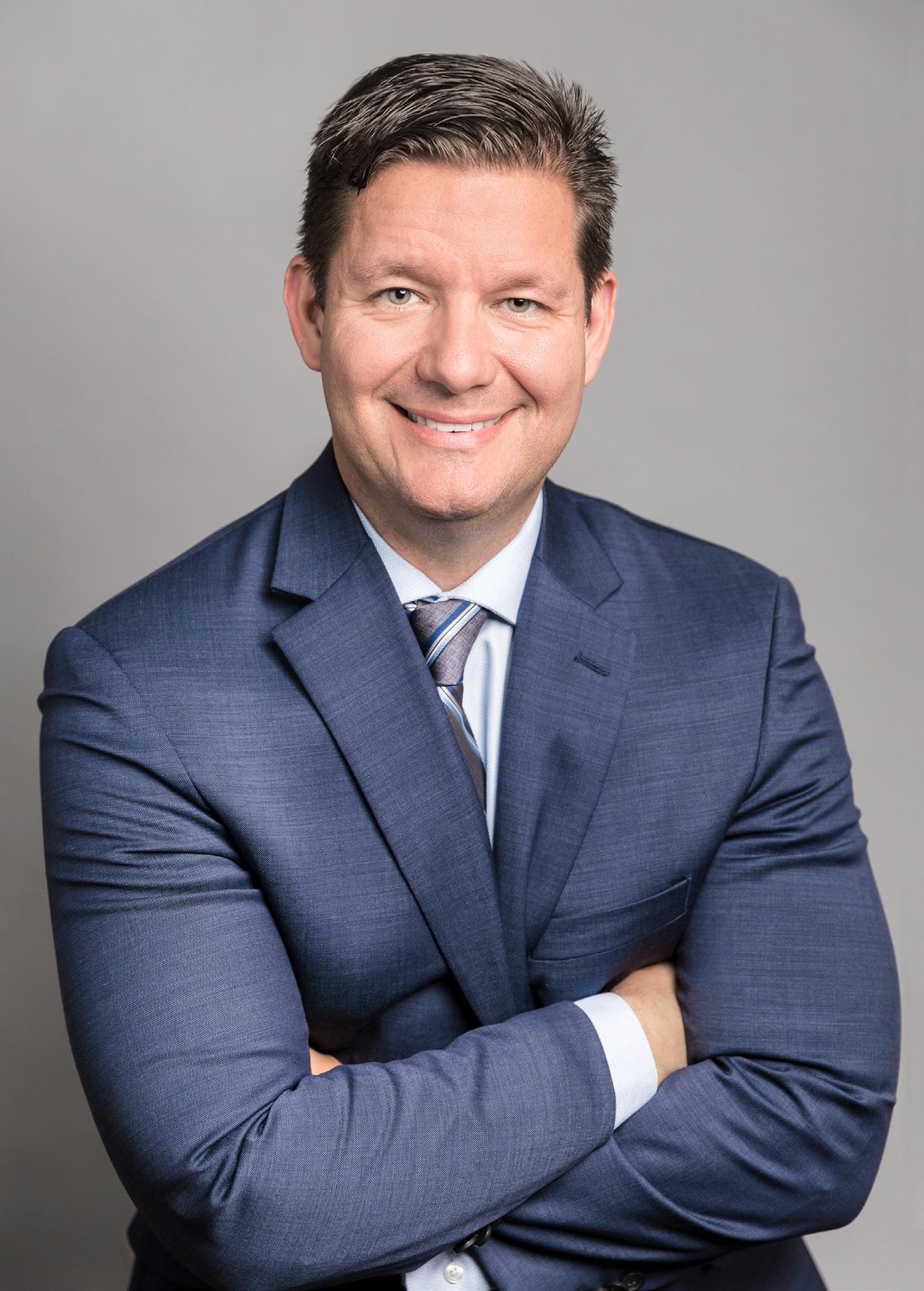
to be the guy outside the boss’s office who would absorb whatever it was that needed to be done,” he says.
Because of that willingness to tackle any challenge, Marsden was running not only global treasury but also global credit, financial relationships with key OEM’s as well as serving as the head of finance for a majority of the company’s wireless service offerings such as handset insurance and affordability solutions. “You need to be able to continuously improve your ability to do your core job so that you have free time,” Marsden advises. “Then use that time to fill in with additional opportunities that can help the company and help you grow your skills and abilities.”
“Noel is a respected leader who brings valuable insight and expertise to any role,” says Ed Chonko, PNC Business Credit relationship manager. “He played a significant part in building the long-term relationship PNC has enjoyed with Brightstar.”
The one thing that united his ability to excel in those myriad fields, Marsden found, came to him in his time as a young entrepreneur: leadership. “The most important thing is to learn how to lead people,” he says. “Leading isn’t something you learn in a book. It’s about exploring what each and every person needs and working toward their development.”
For some that could be career advancement or a raise, and for others it could mean a positive work/life balance and the ability to
leave early for a piano recital or t-ball game. “Every person has their own needs, and to treat them as anything less than a person is really disingenuous,” Marsden says.
Once they learn that lesson, leaders work every day with the ability to see the individual perspectives of each of their team members. They can operate with the perspective needed to get the day-to-day done and to envision the big picture. Most importantly, that big picture can only come through the efforts across all of the organization’s functions.
In May 2019, Marsden began a new tenure as CFO at CareCloud, a technology platform provider for high-growth medical groups. “It’s all about breaking down barriers, encouraging my team to work with other teams,” he says. “It can be as simple as walking around the building to stop in and talk to people, connecting dots to help solve problems. You can become very valuable if you can identify all these things, and it becomes a real opportunity to drive value in the organization and acts as a real feather in the cap of your team.”
As each employee starts at CareCloud, they’re asked to share a personal motto, which will be included on the nameplate that adorns their desk. Marsden’s motto is simple, straightforward, yet inherently tied into every aspect of his work: “We rise by lifting others.” In fact, more than an essential part of his work, those five words act as a goal to rise to each and every day.
1995
Marsden graduates from the Michigan State University
1996
Marsden launches IO Solutions, a custom software applications consulting firm
2001
Marsden joins Aearo Technologies as an intern, eventually becoming treasurer
2002
Marsden earns his MBA from Purdue, focusing on finance and operations
2006
Marsden joins the public sector at Brightpoint
2013
Marsden joins large contract research organization, INC Research
2014
Marsden begins his tenure at wireless distribution and solutions company Brightstar Corp.
2019
Marsden takes his first corporate CFO position, joining privately held CareCloud
“Leading isn’t something you learn in a book. It’s about exploring what each and every person needs and working toward their development.”
NOEL MARSDENNOEL MARSDEN’S CAREER TIMELINE

When Gilead Sciences announced it was buying biotechnology company Pharmasset in 2011 for $11 billion, or roughly a third of Gilead’s then market cap, the acquisition was greeted with some skepticism. “Our stock plunged,” says Jason Okazaki, senior vice president of legal and assistant secretary at Gilead. “People didn’t understand the deal.”
Over Okazaki’s thirteen years, he’s watched the company grow, widening both its footprint and its scope. The acquisition of Pharmasset—and subsequent work to advance the molecule gained through the agreement to market and combine it with Gilead’s own novel compounds—has led to the launch of the company’s HCV franchise. The company’s four medicines offer a cure for most people with HCV.
When Okazaki joined Gilead in 2006, there were roughly two thousand employees working for the biotech company. Now, there are more than eleven thousand. In that time, Okazaki’s roles have evolved and expanded. While that has included an exponential amount of growth, the SVP says he’s proud that his core team of dedicated attorneys and legal specialists has remained largely unchanged.
“We have a talented core team that has been here for a long time,” Okazaki says. “That group is essential to maintain our innovative culture, especially since we’ve grown so quickly. It’s important to have a number of
 Jason Okazaki SVP of Legal and Assistant Secretary Gilead Sciences
Jason Okazaki SVP of Legal and Assistant Secretary Gilead Sciences
people who joined when we were a smaller company and have successfully evolved in their roles as our challenges and scale continue to grow.”
In a continuous effort to provide its lifesaving medicines to people in need across the globe, Gilead has grown significantly over the years in number and geography— opening offices in Latin America and Asia. To help support this growth, Okazaki’s legal team is around seventy people spread across four continents. Gilead’s expanding global presence has been important in ensuring compliance with the European General Data Protection Regulation (GDPR) as well as similar legislation in Asia and Latin America. “Data privacy is a significant issue for any multinational organization, and it’s essential to make sure that we take a truly global view towards privacy,” Okazaki says.
In his previous work, Okazaki spent a significant amount of time on transactions involving life sciences companies, so he says Gilead’s expansion has proven a perfect fit for his skill set and interests. “The ability to actually have an impact on the human level is so different than the work you do at most companies,” Okazaki says. “This company is driven by science and truly puts patients first, reaching more than twelve million HIV and HCV patients in the developing world alone, including Sub-Saharan Africa, through our Access Program,” which the lawyer says heightens his dedication to ensuring his legal team is viewed as an essential business partner.
Transactions have certainly been the name of the game for Gilead as of late. “We did approximately twenty-five deals last year, and this year we hope to do more,” Okazaki says. “As a company, we’re trying to find every angle we can to provide the most innovative and effective treatments
to patients in our core therapeutic areas.” Last year, the corporate development team focused on investing in, and partnering with, smaller companies that Okazaki said will help Gilead continue to widen its reach and keep the company on the cutting edge of technology.
That focus is exemplified by the 2017 acquisition of Kite Pharma through which Gilead became a leader in engineered T-cell therapy. Kite’s remarkable technology uses patients’ own immune systems to fight cancer. Shortly after the acquisition, the company’s first CAR T therapy, Yescarta, was approved for treatment of certain large B-cell lymphomas. Kite also has another CART drug in the pipeline, KTE-X19, which may be effective in treating adults with relapsed or refractory acute lymphoblastic leukemia. “The fact that we’re in a leadership position in this nascent field is incredibly interesting to me,” Okazaki says.
Okazaki and his team are especially invested in Gilead’s dedication not just to treating diseases, but curing them. “With our successful development of curative therapies for hepatitis C, we’re now focused on doing the same for other diseases such as HIV and hepatitis B,” he says. “We have a high bar for innovation here and cure is the ultimate goal.”
As Gilead continues to grow, Okazaki says he’s continually inspired by his team’s willingness to take on new roles and responsibilities. “I want to make sure we’re retaining and developing our people, not only in the US, but globally,” Okazaki says.
The SVP knows something about operating globally, having stepped foot on every continent, including Antarctica twice. “Evolution here continues to create new challenges and opportunities that will keep our roles very interesting on a worldwide basis.”
“We have a high bar for innovation here, and cure is the ultimate goal.”
JASON OKAZAKI
For a long time, Sahil Bloom thought he was going to be a professional baseball player. Growing up just outside Boston, the son of a Harvard professor father and entrepreneur mother, Bloom’s biggest passion was baseball—so much so that he pitched his way into a baseball scholarship to Stanford University. Now, he plays a much more highstakes game as a vice president of private equity firm Altamont Capital Partners, applying lessons he learned from his time on the field to his growth and development efforts. Bloom played for the Stanford Cardinal for four years while getting his undergraduate degree in economics and sociology. He also cultivated a number of mentors during his time at Stanford, including Condoleezza Rice, who served as his academic advisor. “Learning from her in an intimate setting was a unique and incredible experience,” he says.
After earning his bachelor’s degree, however, Bloom felt slightly unmoored. “To use a cliché, I didn’t really know what I wanted to do with my life,” he says. So, he stayed around as a graduate assistant coach for the Cardinal while he studied for his master’s degree in public policy. Still unsure of his next steps, he was connected by a mentor with Altamont founder Jesse Rogers, who was doing some innovative hiring at his new firm.
“Most funds hire investment bankers and consultants with two-plus years of experience, but Altamont reached down further to hire at the analyst level straight out of school,” Bloom says. Soon, he was one of three in the first class of analysts, joining the firm in 2014.
“I had no idea what I was doing, to be honest,” Bloom laughs about his first days at Altamont. But he quickly learned the most effective way to make himself useful: find the one thing his boss hates doing and take it off his or her plate. “Early on, and even sometimes today, I really felt like an impostor,” Bloom said. “That helped me focus on improving each and every day and consistently building my value to the firm.” This focus helped him advance to associate in 2016, and all the way to vice president by 2018.
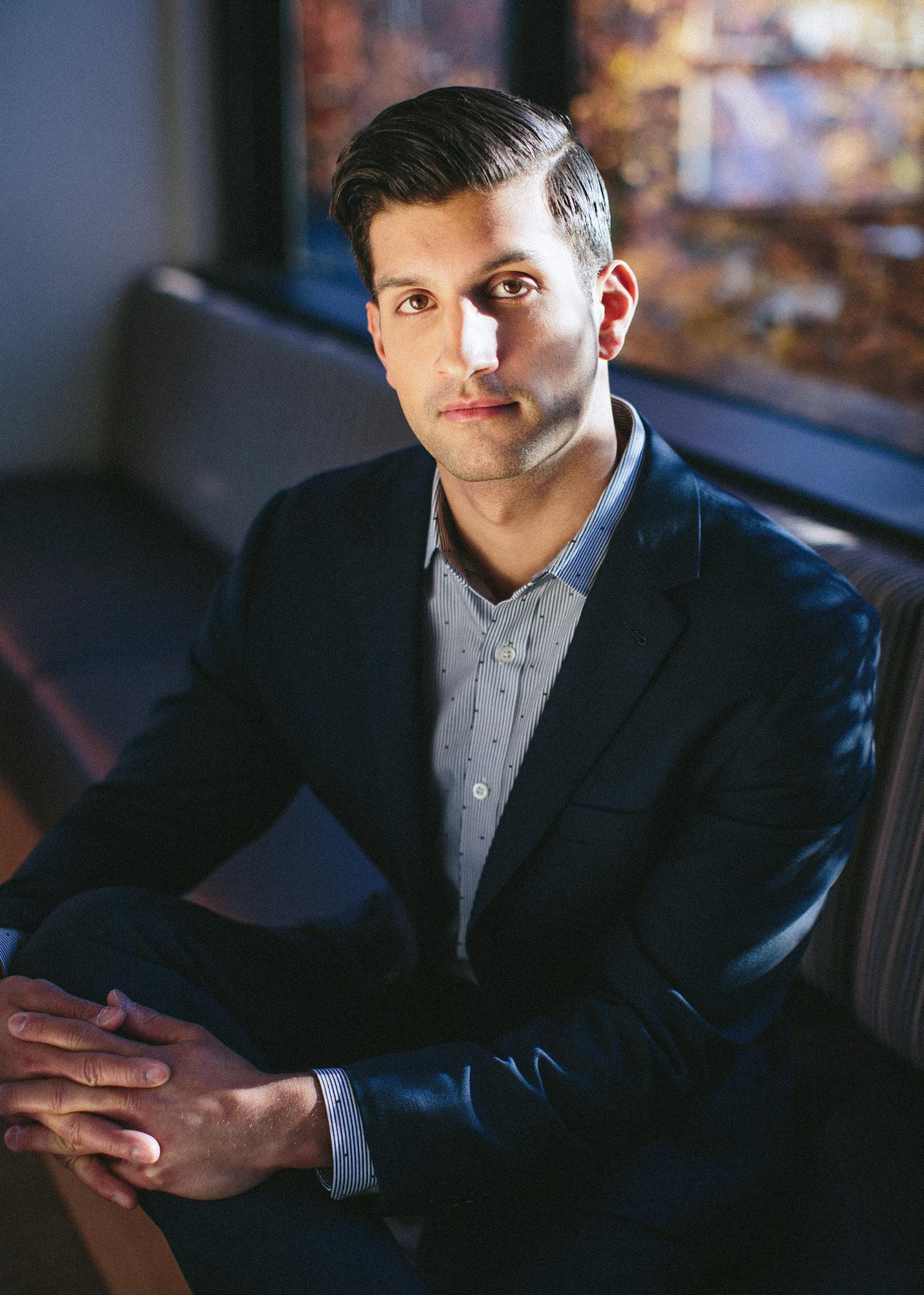 Sahil Bloom
Vice President Altamont Capital Partners
Sahil Bloom
Vice President Altamont Capital Partners
At Altamont, Bloom places a major focus on finding and executing the best deals possible. “We’re the stewards of capital for our investors,” he says. “It’s our job to invest capital and generate great returns for them.” Part of this involves pounding the pavement to meet founders and management teams, talking to them about the value of partnering with Altamont for their next phase of growth.
A major part of Bloom’s drive and success can be attributed to his growth mindset, which he feels is fundamental to success. “When you stop growing, you start dying,” he remarks. He sees every interaction as an opportunity to learn and grow; the most successful people, he says, are present in every single interaction. “My goal is to never let my childlike curiosity fade,” Bloom says.
While his days of college baseball are over, Bloom still leans on valuable lessons learned from the sport to inform his growth mind-set and his work at Altamont. Not only does it help him interact with and lead a wide array of personalities, his time on the mound also forged a competitive spirit that he feels can only be learned in the sports world.
“How do you perform when the lights come on?” he asks. “If you come in with bases loaded and two outs in the ninth inning, how do you respond?”
Whether closing out a game or navigating bold new trends in private equity, Bloom uses that baseball-honed focus and his growth mind-set to keep his firm and his career going strong.
Sahil Bloom is an avid reader, reading sixty to seventy books a year and sending out a monthly newsletter outlining his recent reads to over one thousand followers. Here are three books Bloom recommends:
Barbarians at the Gate: The Fall of RJR Nabisco (1989) by
Bryan Burrough and John HelyarBloom cites this account of the infamous Nabisco takeover as a vital text for developing an understanding of the world of high finance and private equity.
Factfulness: Ten Reasons We’re Wrong About the World (2018)
by Hans Rosling“It really makes the case for optimism in today’s world,” Bloom says.
When Breath Becomes Air (2016)
by Paul KalanithiThe memoir of a Stanford neurosurgeon with terminal cancer, who wrote it in his last few years of life.
NEOU is a livestreaming and on-demand video digital fitness platform and marketplace that gives consumers the gift of choice by housing all of the best fitness and wellness brands in one marketplace. Consumers can workout with whomever they want, with whatever equipment they have, at any time and location by downloading the app for $7.99 a month / $79.99 for the year by visiting neoufitness.com.
“Sahil has that rare ability to deftly manage both the business and human aspects of every transaction. He creates true believers of each stakeholder. We are always inspired by Sahil’s high expectations of us—and of himself—on every deal, and we look forward to supporting him as he continues to transform the industry.”

–Chau Le, Partner
Ropes& Gray LLP
“We’re the stewards of capital for our investors. It’s our job to invest capital and generate great returns for them.”
SAHIL BLOOM
LLeading companies through transformational change is Ekta Vyas’s calling.
“Throughout my career, I’ve joined organizations at a time of profound change, when they’ve needed a program to be rebuilt, or when their team was not optimally functioning,” says Vyas, who is the human resources director at Stanford Children’s Health.
The work of managing big company shifts resonates deeply with Vyas, who calls herself a scholar-practitioner with a deep need for continuous learning. She believes change management can’t happen successfully with a one-size-fits-all model and begins each project with a period of research.
“Every transformation I’ve led has needed something different,” said Vyas, who earned her terminal master’s degree in industrial
and organizational psychology and doctorate in organization and management. The topic of her PhD research focused on the relationship between leaders’ emotional intelligence and staff work engagement during transformational change.
“At the outset of each project, you have to look into who has done something similar before,” she explains. “Why did they fail? Why did they succeed? You may not be able to immediately translate that knowledge to the situation at hand, but you can learn a lot from other people’s failures and successes.”
At Stanford Children’s Health, Vyas has navigated numerous strategic initiatives. Most recently, she joined the Stanford Medicine Diversity Cabinet, representing the pediatric hospital of Stanford Medicine, and is assessing
the organization’s current state of diversity and inclusion to inform a strategy and program that addresses the identified gaps.
Talk to Vyas for any length of time, and her appreciation for the power and value of technology in the workplace becomes evident—it has played a starring role in most of the change she has undertaken at Stanford. She has led lean process improvements and technology implementations, including building recruitment infrastructure and workforce analytics functions from scratch. “Being an industrial/organizational psychologist, I’m driven by evidence-based management. Data analytics gives us insight into our workforce and informs significant components of our strategy,” she says.
Technology also played a key role in Vyas’s work in establishing an employer brand when the expanded facility of Lucile Packard Children’s Hospital Stanford opened in December 2017, which doubled the size of Stanford’s pediatric facility. “We filled almost five hundred new positions on top of the turnovers and vacancies we manage on a continual basis,” Vyas said. “This high-volume recruiting was made possible by an all-encompassing recruitment suite we integrated with our core human resource management system.”
Her expertise and experience with HR technology led to Vyas joining the board of the International Association for Human Resource Information Management (IHRIM) in early 2019. IHRIM is the only association in the industry specifically dedicated to HR technology. Vyas oversees its educational programs, including webinars and the Human Resource Information Professional (HRIP) Certification. Just a few months after joining the board, she took on the revamp of the HRIP Certification platform and is collaborating with industry subject-matter experts in updating the program’s content.
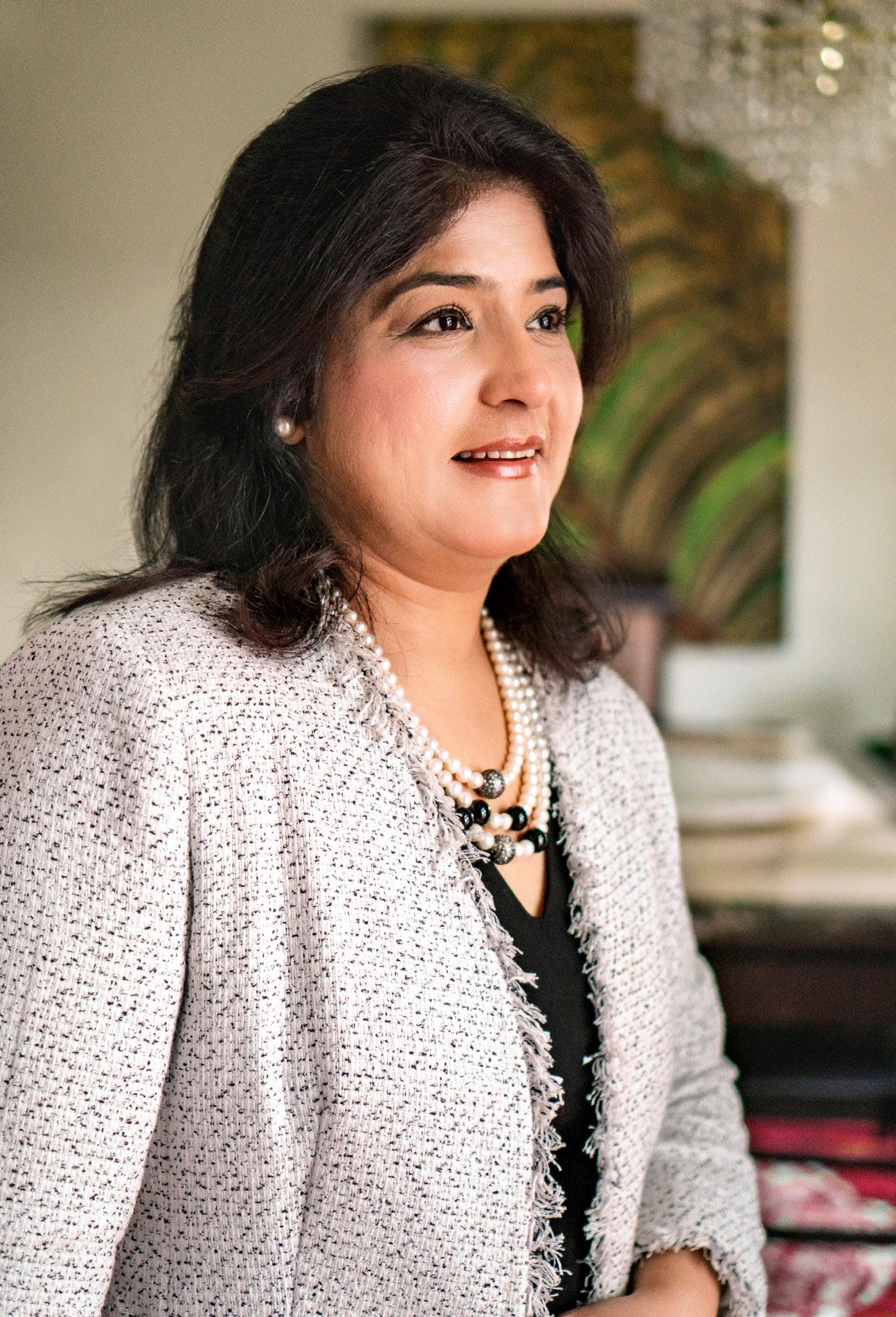 Ekta Vyas Director of Human Resources Stanford Children’s Health
Ekta Vyas Director of Human Resources Stanford Children’s Health
Vyas is molding the next generation of HR leaders as an adjunct faculty member at San Jose State University of Business. She teaches Society for Human Resource Management certification courses. “To be a teacher, first you have to be a lifelong learner; I like teaching because it encourages me to stay abreast in my field outside of my immediate work,” she says. “It’s gratifying when my students go on to becomes leaders in the field in their own right.”
The industry at large benefits from Vyas’s expertise as well. She regularly writes articles and appears at conferences, speaking on multiple HR and management topics related to HR and organizational processes and strategy. She recently spoke on a panel about HR technology at the second annual HR Tech Online Summit North America and presented a keynote on workforce planning at Human Capital Institute’s People Analytics & Workforce Planning Conference. She’s been interviewed on the Go Lean Six Sigma and PeopleScout podcasts and penned bylines in Forbes, HR People + Strategy, International Journal of Strategic Management, and other industry publications. Vyas also draws on her PhD research to lead webinars and presentations on the topic of emotional intelligence and change. One day, she hopes to publish a book.
Being involved in all this, she said, ensures that she’s exposed to the entire ecosystem of HR, not just siloed in her dayto-day work. “I’m leveraging learning with everything I do,” Vyas explains. “If I’m writing about performance management, I’m also teaching performance management. I’m speaking about employer branding because I’ve done that as a practitioner. Every activity I do reinforces another part of my career.”
She admits the balance can be difficult, but her family provides a strong support system. Vyas refers to her “three Ms” in addition to her family support: music, meditation, and movies. Ultimately, her involvement at Stanford Children’s Health, with IHRIM and San Jose State University—as well as her frequent sharing of her expertise via speaking engagements, articles and podcasts—brings credibility and fulfillment.
“You can stay in one field of expertise, but I chose to spread my wings and make myself open to learning about the whole HR ecosystem, from human resources and human behavior to organizational science,” Vyas says. “After more than a decade of that young ambitious blur of striving, I feel fulfilled and grateful for the struggles I had, because struggles shape you.”
“You can stay in one field of expertise, but I chose to spread my wings and make myself open to learning about the whole HR ecosystem, from human resources and human behavior to organizational science.”
EKTA VYAS
Jen Regas wanted to be an accountant when she was twelve years old.
“I grew up on a farm in Iowa,” recalls Regas, who is now CFO at Hallcon Corporation. “I knew I didn’t want to live there for the rest of my life. So, I said, ‘Dad, what can I do in a career where I can make money and move to a big city?’ And my dad said, ‘You know, I pay my accounting firm a lot of money every month.’ And I thought to myself, ‘I could do that job. I could be an accountant.’”
From that moment on, Regas devoted herself to the profession, enrolling in business classes and completing internships at local accounting firms while in high school and obtaining a position in the accounts payable office in college. “I have a very strategic, focused personality,” Regas explains. “I’m very much a planner.”
Following her graduation from the University of Northern Iowa, she quickly realized the value of cultivating a team-focused business strategy as she landed senior positions at Deloitte, SPX Corporation, and AMC Theatres. “I developed a passion in buying and selling companies,” says Regas, who is one of the Kansas City Business Journal’s 2019 CFO of the Year honorees. “I know how to turn one dollar into five dollars, very quickly. I have growth targets of ten and twenty percent, whereas other companies may only grow three percent a year. I’m successful in achieving those targets, and in my role as CFO, because I build teams that get behind
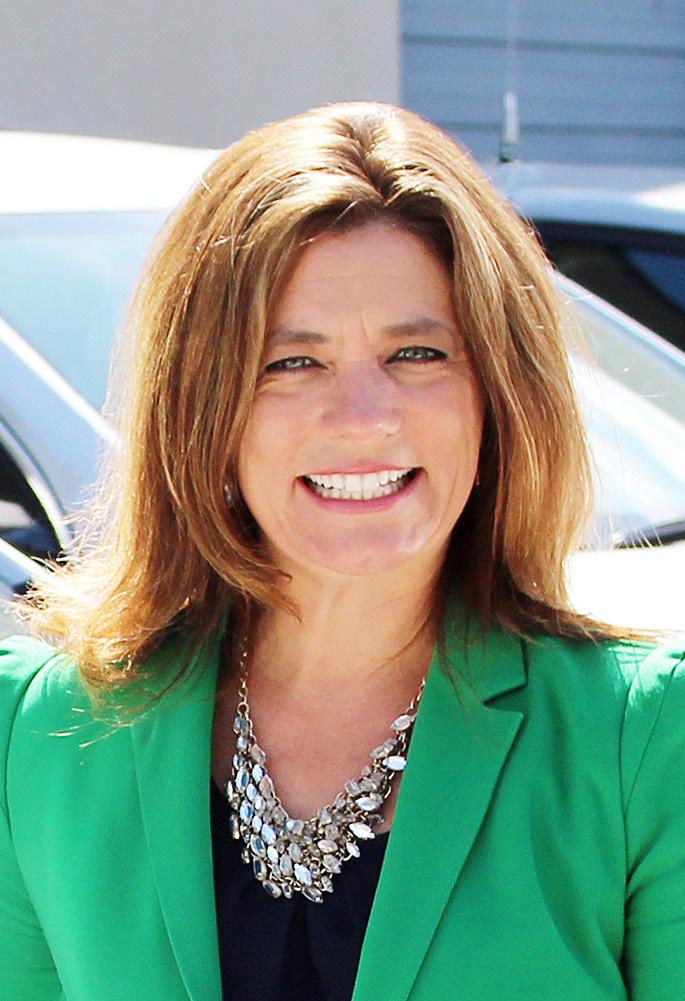
my department vision. If I get the right players behind me, we execute much faster than an individual contributor.”
Regas’s team-focused strategy centers on making people feel as though they are part of each and every one of her efforts. Each time she joins a company, she makes a point of holding quarterly meetings attended by everyone, all the way from vice presidents down to data entry workers. Those meetings are a chance to inform people about her goals and recognize high-performing team members through “bravo moments,” but they’re also an opportunity for Regas to hear others’ ideas on improving company processes.
“That’s how I get buy-in, and how I get it so quickly,” Regas says. “I do it by bringing people into the think tank. How are we going to work together? What do people need to be more engaged, or productive? Maybe people need greater flexibility, or more bravo moments, or a bigger computer screen. There’s a great deal of diversity in what people care about, and I’ve had to change my approach to fit the differences in what people want and what I think they might need.”
Today, Regas has found a perfect match for her strategic personality and team-based mentality in Hallcon Corporation. Hallcon is number one in safety, Regas says, because everyone is on the same page in their mission to enhance the lives of people on the move. “We believe in our mission,” Regas notes. “The executive teams believe it, and it filters down into our culture so that we keep safety in mind at all times.”
Jen Regas CFOAs the CFO, Regas has capitalized on her team-building skills by developing initiatives that integrate reports from people all across the company, including safety managers, payroll, risk management representatives, and members of the claims department. One of those initiatives was building a mobile learning app. “We have people working all across the United States and Canada, so they don’t come into an office—their office is a car,” Regas explains. “We had to be able to touch all those employees, and my team has built a best-inclass, cloud-based safety program that helps all Hallcon employees learn what to do when they encounter various safety distractions.”
Creating this type of streamlined, highly efficient program is an integral component of her responsibilities as CFO of Hallcon. “I came in knowing that my job was to grow the
company through acquisition and organic growth,” she says. “But that so often comes down to creating better processes and making sure that people don’t have to waste time on unnecessary manual work. When I first come into a company, I look at the numbers, but I also look at the processes because it’s the processes that produce the numbers.”
Under Regas’s leadership, Hallcon’s processes have certainly improved. In April, the company rolled out a comprehensive HR solution that allows everyone to see the same information and communicate with other teams within a single system. “It was a lot of work, implementing an HR system for over five thousand people,” Regas acknowledges. “But it was worth it.”
Editor’s Note: At press time, Jen Regas was no longer with Hallcon.
Jen Regas knows what it takes to be an exemplary and dynamic leader. She’s built her incredible career on a strong financial foundation, but it is her understanding of and appreciation for what it takes to run the other areas of a company that truly sets her apart. Congratulations on this prestigious recognition.
bmoharris.com/ treasuryandpayments
“I build teams that get behind my department vision. If I get the right players behind me, we execute much faster than an individual contributor.”
JEN REGAS
Florida Crystals’ Christine Vanderpool has built a cutting-edge cybersecurity program as well as a successful career as an IT business partner—and she’s still going strong
By SARA DEETERCChristine Vanderpool is a builder. Whether it’s people, programs, or her own career, she loves to develop and create. As vice president and chief information security officer at Florida Crystals, Vanderpool has put that talent to good use by building the company’s firstever cybersecurity program.
According to Vanderpool, many people might think it unnecessary for a sugar company like Florida Crystals to have an IT cybersecurity program. But that is a dangerous misconception, she explains. “It doesn’t matter what industry you’re in. We’re all going to be targeted, and we’re going to face some of the same attacks,” Vanderpool says. “It’s often the smaller organizations, or the ones that don’t have strong cybersecurity teams, that lose out. They’re still going to be targeted, because they’re making money. But they don’t have the tools or resources to protect themselves.”
With the support of the company’s chief information officer, who understood the importance of having an executive in a cybersecurity role, Vanderpool strategized, planned, and implemented the program in just nine months. But the speed of her execution isn’t what Vanderpool is most proud of.

When she joined Florida Crystals as VP and CISO, Vanderpool knew that she wanted to focus on the program’s efficiency. The key to being an effective IT business partner, she believes, is achieving IT goals while keeping in mind the broader financial and strategic picture.
“As soon as I came in, I started asking, ‘How much are we spending? What are we spending it on? What does that mean from the licensing perspective?’” she recalls. “I didn’t want to go to the board and ask for all kinds of money; I wanted to show that a program like the IT security program can be implemented within the existing budget, just by changing some things around.”
Christine Vanderpool VP and Chief Information Security Officer Florida CrystalsTo Vanderpool’s mind, however, efficiency extends beyond just a department’s budget. As she sees it, the operational efficiency of modern cybersecurity is often constrained by the constant influx of new IT tools and services. In that sort of environment, Vanderpool says, an IT tool released today becomes obsolete just one day later, so consumers are obliged to either constantly buy (and learn) new programs or stay behind the technology curve.
Vanderpool didn’t want to be beholden to that model any longer. “I wanted to be able to get a security tool, use it for however long it works, and then be able to get a new one when a better tool inevitably comes along,” she says. “I’m a huge fan of Lyft, Uber, and other companies that employ an on-demand service model. That’s really exploding right now, that idea of getting whatever you want at the moment you
need it and using it for however long you want. And I thought, ‘I can get my groceries that way, and my healthcare. Why can’t I do something similar with security?’”
In taking the initiative to build a novel, shop-from-your-phone-style IT security model, Vanderpool has lived up to her personal values as well. “I tell people to own their own development, to own their own career,” she says. “Early on, I would think to myself, ‘They’re not giving me opportunities, they’re not promoting me.’ But I’ve come to realize that we all need to drive and own our own careers.”
Vanderpool has done that by recognizing who she is and where she needs to improve. She says that skill is especially important as you advance into executive leadership. “I’m a really loud, outgoing person,” Vanderpool explains. “When I first became a CISO, my boss actually rated me
‘below expectations’—he told me I needed to be better about being calm and collected and not overreacting.
“Of course, when he told me that, I did completely overreact,” she laughs. “It was very much like the moment when you finally realize that your parents were right all along.”
At Florida Crystals, Vanderpool works with her team to create those same moments of insight and transparency. “It’s important that we feel like a collective, that we talk to each other about what’s going on and what we’re thinking. We have to support each other,” she says.
That tone is only reinforced, Vanderpool says, by the company itself. It has a family-like feel to it, due in part, Vanderpool believes, to the nature of its work. “Sugar is a product that enhances who we are,” she says. “It reminds us of those special moments when we ate birthday cake with our family or baked Christmas cookies with our mom. Sugar brings us together, and the company works on bringing people together, too. They are very big on building relationships, and that’s one of the things I most enjoy.”






“It’s often the smaller organizations, the ones that don’t have the resources available to build a strong internal cybersecurity team, that lose out.”
CHRISTINE VANDERPOOL
 By WILL GRANT
By WILL GRANT
We are not your typical transport and logistics management company. Let’s face it, any logistics company can move products and packages from Point A to Point B. What matters is the manner in which your order is taken, the attention to detail as the load is being moved, and the on-time, courteous delivery of your cargo. It’s our employees who make the difference. From the receptionists to the dispatchers to the drivers…everyone knows the crucial roles they play in making Blackhawk a successful, dedicated, freight transportation services and logistics management business.
Whether you are utilizing our satellite-dispatch and tracked dry van, flatbed, step-deck, and conestoga equipped trucking operations, or the state of the art brokerage services of our Logistics division, we invite you to experience the Blackhawk difference today and let us be your dedicated transportation services provider.

As senior vice president of supply chain and operations at Neiman Marcus, Willis Weirich is always looking for new ways that supply chain might be able to support the broader needs of the business. The SVP has spent the past three-and-a-half years at the Dallas-headquartered luxury department store chain, building on successful tenures at Target and Airgas, respectively. Weirich’s most enduring trait is a capability for achieving success in varied conditions and environments, and in working to improve the talent on his team and maintain on growing company culture, he’s helping Neiman Marcus double-down its focus on supply chain as a more prevalent component to business strategy.
Weirich told the American Journal of Transportation (AJOT) that for its segment in the market, there haven’t been nearly as many advances in automation and technology solutions as compared to other flat-pack types of products, a potential hang-up for the garments-on-hanger needs of Neiman Marcus. “Obviously, garments on hanger is a smaller segment and a little unique to the luxury space in terms of how you package and move the goods through the supply chain,” Weirich told AJOT. “If you step away from luxury, the desire in this day and age to create the try-iton-and-return-it experience puts additional pressure on the supply chain.”
He says that it’s not necessarily the delivery method that needs to evolve, but supply chain’s focus on execution. “I always say averages don’t work well in our business model,” Weirich shares with the journal. “When you focus on averages, you end up seeing opportunities in the periphery that don’t resonate with customers.” Focusing on execution and agility not only allows a wise balance of investment, Weirich says, but also an ability to evolve as the market adjusts.
Maintaining a team that is able to provide excellence in execution as well as an
ability to be nimble has been no easy task. Weirich is very proud of his own team and believes they complement each other perfectly. The SVP says talent in the right culture is absolutely crucial to being able to advance business objectives.
Creating culture is also always easier said than done. For Weirich, it means trying to create an environment where making mistakes isn’t always grounds for being read the riot act. In fact, he believes there are times it calls for reward. The SVP encourages his team to try new things while also working to encourage them to take ownership and accountability for their own leadership.
While encouraging his own teammates to grow and develop, Weirich says he continues to pursue his own personal leadership development. “I still enjoy reading about other industries and finding correlations,” the SVP tells AJOT. “I have a passion for continual learning.”
Looking at his career from a more holistic view, Weirich tells AJOT that his journey has been about creating the longest runway possible, not getting down it the quickest. “As a result, I think I’ve learned a lot along the way, and it makes me a better problem-solver and leader.”
“Neiman Marcus has truly reinvented the shopping experience for the luxury customer by complementing the awesome in-store experience with a premier online platform. Willis and his team are completely committed to the disruptive technologies, new ideas, and people engagement necessary to provide the Supply Chain Solutions needed to surpass customer expectations. Congratulations to Willis Weirich!” Mike
Holloway, President and CEO, Blackhawk Transport Inc.Congratulations to Willis Weirich on this welldeserved honor. Johnson Stephens Consulting’s strong partnership with Neiman Marcus is focused upon ensuring supply chain excellence to attain the highest service levels for customers. Johnson Stephens Consulting is a leading supply chain operations consultancy servicing digital e-commerce, retail, wholesale, consumer, and B2B clients.
800-322-9492
www.blackhawktransport.com
Until coming to Barnes & Noble Education (BNED) two years ago, Michael Miller was the lawyer that you called if your business was in trouble. From the first month of his first in-house role at then Symbol Technologies, Miller has perfected the art of helping companies whose industries were in periods of significant change while the business itself was equally, if not more so, in a state of flux.
BNED is the first long-haul job where Miller hasn’t needed to show up with a cape on. “Fortunately, this time there weren’t any regulatory or legal enforcement issues to attend to immediately, but I’m certainly here to help position the company to make way for significant growth,” Miller says.
As the operator of bookstores, both physical and online, BNED is a partner to more than 1,400 institutions in its retail operations, but it’s the company’s doubling down on its direct-to-student business that is helping pave the way for BNED’s future in a radically shifting business.
While BNED wasn’t in need of a “fixer,” Miller’s coming to the company makes perfect sense. Miller professionally grew up in turmoil and learned the value of executive partnership almost immediately. In his first month at Symbol Technologies (subsequently acquired by Motorola), the enactment of the 2002 Sarbanes-Oxley Act coincided with a multiyear financial restatement that also courted the involvement of the Department of Justice.
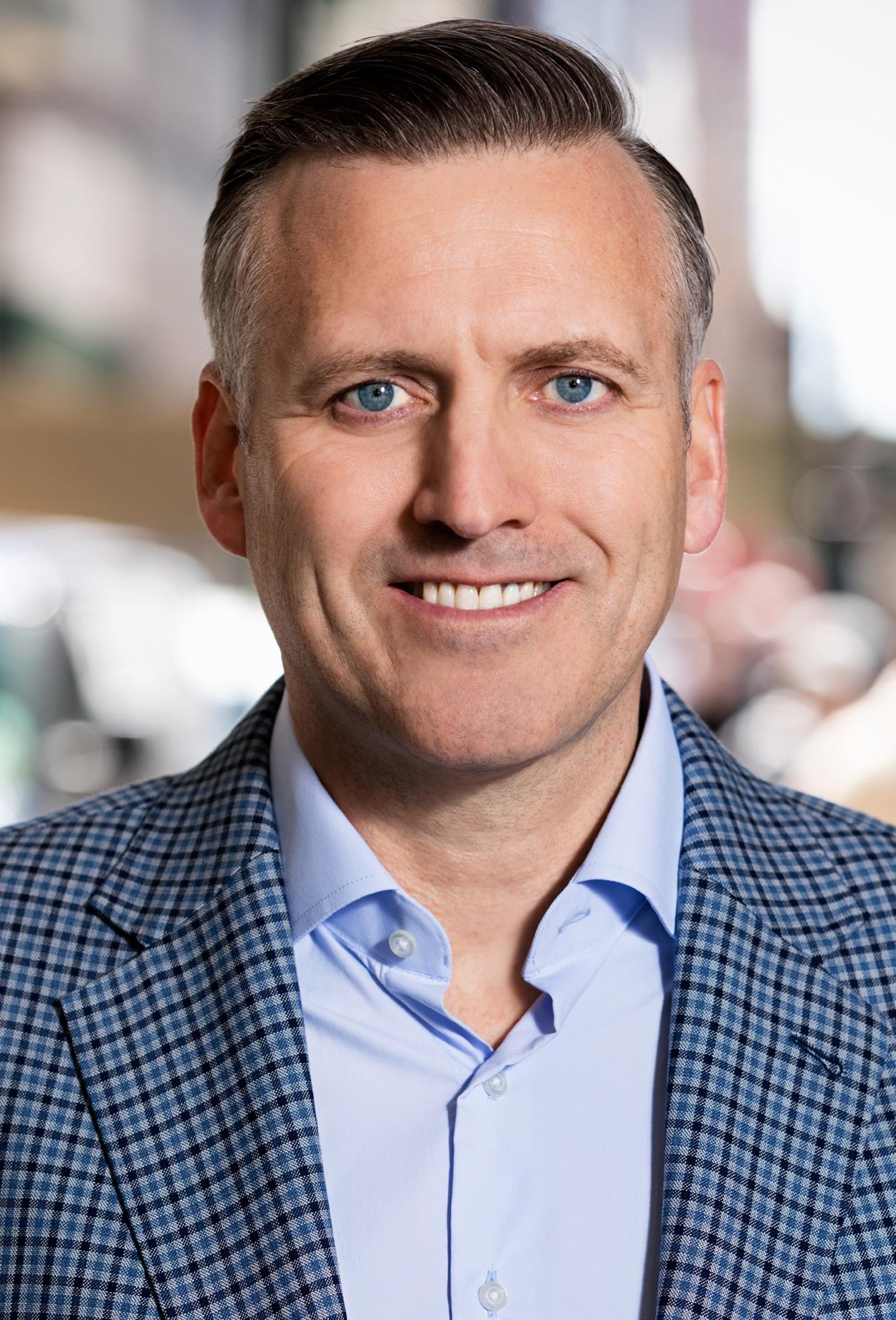
“I was thrust into a situation as a newly minted in-house lawyer where I was dealing with pretty sizable issues for a public company and dealing with seasoned executives I had just met,” Miller says. “Because I was the only lawyer in the legal department who had any public company and SEC experience, I was immediately dealing with the C-suite as well as the board.”
After Symbol Technologies’ sale to Motorola, a transaction where Miller acted as one of the lead negotiators, the lawyer later spent nine years at Monster.com, where he helped the fragmented multinational
Michael Miller EVP of Corporate Strategy and General Counsel Barnes & Noble Educationcompany with operations in fifty-four countries transform into a centralized and functional organization. And that wasn’t the only challenge. “Monster had been the poster child for options backdating and the ensuing scandal,” Miller says. “When I arrived, it was clear that Monster needed to transform and distance itself from that part of its storied history as one of the original dot-com companies. My role was to come in to help the executive team clean up, stabilize, and position the company to go forward in a dynamic employment market.”
Miller’s pedigree for helping propel companies ahead despite operating in drastically shifting industries was certainly a selling point for the company. “When BNED spun off from Barnes & Noble Inc. a few years ago, while it was a new public company, the underlying college bookstore business was a well-established company not accustomed to being in the public limelight,” Miller says. “I think I was a welcome addition in that regard because I had so much experience partnering with executive teams to position for more growth while operating as a publicly traded company.”
Since joining, Miller has been appointed to the newly created role of executive vice president of corporate strategy, in addition to his legal responsibilities. In this role, Miller has been tasked with documenting BNED’s corporate strategy and ensuring that the execution of its business initiatives align and reinforce the mission to support students, faculty, and schools, serving as a catalyst to
meet the evolving needs of the education system and a new generation of students.

Now that BNED is composed of three distinct but complementary businesses, the corporate strategy portion of his role has enabled Miller to have a broader view and influence upon the execution of BNED’s business plan.
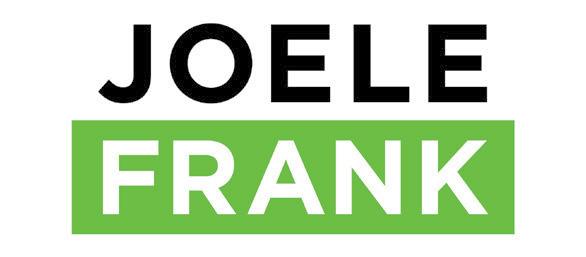


Miller says that, while evolving BNED’s bedrock retail business has been a priority, the company is pivoting the business on where the future of the growth of the company lives. By and large, that is BNED’s Digital Student Solutions business. “Our goals are accessibility, affordability, student success,” Miller says. “We’ve built a student success platform and are now growing daily in our direct-to-student digital solutions.”
Its new digital platform, Bartleby, is a subscription service that bundles stepby-step textbook solutions and experts available to help with homework questions. Miller says the service includes studying, writing, and tutoring aids that will be giving other players in the space a run for their money. “The biggest difference between us and our competitors is our direct nexus to the student,” Miller says. “We have a footprint that is pretty hard to compete with, so not only do we have a better product, but we can leverage our footprint in marketing and gaining subscribers for our service.”
With the rise and focus on inclusive access—the theory that a student should
We are proud to congratulate our client and friend Michael Miller on his outstanding achievements.
“Our goals are accessibility, affordability, student success. We’ve built a student success platform and are now growing daily in our direct-to-student digital solutions.”
MICHAEL MILLER
come to their first class with all the necessary materials in-hand—BNED is wedded to the idea, literally naming their inclusive access program BNC FirstDay. BNED also has the ability to bundle textbooks, digitally or physically, with Bartleby services in the future. This would be offered at discounted rates and, in other cases, simply built into the cost of tuition. “This is another way in which we can serve students in ways that our competitors simply can’t,” Miller says.
Miller realizes that continually putting himself in high-stakes propositions in serious-change industries isn’t for everyone. But it has offered him the capacity for growth in ways that few other experiences can.
“Being in challenging businesses has made me a better lawyer and advisor to the team and to the board,” Miller says. “You can get a job where everything is great and has been that way for twenty years, but where’s the personal and professional growth? I don’t shy away from a challenge; I thrive on it.”
BNED is composed of three distinct but intertwined business segments responsible for growing business into established and evolving markets.
1. Retail is responsible for the selling and renting of course materials and supplies, including physical and online materials and a suite of digital materials, as well as a variety of general merchandise including spirit wear, gifts, and technology.
2. Wholesale oversees sourcing and distribution of used textbooks as well as applications that provide inventory management and point-of-sale solutions to college bookstores.

We look forward to extending our partnership and wish Michael and Barnes and Noble Education continued success.
BakerHostetler has assisted Barnes & Noble Education since it became an independent public company in corporate counseling, transactions, litigation, intellectually property portfolio management, and data privacy. We are pleased to join in celebrating the accomplishments of Michael Miller, who is a leader and innovator in corporate strategy and legal affairs for BNED. BakerHostetler is one of the nation’s largest law firms, with more than 940 lawyers in offices coast to coast, distinguished by our commitment to the highest standard of client service in intellectual property, litigation, business, labor and employment, and tax law.
3. Digital Student Solutions , the most recent addition, offers directto-student products and services to assist in studying and academic enhancement. It’s where the company sees the most potential for exponential growth and evolution.
Shinjini Das advocates and creates space for her #GoGetters through interactive marketing on social media
By KC ESPERShinjini Das’s goal in life is to reach for the stars and not settle for anything less. To her, success is measured largely by enjoying the journey rather than just the end result. That’s why, in 2016, she developed the Das Media Group to empower women to be ambitious, hungry for more, and ready to take on anything—or in her own coined phrase, to be “go-getters.”
Since starting Das Media, Das has traveled around the world to inspire women to believe that no dream is too big. She’s worked with the US Department of State to empower at-risk, rural youth in Paraguay to pursue higher education; she’s helped small businesses sharpen their PR strategy; she recently spoke at her alma mater’s
commencement ceremony to encourage these future members of the workforce; and has most recently advised women entrepreneurs in Honduras to build and monetize personal brands on social media.
Her reach goes even further with the help of social media. She currently has close to two hundred thousand followers on Twitter and gains traction of five million views (and counting) per month across her accounts. In short, she’s prominent.
Her presence does more than just get her name into the world. It seeks to inspire her audience to follow a path that makes them, too, influential and impactful. And with social media, Das is able to see just how much of a difference she’s made in people’s lives.
“I wouldn’t be able to get this level of communication with my demographic without social media,” she says. “I hear about girls in Ghana who are motivated to finish law school because my advice gave them hope.
They don’t have pop-culture-centric, educated role models, and they’re constantly being told that what they have is not enough. So I’m disrupting that by telling them to use their voices to advocate for themselves, and that’s revolutionary.”
In each of her efforts to connect with her audience, Das creates a space in her subjects’ lives by rooting for them when most of her audience might not have someone. She proves how seriously she takes this connection by sending personalized video replies and voice recordings to go-getters who reach out with questions or are celebrating wins and anniversaries.
These efforts allow her to be the cheerleader or role model that her audience needs to take their careers to the next step.
Considering her audience is mostly women and girls of color, much like herself, her goal becomes even more personal and pertinent.
“Many role models we have are a lot older than us,” says the twenty-seven-year-old, dubbing Michelle Obama as one of her greatest heroines. “We look up to them, but they also don’t exist in the same career space we do, so their advice tends to come from a different space.”
Das says that unlike many older role models, though they are important, she is able to give her audience “real-time advice” about issues that are relevant to younger generations because she is experiencing the same things.
“It’s real-time mentoring because I can reflect on an issue that just happened the
day before and offer advice on how I solved it,” Das explains. “My audience actually has a greater respect for that because they see that I got through something and want to help them get through it, too. I am always real.”
Through Das Media, Das aims to reach her audience members at any stage in their life, helping them evolve as go-getters in the same capacity she does. “My age profile is all over the board because everyone is in various stages of being a go-getter,” she says. “I want to be able to reach them all with better advice and resources.”
In the coming years, Das hopes to maximize her platform even more. She’s working with her personal brand management team to release new self-help products for her audience to take advantage of—including her first
 Shinjini Das gave the Class of 2019 inaugural commencement speech at her alma mater Fulton Science Academy Private School. She encouraged the graduates to preserve their core values in their next adventures in college.
Jackson Vance
Shinjini Das gave the Class of 2019 inaugural commencement speech at her alma mater Fulton Science Academy Private School. She encouraged the graduates to preserve their core values in their next adventures in college.
Jackson Vance
memoir, written when she was twenty-six— into different media consumption formats. Other products on the docket include subscription-based motivational text messages; a podcast; a branded app; her own live, over-the-top video subscription platform; branded sponsored newsletters; and even a new merchandising line featuring “go-getter” gear and other motivational accessories. The goal is to empower her go-getters with actionable products.

Das hopes to build a full-time team, expand into her first office in Los Angeles, and grow Das Media into an entire digital media platform to broaden her reach to go-getters and, at the same time, bolster her company’s revenue with four models: B2B, B2C, D2C, and a media platform.
Das is honoring her technology consulting and digital marketing background by facilitating a B2B client consultancy that advises clients on social media marketing engagement strategies. The B2C division works with individual business owners to build out their media content strategy to market their products and services with meaning, while the D2C division works to sell Das’s products to her go-getters via social media.
Finally, Das Media will be building an original content division to fuel its growth as a standalone media platform, relying on branded content sponsorships and partnerships. In the past year, Das has hired and now manages more than fifteen global freelance team members to partner with her on
graphic design, social media marketing, and business development initiatives.
As her brand expands, Das says that her personal journey as a “go-getter” moves with it. She’s learned to use each milestone and road bump as a way to inform her audience even more. In fact, Das says she enjoys the spontaneity that comes with her interactive marketing model and that keeping this sort of flexibility makes the brand feel more real, allowing her to share the motivation her listeners need to achieve their goals and bounce back from any obstacles.
“It’s as simple as taking action to get the goal you have,” she says. “I’m helping my audience tackle motivation and all the issues that prevent us from being ‘go-getters’ so that we can be anything we aspire to be.”
“It’s as simple as getting the goal you have.”
SHINJINI DASShinjini Das signed posters of her memoir—Unapologetically, Shinjini—at her Los Angeles book tour for her go-getters to inspire them to achieve their goals.
AAxel Andre says he knows he’s not discovering new laws of nature as CFO for individual retirement at international financial giant AIG—but he’s okay with that.
“It is intellectually stimulating work,” he says. “It requires problem-solving at a high level and the decisions I make are consequential. Our individual retirement business helps millions of Americans achieve financial and retirement security, so even for a physicist, it is incredibly satisfying.”
You read that correctly. Andre did not find his way to his position at AIG through extensive financial education and a workmanlike journey from banker to C-suite. He got his PhD in physics from Harvard University and began work as a physicist before
realizing the academic and administrative work he was doing didn’t generate the same amount of excitement he got while studying. He says he was hungry for a more diverse experience and a broader group of people with whom to connect.
“I was looking to do work that would have a more direct impact and be part of a dynamic environment,” he recalls. “I then found out that a lot of physicists ultimately look at quantitative finance as a career.”
And why not?
“The math involved in finance is quite similar to nineteenth-century physics,” Andre notes.
So, in January 2006, Andre joined Goldman Sachs as an associate, advising
Trained physicist Axel Andre on working in a dynamic and consistently inconsistent environment as the CFO for global financial powerhouse AIG’s individual retirement business
insurance companies on matters such as risk management, capital management, and the various types of annuities. He says he gravitated to thought leadership, partnering with sales associates, bankers, and clients (the physicist’s parallel would be “experimentalists”), working to solve problems and explain complex concepts in the simplest way possible. He found himself in a variety of boardrooms, working closely with Fortune 500 CFOs and various executives and found that all his training perfectly suited him to these interactions.
Andre worked his way up to managing director at Goldman Sachs before making the move in 2013 to AIG, which employs more than 56,000 people throughout more than 80 countries and has jurisdictions around the world. He became senior managing director— as well as chief risk officer—before ascending to the role of business unit CFO in 2017.
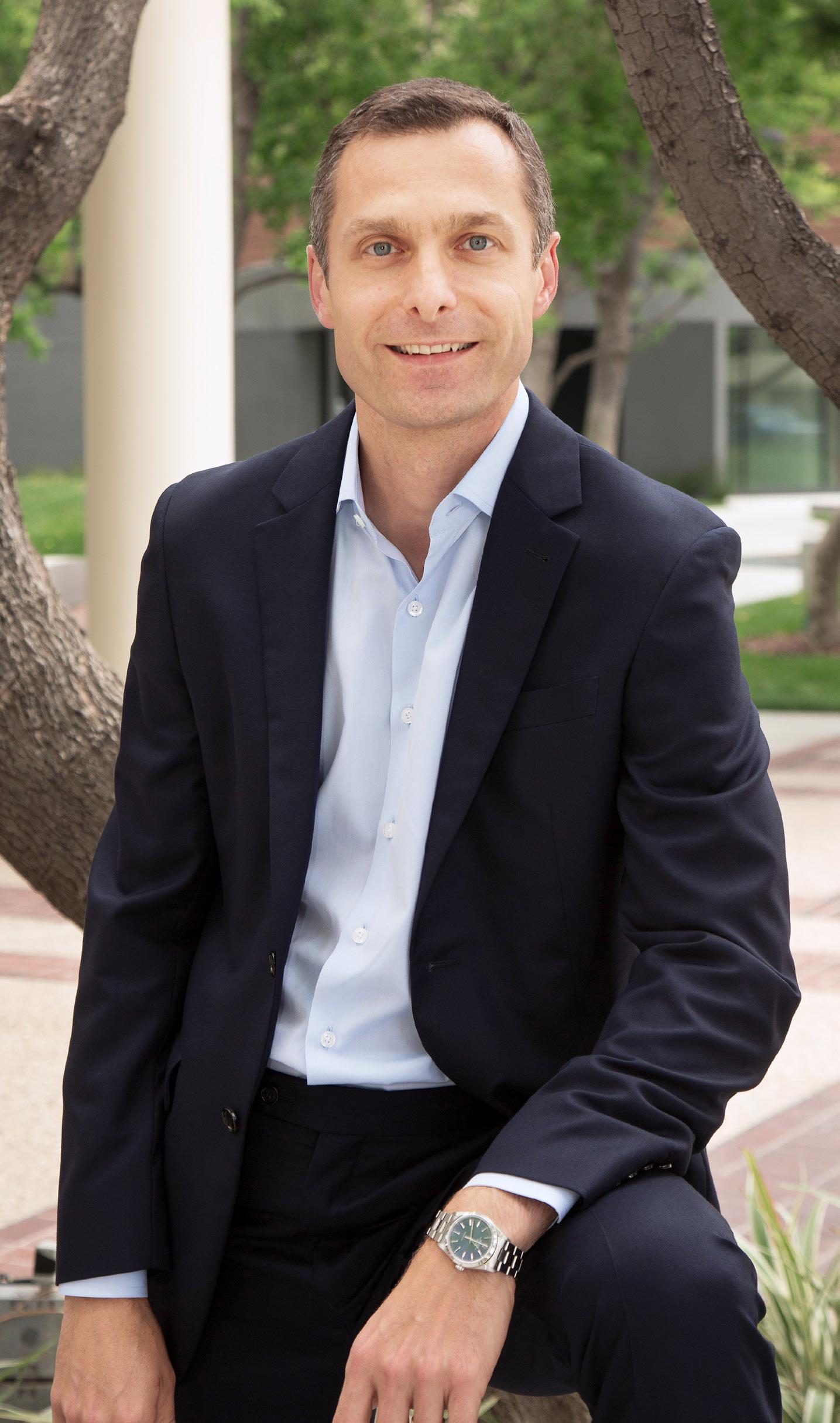
“Axel is one of those rare individuals who is both very adaptable and has a diverse range of knowledge and experience,” says Peter Phillips, president and CEO of Aon’s PathWise Solutions Group (p. 45). “He brought his scientific intellect to the business world and has since forged enormous success and strong, long-standing relationships.”
The challenges afforded by AIG, he says, are the stuff of dreams for a man raised and educated in the realm of problem solving and predictive analysis.
“Fundamentally, the finance function at AIG is evolving away from the stable tradition of simply reporting information,” Andre says. “We realized we need to do it in a way that’s automated with less of a pull on people and time, so that we can concentrate our efforts on forward-thinking initiatives and providing advice to our business partners.”
That involves working with the CEO on various strategic matters and analyzing what aspects of a volatile and everchanging market that AIG—and Andre in particular—can control. “Control” in the financial sector is a fluid term at best and anyone who works in that particular line of business is accustomed to uncertainty, although it can often prove stressful to even the most seasoned of veterans. Andre, however, says he finds solace in the chaos of every-changing priorities.
Data is the foundation of understanding your risks. PathWise® allows businesses to harness high performance computing to model assets, liabilities, capital and generate scenarios for our financial and regulatory reporting libraries such as IFRS 17 and US GAAP. Clients use PathWise for risk management, new product development, ALM studies using stochastic-on-stochastic runs, and real-time dynamic hedging activities too. Learn more at aon.com/pathwise to explore PathWise, a governed integrated enterprise system.


“I find it fun to be thrown into the middle of a variety of issues,” he says. “You can never predict exactly what’s going to happen, but you can be prepared. It calls upon your judgment and your ability to arrange priorities.”
It also can pose the constant threat of numbers fatigue or, as Andre calls it, “analysis paralysis.” That is the point where so much predictive work has to be done in a condensed period of time that it can lead someone in his position, a business partner, or a client to be gun-shy about making the deal. Time-sensitive decisions to execute transactions without the ideal amount of effort needed (or available) to complete a full risk analysis is part and parcel of doing business in the quick-fire world of financial analysis.
Although it is a bit more informed than shooting from the hip, Andre says time is not a luxury that he has for many decisions. Sometimes it’s a matter of being comfortable with 80 percent certainty rather than 100 percent confidence.
“Oftentimes we can’t get an exact answer, so the question becomes: How can you be comfortable with imperfect information?” he asks. “How do you get a client or a business partner to buy into a concept or sign on to something when you can’t give them every bit of detailed information they would want for a high-stakes transaction? We have decades-long relationships with many of our clients and partners, but major transactions warrant loads of background. Sometimes the

only thing that helps move it along is the fact that the clock on the wall is ticking.”
There’s also the fact that Andre is very good at what he does. A natural problem-solver, Andre says he relishes the opportunity to collaborate on problems that might have little consequence on nature and the very laws of physics, but nevertheless mean the world to clients who are planning their retirement or a particular company’s bottom line.
“Milliman really enjoys supporting cuttingedge groups like Axel and his team at AIG, who value the insights that can be generated by up-to-date data and sophisticated analytics,” says David Wang, principal and consulting actuary at Milliman Inc. “Axel needs information and insights to drive decisions at AIG. Milliman and AIG have worked together on annuity industry studies that apply leading-edge practices in predictive analytics to uncover the drivers of customer behavior. Understanding customer behavior helps Axel and his team better manage risk and capital and influence new product development.”
Since his undergraduate work at Imperial College in London, Andre says he’s thrived in collaborative environments as a part of teams that feature varied skill sets, and he’s found that exact same setup in the financial sector.
“No one individual can get a job done alone,” he says. “It takes a team of people working together to accomplish great things.”
You can imagine even the non-physicstrained veterans on Wall Street would agree.
“I find it fun to be thrown into the middle of a variety of issues. You can never predict exactly what’s going to happen, but you can be prepared. It calls upon your judgment and your ability to arrange priorities.”
AXEL ANDRE
IT TAKES VISION. Today, forward-thinking firms are leveraging technology in astonishing new ways that promise to transform the industry. At Milliman, we have a vision for applying predictive analytics to deliver solutions that help our partners manage risk and build a competitive advantage with data that empowers companies to identify, acquire, retain, and connect with customers. Learn more, go to milliman.com/vision
Peter Phillips drew from two decades of experience to bolster Aon’s PathWise Solutions Group and create the best type of client experience
By PAUL SNYDERWhen Peter Phillips was hired by Aon in 2008, he says he had one directive: develop a high-performance computing solution to manage complex processes.
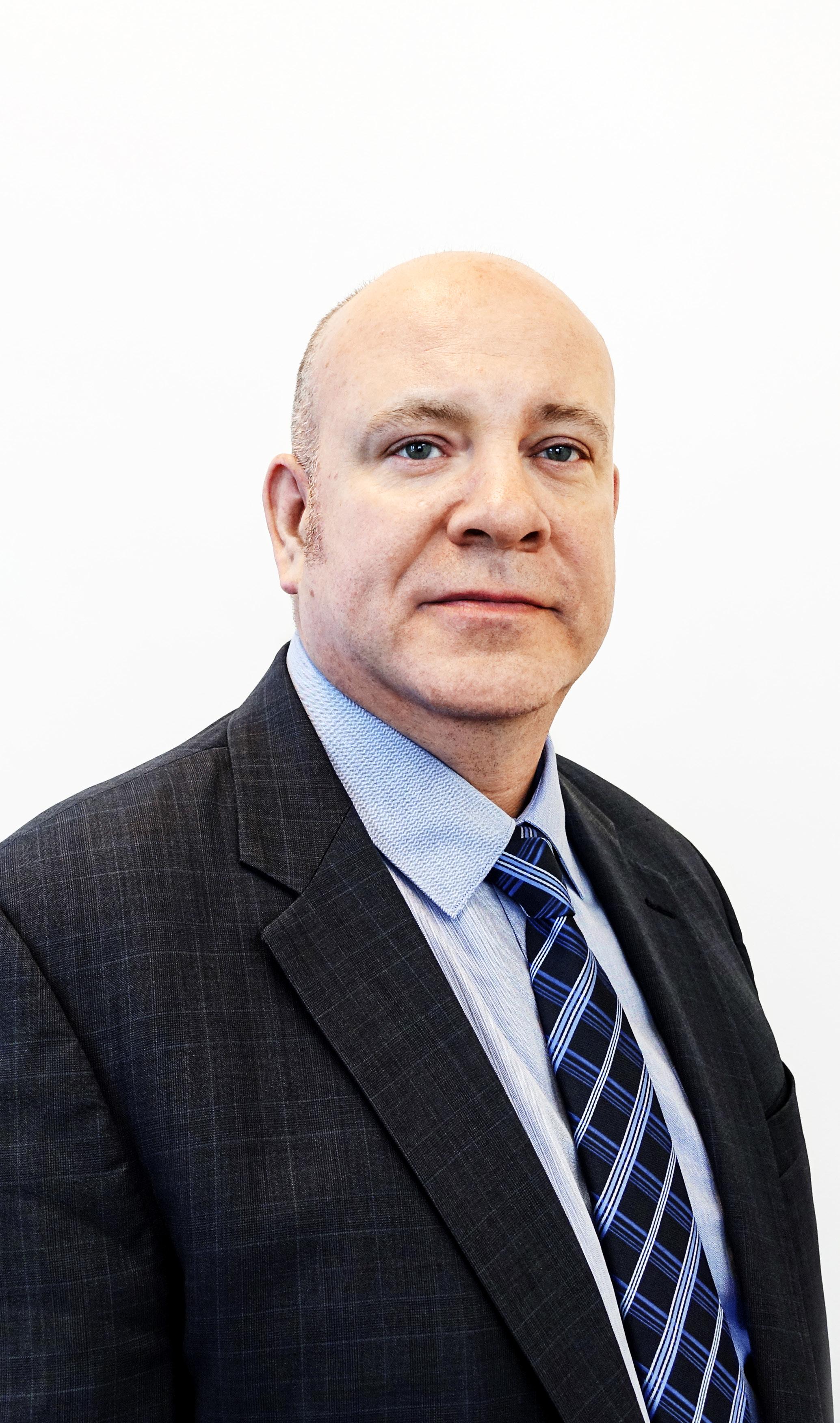
More than a decade later and now in the role of president and CEO of Aon’s PathWise Solutions Group, it’s fair to say that Phillips met his objective. More than that, however, he’s helped set up both Aon—a firm that has long recognized the importance of data and analytics in creating effective solutions—and its clients with financial risk management and analytical software that can evolve over time.
“PathWise Solutions helps companies do several things, including hedging risks and financial reporting, regulatory reporting, developing and pricing new products, as well as enterprise risk management,” he explains. “We’re three hundred to ten thousand times faster than the legacy software solutions in the marketplace. These companies have millions of policy holders and they have to do a lot of complicated and lengthy calculations. Sometimes it can take companies weeks to just complete one important calculation using these old systems. With our system, work can be done in a matter of hours or minutes. It’s a revolutionary approach to modeling and managing complex risks.”
It’s also something that Phillips, who has been designing, implementing, and managing effective variable annuity hedge programs and valuation solutions for insurance companies since 1998, could provide a unique insight into building. He has more than two decades’ worth of derivative trading, modeling, and risk management experience in the banking and insurance industries.
In addition to specialized software, the PathWise Solutions Group at Aon provides clients with investment advisory and consulting services. The software is an award-winning, integrated, high-performance computing business solution to model, price, value, report, and manage complex financial guarantee risk embedded in life insurance retirement products.
Peter Phillips President and CEOAlthough it’s not uncommon for companies to bandy terms such as “revolutionary” and “game-changing” about when discussing their own products, Phillips has had a decade not only to watch the PathWise Solutions formulate but also realize the incredible effect they’ve had on Aon’s client base. Although the technical aspects of the software play a large part in how dynamic it is—Phillips notes the software runs solely on Nvidia graphics processing units (GPUs), which provide the distinct speed advantage over other legacy systems running on central processing units (CPUs)—he also is quick to point out the successes are borne of an order from Aon to “do the right thing.”
“The biggest challenge in this industry is not taking shortcuts,” Phillips says. “From a design perspective, it’s often the case that people will cut corners to get a solution to the marketplace. We didn’t cut any. We had the privilege and opportunity to work for Aon, and they really instilled in me this notion of getting it right—it’s what our clients deserve, so we have to invest the time, effort, and hard work to do exactly that.”
Perhaps one of the strongest indicators of a job done well is the fact that the software platform was adopted by Kyobo Life Insurance Co. Ltd.—one of the three largest life insurance companies in South Korea —in 2017. The software replaced Kyobo’s previous patchwork of reserve valuation tools with an end-to-end, fully automated system to handle inforce conversion, assumption transformation, scenario generation, stochastic-on-stochastic calculations, and financial report generation. One of the main reasons this platform is now being adopted at an international level, Phillips notes, is that the clients drive how PathWise Solutions will perform instead of the reverse situation.
“The businesses are the experts—they know their business better than we do,” Phillips says. “It’s a different approach from a design perspective, and I’m very proud to see how all these pieces fit together. We never wanted to sacrifice on performance, flexibility, transparency, or control—and it’s working. Think about how good your solution must be to work in a country halfway around the world with a different
culture and different language. You have to have a good product and great team for that to happen.”
Looking ahead, Phillips says he’s eager for more businesses to adopt PathWise Solutions as the system extends its focus to deep learning capabilities, which he says should enable clients to better understand their own data, control insight, and allow for better business decisions in the future. Without the input from his clients, however, that growth and increased understanding can’t happen, which is why Phillips doesn’t hesitate when asked about his favorite part of the job.
“I love working with clients and helping them with their toughest problems,” he says. “It’s a privilege, and I also get the opportunity to work with incredibly smart people, which enriches my knowledge base. I’m always very grateful for that. I’ve talked about PathWise like it’s a finished product— it’s not at all. We continue to invest in the software and adapt and change it, and all the best and toughest ideas for change come from our clients.”
“I’ve talked about PathWise like it’s a finished product—it’s not at all. We continue to invest in the software and adapt and change it, and all the best ideas for change come from our clients.”
PETER PHILLIPS
The last decade hasn’t been an easy time for the steel industry, with global oversupply and—until the US-imposed tariffs in 2017—a steady and sustained influx of Chinese imported steel adversely impacting domestic steel producers. “Our customers were hurting and, as a result, we were hurting,” says Masha Trainor, vice president, general counsel, and secretary at Ampco-Pittsburgh Corporation, an NYSE-traded industrial manufacturer, which classifies its businesses into two segments: forged and cast engineered products and air and liquid processing.
So when the former head of Ampco-Pittsburgh retired in 2018, new CEO J. Brett McBrayer, together with the senior management team, developed a new strategy to bring the company back to profitability. The three-year plan includes simplifying the operational structure of the company,
reducing the inherent complexity in its manufacturing processes, and, through a variety of channels, generating greater cash flow while focusing on expanding margins for the company’s products.
“With the goals clearly set by our CEO, every member of the executive team has a role to play, which ultimately supports the overall strategy,” Trainor says. In an ever-changing environment, that is crucial, and Trainor is up for the challenge.
Born in Russia, she left at seventeen to come to the United States and attend high school in Joplin, Missouri. She then went on to earn her finance degree from Missouri Southern State University, followed by both a law degree and an MBA from the University of Tulsa. “I ended up never going back [to Russia] and to be honest, that was part of my personal strategy all along,” she says.
Excelling both in law and finance, Trainor focused her academic and early professional training on becoming a well-rounded
corporate lawyer with a focus on bridging her legal and business training. After law school, she spent fourteen years based in Pittsburgh doing deals for the global law firm K&L Gates LLP. As a partner at the firm, her practice involved advising clients on their most significant cross-border and domestic mergers and acquisitions, commercial contracts and joint ventures, and securities and corporate governance matters. During her time at K&L Gates, she saw the firm grow from ten offices in the early 2000s to more than forty offices worldwide.
With her corporate practice growing rapidly, Trainor caught the eye of Ampco-Pittsburgh. Though she wasn’t looking to leave private practice, Trainor saw an opportunity to contribute and to become part of a business team that works together to improve the historic Pittsburgh-based company’s shareholder value and overall financial performance. Since Trainor came on board in 2015 and became Ampco-Pittsburgh’s
VP, general counsel, and secretary, the company has gone through several cross-border and domestic acquisitions. Each of these transactions were complex, strategic, and challenging both in terms of the legal and business issues involved.
Now, with a new corporate strategy in place and priorities firmly in place, Trainor is part of the senior management team, which is focused on achieving sustained success for Ampco-Pittsburgh and its nearly two thousand employees around the globe. It’s a dramatic change of pace and focus from her private practice days, working purely as an outside adviser and often in a reactionary role, rather than as part of a team building strategy and goals from the ground up. “When you’re in the legal department of a company, particularly acting as its general counsel,” she explains, “you have to assume a leadership role in contributing to the overall strategy and be a proactive partner to the business and management team.”
When engaging with outside counsel, Trainor takes the time to explain the importance of Ampco-Pittsburgh’s strategy and its overall direction. Each acquisition, divestiture, or financing should not be viewed in isolation but as a building block in achieving the company’s strategic goals and objectives. Trainor believes that when outside counsel understand corporate strategy, they can bring more value to their clients by thinking ahead and anticipating the issue before the client calls.
“It’s all part of deeply understanding our business and partnering with us to achieve our goals. And with that understanding and partnership, outside counsel often will develop solutions that are more creative,” she explains. Outside counsel are sought out because they are the experts in their specialties. The outside counsel who stand out from others are those who are proactive and strategic. “Many of the outside lawyers we use will reach out and say,

Must


‘I know you are looking to do X, Y, and Z. Have you thought about this?’ I always appreciate and value this type of thinking. Those are the firms that get our repeat business.”
Metz Lewis salutes

Masha Trainor of Ampco-Pittsburgh.
With the challenges of the past few years, Trainor finds the best way to face them is to focus intently on the key business drivers for each matter and then to “divide and conquer” with a relentless focus on cost-effective execution. “For each project, we have a member of our senior team who is appointed as project lead who is given the responsibility to manage the project from start to finish,” she explains. But with a lean staff, it is important for the legal function to partner with others in the company in order to be efficient and timely on execution.
In her past four years at Ampco-Pittsburgh, Trainor’s plate has always been full. Whether it’s M&A, working on a credit facility or a financing, overseeing the company’s compliance program, or addressing employee issues or customer concerns, every day brings something new and different.
“My experience here has been very interesting, and I’ve learned a tremendous amount about our business and how to build a successful legal function that contributes every day to achieving our strategic goals and objectives,” Trainor says. “It’s exciting to be part of a management team that’s smart, focused, and looking forward to achieving great things for Ampco-Pittsburgh, its employees, customers, and shareholders.”

Masha’s leadership and legal acumen render her a worthy recipient of this honor.
Congratulations on this impressive recognition of top Women General Counsel.
METZ LEWIS BRODMAN
MUST O’KEEFE LLC
Metz Lewis Brodman
O’Keefe
“When you’re in the legal department of a company, particularly acting as its general counsel, you have to assume a leadership role in contributing to the overall strategy and be a proactive partner to the business and management team.”
MASHA TRAINOR
Before becoming a vice president and company controller at Bridgestone Americas Inc., Kara Stratton Jacobs spent more than thirteen years at Deloitte, starting as a general staff member and eventually becoming a managing director. While ascending the ranks at Deloitte, Jacobs methodically built leadership skills and accounting expertise that allowed her to thrive in a front-office role at Bridgestone, the world’s largest tire and rubber company, which employs more than 142,000 people. Jacobs, in conjunction with her team of five direct reports, is responsible for all financial reporting to Bridgestone’s parent company in Japan.
Although her job is centered around dollars and data, Jacobs takes seriously her role as mentor. When she arrived at Bridgestone, her team was mostly vacant, forcing her to build it from the ground up. Now, two years into her role, Jacobs’s finance team is considered the gold standard within the company—a “North Star” exemplar that guides and mentors other teams and departments. Citing a servant-leader management style, Jacobs notes that she never asks of someone else what she would be unwilling to do herself. This authentic and equitable leadership approach has allowed Jacobs to build an impressive rapport within her team and throughout the company.
“Kara has always been regarded as one of the best in the business and continues to lead by example at Bridgestone by tackling a
multitude of initiatives,” says Jessica Kashyap Ragauskis, a senior director of accounting and finance client solutions at Vaco. “She has been a role model to many young associates both at Deloitte and at Bridgestone, all while raising two beautiful children. Kara is truly one of a kind, and it’s been an honor for Vaco and myself to work with her.”
Jacobs acknowledges that her success wouldn’t have been possible without mentors and community members who, early on, identified her strengths and molded her into the person she is today. Jacobs earned her bachelor’s degree in accounting from the University of Tennessee at Martin and became the first of her family to attain a college degree. Shortly thereafter, Jacobs continued to pursue higher education and attained her master’s degree in accounting from the University of Tennessee. Jacobs credits these successes to an abundance of mentors, and she strives to always pay it forward to others looking to forge similar career paths.
At a time when Bridgestone’s workforce is becoming more diverse, Jacobs conceptualizes her role as a leader to be even more critical. Jacobs strives to develop personal relationships with team members in order to identify their strengths and help them achieve their goals. Given the company’s innovative culture, lofty goals are always encouraged with fervor.
Founded in 1931, the Bridgestone Corporation places Jacobs in a rare company of global executives tasked with financial reporting for such a large company. Nevertheless, Jacobs’s humble beginnings keep her grounded, encouraging her to always stay true to herself and to give back to those around her.

Inclusive cultures can embrace individuality and give voice to a broad range of perspectives.
Because nothing outshines authenticity. Look again™ . See what inclusion powers at deloitte.com/us/inclusion.
Be brilliant. Together.

It’s a place where the best and brightest are free to reach their full potential, a place built on an uncommon culture that values personal empowerment and fierce entrepreneurial spirit, and a place that has truly become like family. Vaco provides expert consulting, permanent placement, executive search and strategic staffing for companies across the country and around the world, in all kinds of different industries. We place qualified candidates in hard-to-fill positions and solve tough problems for businesses. But most importantly, we help people find freedom.
At Vaco, we celebrate all the wonderful women who have found their freedom, paved the way in the past, are breaking boundaries in the present, and who will inspire generations to come. Kara Stratton Jacobs embodies these principles with her exceptional accomplishments and contribution to the development of her company. It has been an honor working alongside Kara and it’s no surprise that she is receiving this well-earned recognition. Kara is a leader who inspires those around her and someone who we greatly admire. We wish her continued success and look forward to cultivating our relationship with her.



No industry is immune to change. Six innovative executives share how they turned challenges into successes through organizational transformation and authentic leadership.



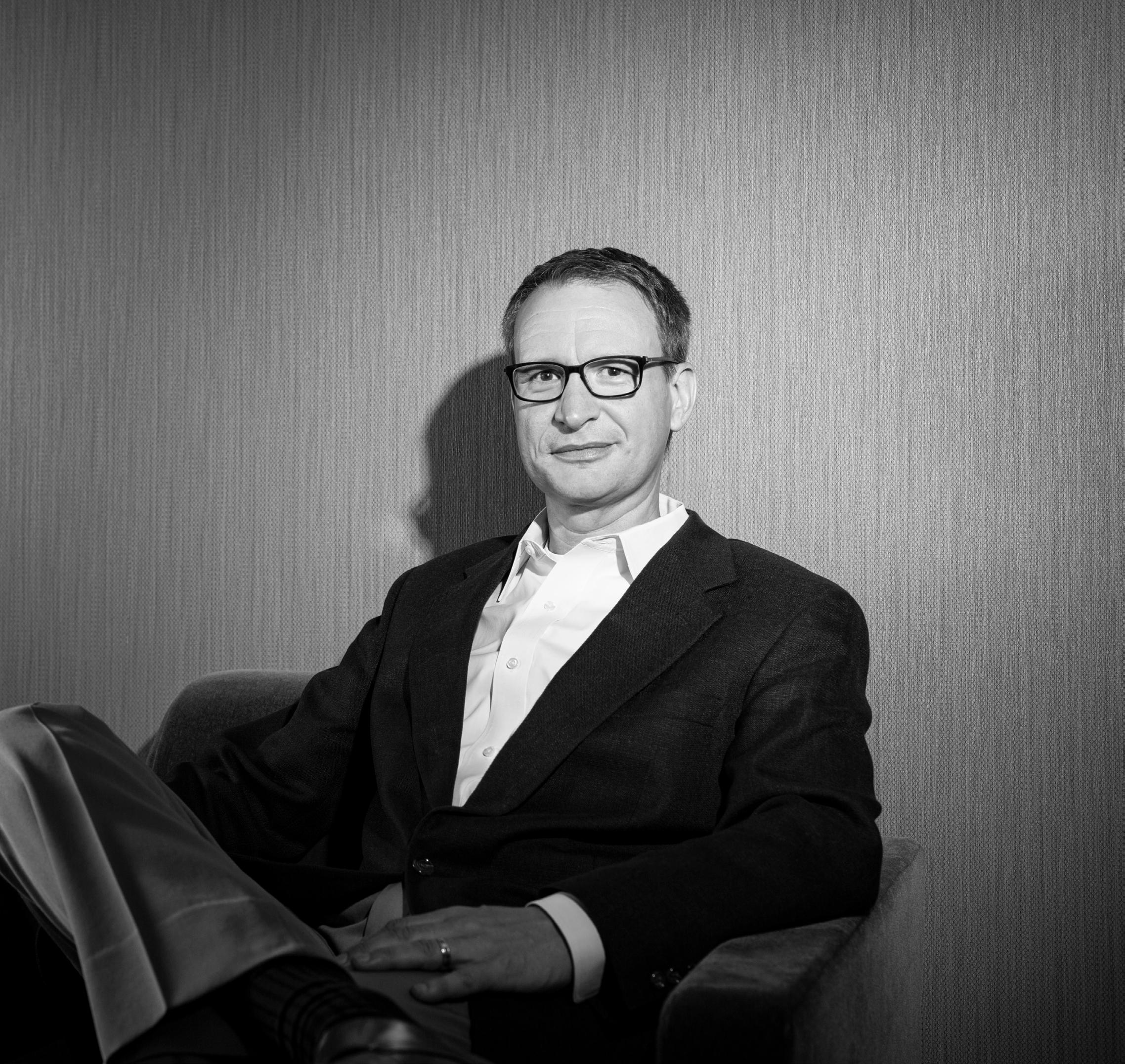
 By BILLY YOST Photos by GILLIAN FRY
By BILLY YOST Photos by GILLIAN FRY

coming to National Bank Holdings (NBH) in 2013, Zsolt Bessko has helped shape NBH, a company which was initially born out of the Great Recession through a series of acquisitions of failed or seriously troubled banks with a mission to get back to “common sense” community banking. When Bessko spoke with Profile in 2015, he didn’t realize that the year would ultimately be a turning point for the organization at large. It ended up being one of intentionally bold moves that yielded lasting and powerful results.
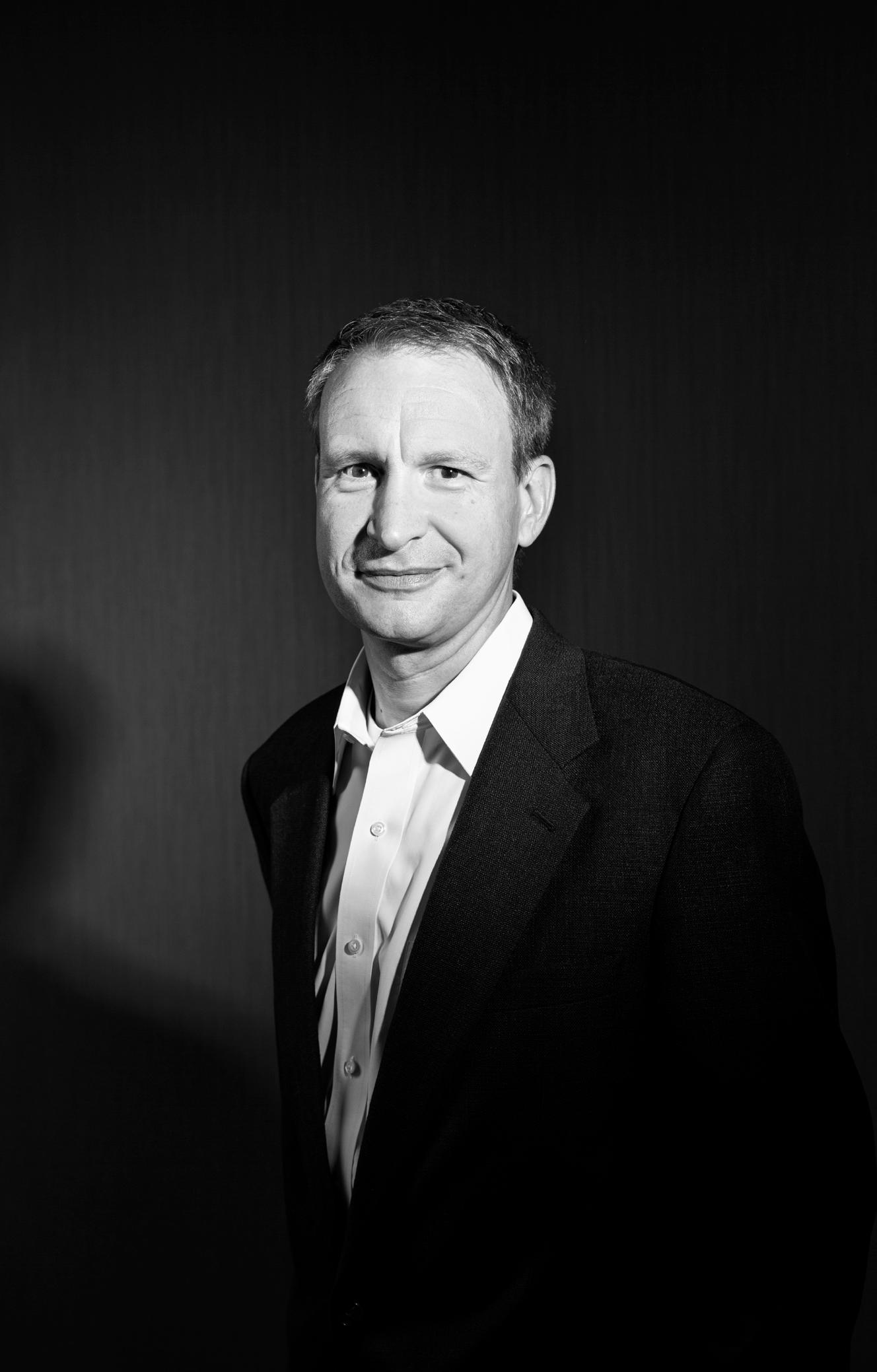
Bessko is no stranger to turnaround culture or operating within uncertain times. The now chief administrative officer and general counsel at National Bank Holdings cut his teeth in both the banking boom of the 1990s and in helping keep organizations afloat in the midst of the late 2000s economic downturn. When told that he seems like he’s the kind of guy that’s calm in a storm, Bessko laughs. “That’s not the first time I’ve heard that.”
Two moves in 2015 helped set up the Colorado-based banking organization for continued and lasting success—moves where Bessko was able to be a significant contributor. The first involved changing the bank’s charter. NBH was initially chartered with the OCC and, for supervision and regulation purposes, included in the OCC’s “midsize” group of banks, which generally comprises banks $10 billion to $50 billion in assets. “What we found was that the
midsize distinction didn’t fit well with what we were trying to do strategically,” Bessko says, as NBH was only around $5 billion in assets at the time. “It made much more sense to change our charter and become regulated by the State of Colorado and the Federal Reserve Bank of Kansas City.”
From Bessko’s perspective, it made perfect sense. Over the course of his firm and in-house career, the lawyer had developed relationships with all the regulators in the region and felt that those regulators, in turn, better understood the nature of NBH’s business. “It just was a better fit in terms of the local presence; it really aligned with our goals of being a community bank,” Bessko says. Looking back nearly four years later, the GC says the move was absolutely the right one and has ensured an enduring relationship with NBH’s regulators and an ability to grow and engage in acquisitions as needed.


The second difficult decision involved NBH’s core-processing provider. “We felt our existing core processor wasn’t providing what we needed or what our clients expected, especially at the pricing we were subject to,” Bessko says. “So we went through a painstaking RFP and negotiation process and converted our systems in 2015.” While still not as perfect as the GC would hope, he says the switch offered a much wider swath of tools and options to
better serve the bank’s clients. “We are in a period where we’re going to see even faster technological change in the banking space,” Bessko says. “We absolutely believe we have to be on top of it.”
Continuing to drive change at NBH certainly hasn’t been easy, but Bessko says the numbers speak for themselves. “This first quarter [of 2019], we had the best earnings yet as a company,” Bessko says. “That’s coming off an already great, record 2018, but we’re not going to rest on our laurels.”
Bessko says ensuring success means taking strong ownership of company culture, especially important since NBH essentially came about through the acquisition and consolidation of several formerly troubled and failed institutions. “You have to rebuild that culture from scratch and
“We are in a period where we’re going to see even faster technological change in the banking space. We absolutely believe we have to be on top of it.”
ZSOLT BESSKO
bring all these different cultures together to create a new one,” Bessko says. “It’s not something that you just create one day and put it on the shelf.”
Creating culture has also meant being willing to have sometimes difficult conversations. “We strive to make sure we’re a relationship-based bank,” Bessko says. “That includes our relationship with our associates: if our associates are taken care of, they will take care of our clients.” A willingness to be personal has accounted for NBH’s continued progress.

Success aside, the question remains: what makes a successful executive seek out helping a company turnaround a coalition of troubled and failed banks? Bessko isn’t sure, but he’s always done okay with chaos. The first-generation Hungarian was sent back home to live with his extended family at the height of Cold War tensions in the region. It made the lawyer self-sufficient and self-assured from a young age, not only willing to deal with potentially difficult situations but also running them down by choice.

Zsolt Bessko expressed a great deal of pride in the sheer number of charitable causes National Bank Holdings (NBH) not only contributes to but also actively participates in. The Do More Charity Challenge is in its fifth year and has already contributed more than $1 million to a variety of charitable causes across the footprint that NBH serves. NBH cofounded, hosts, and sponsors the event, bringing together CrossFit teams looking to raise money for charities of their choice.

NBH is also active in aiding the Kansas City-based Hope House, which supports victims of domestic violence, and the Colorado-based Third Way Center, providing help to high risk, mentally ill, disadvantaged and homeless adolescents and their families. NBH supports a number of additional organizations across its markets, particularly those that advance education, quality housing, and workforce development.

Common sense is about more than banking. It’s about putting interaction before transaction. Being friendly and staying sincere isn’t just how we do business, it’s who we are. It keeps us connected to our community on a personal level.

We are proud to work with Zsolt and NBH, and we look forward to serving NBH’s legal needs on the journey ahead.





 By RUSS KLETTKE
By RUSS KLETTKE
shares the importance of balancing progressive organizational design and cultivating diverse talent to win in a highly competitive global market

-moving technology trends dictate change in nearly every industry. The response to this change must be equally fast, and yet future-focused at the same time. In many cases, the response has called for full-scale organizational transformation that can make or break a multibillion-dollar company. Every function has a key role to play, but it is the human resources executive who perhaps has the most unpredictable and vital asset to work with: people.
To weather the storms that come with the territory of transforming a business and to successfully navigate change with purpose, “you have to be brave and bold,” says Debra McCowan, chief human resources officer at NetApp. “Inspire your people and carry them with you on the journey as it will help them feel that they are part of change, not subject to it.”
NetApp, a Silicon Valley-based data company with a large global footprint, started its journey twenty-five years ago in storage hardware and has since been transforming to continue its mission to help companies holistically manage data in a hybrid cloud world. Like many other tech companies, NetApp is at a critical junction of needing to leap into the future or risk being left behind.
Determined to thrive and recognizing the importance of having the right organization and talent profile to evolve, NetApp made the conscious decision to bring in a CHRO who is a change agent and an established, transformational leader focused on driving evolution through progressive, business-aligned HR strategies. So, a year ago, McCowan came on board with a license to rebuild and reposition the HR function to be a catalyst for change.
McCowan focused on three key areas: driving an enterprise mind-set and removing silos, gaining deeper clarity on the alignment of the business and people strategies, and ensuring the best and highest use of all employees to drive execution and delivery while ensuring they thrive through growth and impact.
She quickly immersed herself in NetApp’s raison d’être —harnessing enormous volumes of data to
create value, innovate, and optimize business operations—with limited time, skills, and budget. After conducting an extensive listening and learning tour to better understand the business and its employees, she found there was real opportunity to better engage, cultivate, and leverage talent globally.
McCowan is a firm believer that designing for employee experience and cultivating a company’s existing culture is a critical aspect of the business strategy. When focused on growth and diversification, she explains, a company must understand and evaluate the capabilities and experience of its talent and how to best build and invest in it. The right diverse talent mix is crucial to building capacity, driving change, and results, as well as representing NetApp’s diverse global customer base.
Buying all your talent from the external market is not the answer, nor does it create the right mind-set, McCowan says. “We have taken the position of balancing the buy versus build talent strategy to both inject new skills and capability where needed and to cultivate, develop, and deploy talent that already exists in the company,” she explains. “This ensures an environment of learning and growth.”
This balanced approach has also helped NetApp’s employer brand become a strategic differentiator through three focus areas: having a commitment to a clear vision and strategy, celebrating diversity and inclusion as core to the business, and doing well by doing good and focusing on developing the social enterprise. NetApp has created a sense of purpose for its employee base through its robust volunteer and giving back program, which gives the company a competitive hiring advantage.
“As NetApp’s strategic resource for contingent talent management for nearly ten years, Workforce Logiq is fully partnered with Debra to achieve a consistent candidate experience that leverages the important work she is doing to enhance her employer brand,” says Jim Burke, CEO of Workforce Logiq, a global managed services provider. “Because Debra and her team embrace a balanced approach to their holistic workforce management, NetApp must look and feel like one brand with one employee value proposition, whether talent is being recruited for full time or contingent work. Debra’s clear vision for talent planning ensures that NetApp and Workforce Logiq deliver an organizational architecture that gets the right outcomes and talent globally.”
Balancing optimal, progressive organization design and the right diverse talent mix is both an exciting and daunting challenge.

McCowan and her team work with business leaders to project the talent strategy three years out based on the direction and desired performance. It means HR must anticipate industry trends, changes in customer landscape and needs, changes in employment landscape, and what favorably drives employee experience.
The strategic role of a CHRO is to ensure the business is agile and that it remains so through transformation without losing the hearts and minds of the employees. While formulating an integrated plan and selling it to the C-suite is critical, McCowan says that HR must also continue to evolve and be “fit for purpose” to meet the business where it is and to design for its needs. HR must add value by driving the right outcomes, ensuring it is easy to work with, engaging openly at all levels of the business through strong partnership, operating efficiently, and expertly using data and employee listening mechanisms to provide insights and drive decision-making.
“HR must think of themselves as business professionals who bring their HR experience and expertise to the table to provide perspective and to create opportunity,” McCowan explains. “As thought leaders, we provide data and insights and offer a clear point of view to help business leaders balance taking risk and manage exposure to become a more innovative team. It’s about being adaptive, in service to the business and our employees.
“In today’s world, nothing stands still for long, and change is constant,” she continues. “Embrace it and turn the journey into opportunity as part of the company’s unique story.”
“Inspire your people and carry them with you on the journey as it will help them feel that they are part of change, not subject to it.”
DEBRA McCOWAN

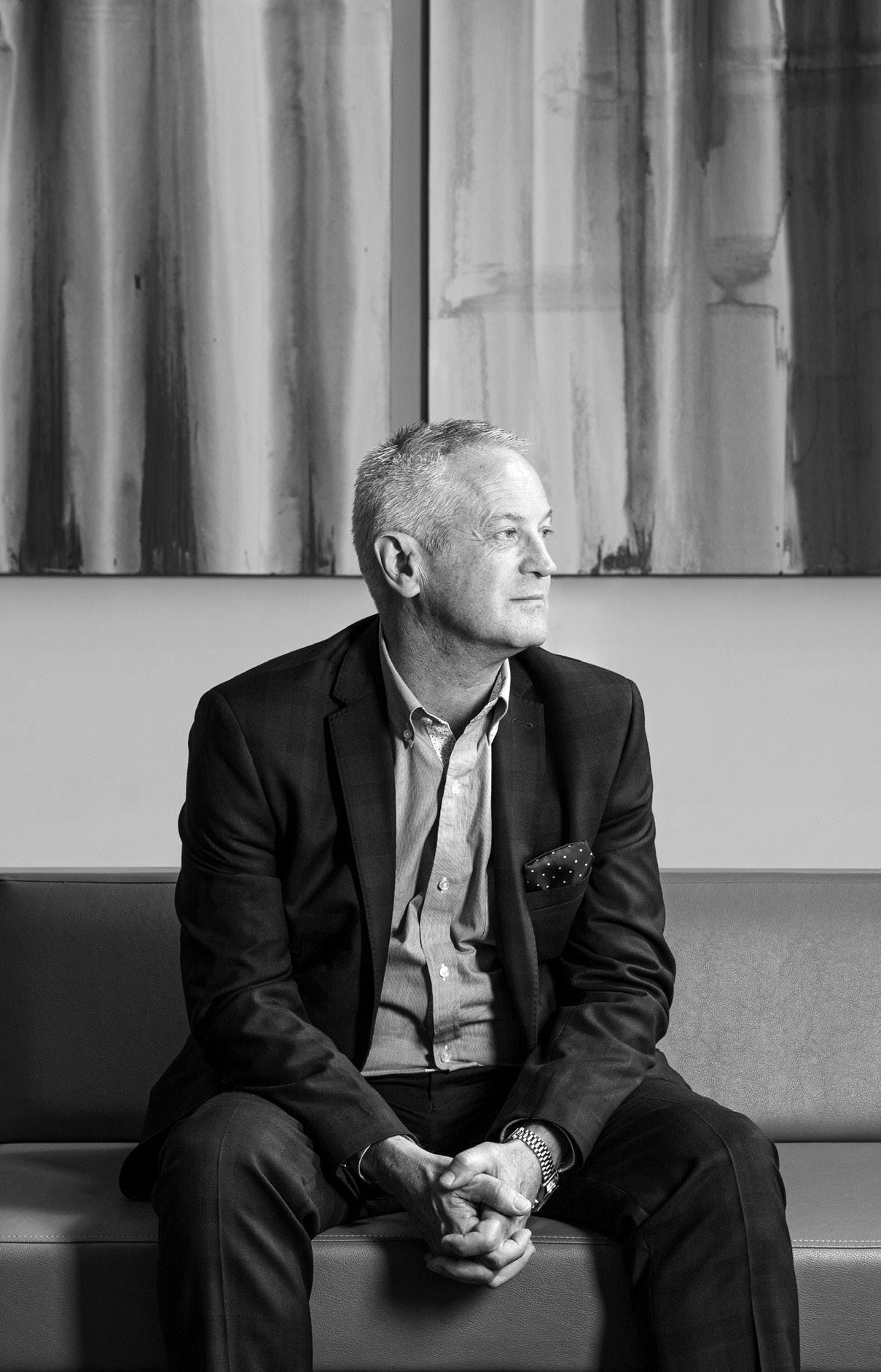



 By BILLY YOST Photos by GILLIAN FRY
By BILLY YOST Photos by GILLIAN FRY


Alomes says that the most alluring part of taking his job at pawnshop magnate EZCorp was that the company was facing a really difficult time, which was significantly impacting the share price, reducing morale, and had no clear strategic direction—a strange indicator of a must-have job. “This great company was going through an unbelievably difficult couple of years, and our CEO really needed someone he had a relationship with and could trust,” Alomes says.
Though he had absolutely no prior pawn experience, Alomes had cultivated a reputation as “roll your sleeves up and get it done” master in the banking and finance world, having managed successful company comebacks both in Australia and the UK. The now CHRO at EZCorp says, frankly, that if there hadn’t been a problem, he wouldn’t have been interested in the job. Four years into the turnaround with successful metrics on virtually every level, Alomes is able to take stock of EZCorp’s successful refocus on its core businesses and getting its organizational eye back on the ball.
Alomes says he’s not entirely sure how he got into the business of turnarounds, but he saw coming to EZCorp as a win-win-win proposition. “I was excited to come to the States to work in the biggest economy in the world,” Alomes says. “This was a distressed asset, so I saw the only direction we could go as up.”
The CHRO understands his response may seem flippant, but the due diligence he had done on EZCorp let him know that the company’s remarkable growth and story wouldn’t stop simply because of some poor investments and need for organizational change. “From a personal development point of view, this was a once-ina-lifetime opportunity to make a difference and really help
change a lot of lives of people for the better,” Alomes says. “I’m old and crabby, so I just looked at it as a very unique opportunity with absolutely no downside.”
Refocusing required a number of concurrent initiatives and projects. “We knew we absolutely had to build a new strategy in order to move the business forward, and we had to do it passionately,” Alomes says. Part of that strategy included working to identify talent and what the company needed in order to move forward. “This is absolutely 100 percent a people business, and they are your only competitive advantage; if you don’t have that focus, you’re not going to get anywhere,” Alomes says.
It also meant working to differentiate EZCorp’s publicly traded presence in the pawn industry from the other ten thousand storefronts that are able to operate without organizational oversight. “I’m not sure that people understand just how regulated our industry is,” Alomes says. “From a brand reputation standpoint, we want our customers to

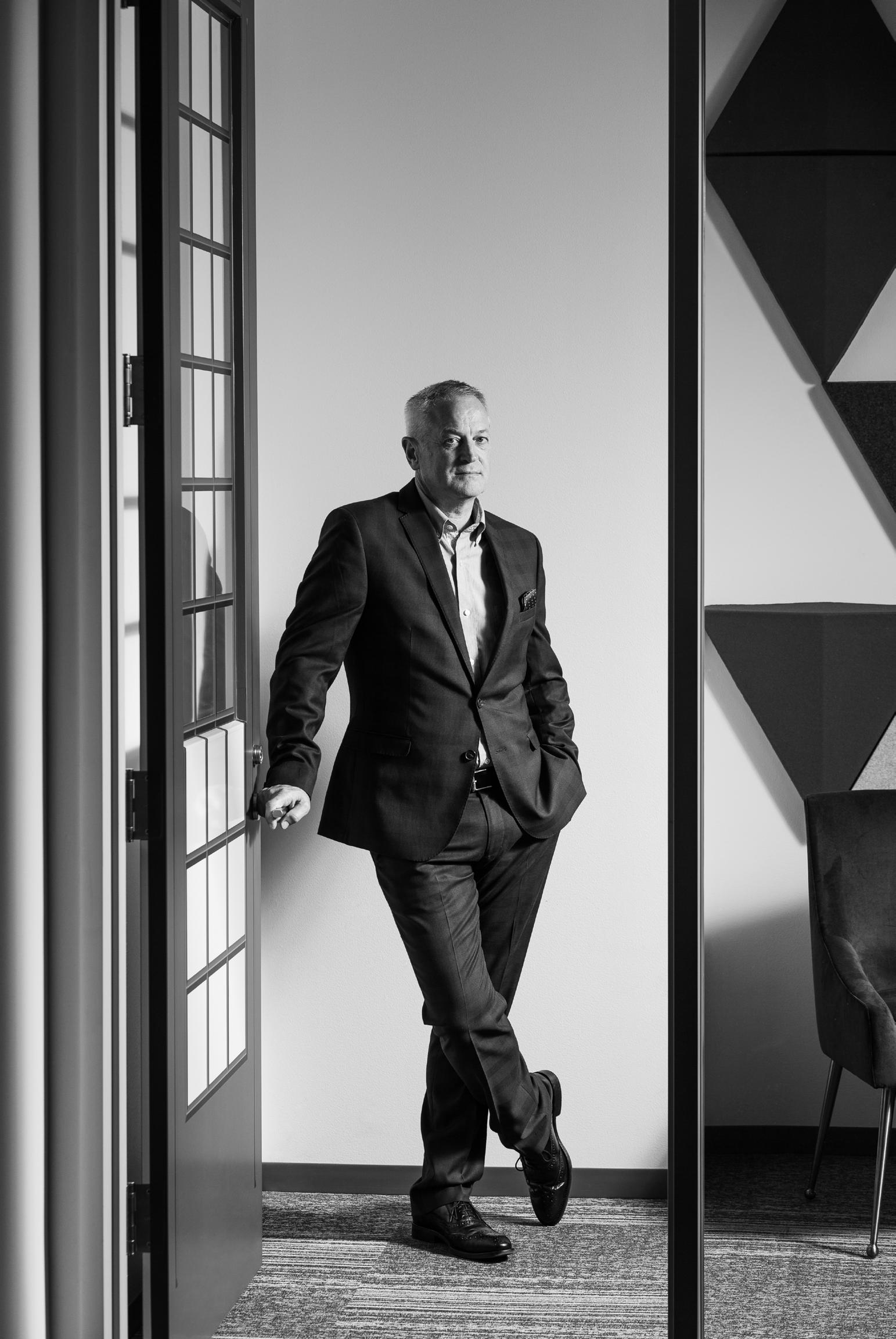


know that this is a safe, integrity-based business.” That brand reputation leads to attraction of both customers and retention of high-caliber talent.

In realigning strategy and scope, Alomes says redefining the values of EZCorp was also essential. Service, accountability, and empathy now serve as company-wide pillars that Alomes says were created in response to engagement surveys.
Alomes says that authentic leadership has been absolutely paramount in his role.
“I don’t want to sound like a flower child, but it’s really just about being real,” Alomes says. “You need to understand your people and in being transparent with them, they also need to feel that they can be transparent with you. It’s not a one-sided conversation.”
That transparency is part of a much larger conversation, literally. “Bottom line: you have got to be communicating all the time,” Alomes says. “In helping make everyone accountable and own their roles, there always needs to be a conversation happening; those lines need to be open.”
Tweaking organizational processes has also led to significant growth at EZCorp. From leadership development to creating career structures, small improvements have allowed huge gains.
As EZCorp’s successful turnaround continues, the company is focused on a number of digital projects looking toward the future. “There will always be a need for storefronts in our business but relying on that traditional model is not going to sustain us as we move ahead,” Alomes says. “What are the digital platforms available to us and how do we make it easier for customers to avail our services?” The CHRO says the traditional pawn market is a stable and strong business but digitally diversifying offers its customers so many more options. It isn’t just a good idea; it’s a must.
The signs are there: share prices are up, HR scores are moving to a level that Alomes deems “world class,” 80 percent of promotions are internal, and attrition rates are down. “This sounds piecemeal, but these are the significant indicators that we are moving in the right direction,” Alomes says. Crabby though he claims to be, Alomes seems to be quite happy with EZCorp’s rebound.
“You need to understand your people and in being transparent with them, they also need to feel that they can be transparent with you. It’s not a one-sided conversation.”
SCOTT ALOMES


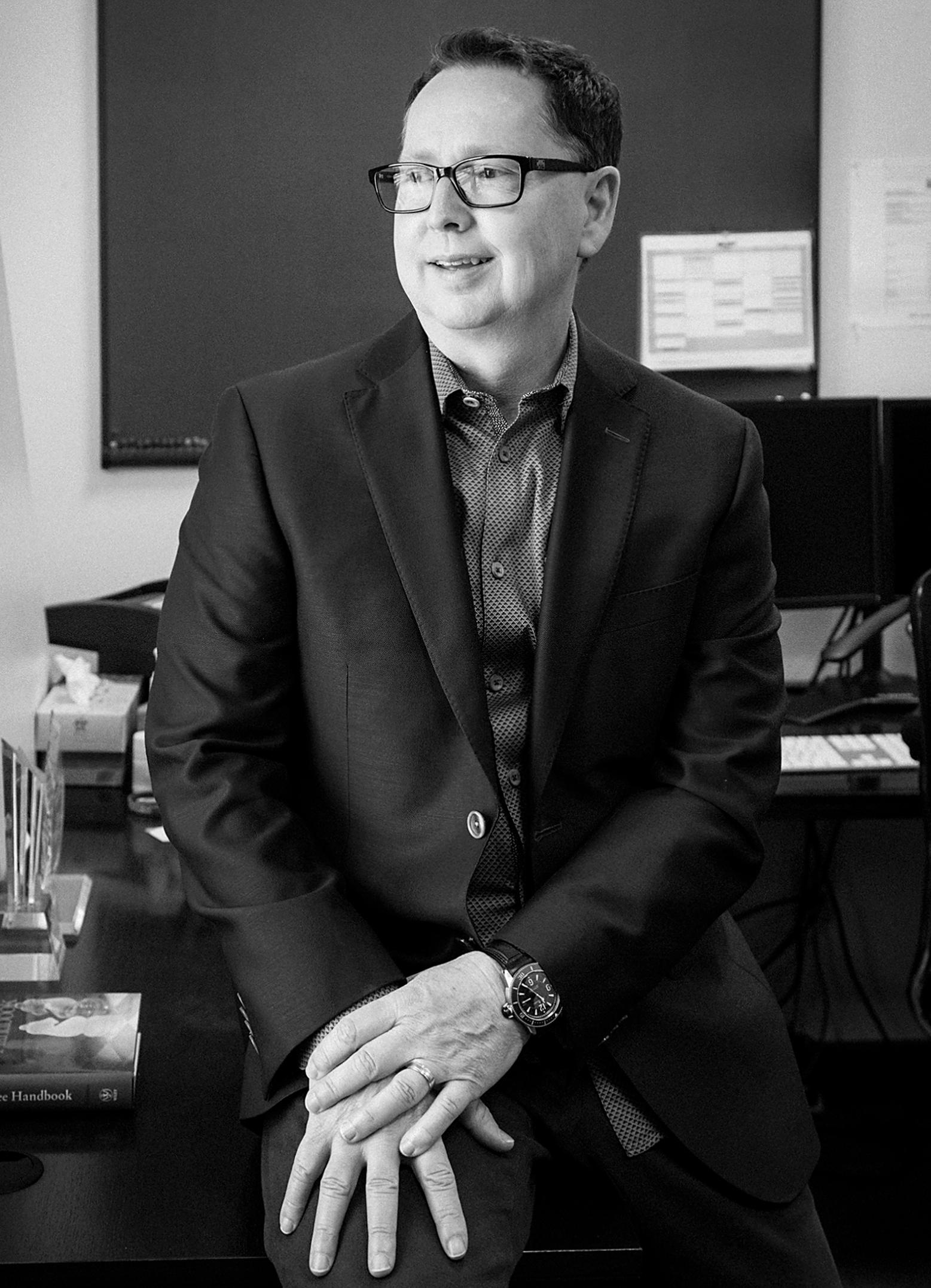
Corporation

Causey is on the floor of the Kmart in Modesto, California, stocking an endcap display with cans of paint. One by one, he pulls each gallon off the cart, the wire handles digging into his palms as he walks each can over to the shelf and places it in its temporary new home. As he repeats the action, back and forth, an older gentleman looks on, then offers this advice: “You know, if you move the cart closer to the endcap, your job will be easier.”
This took place decades ago, when Causey was a kid. He went on to hold accounting roles at KPMG, Beckman Coulter, DirecTV, and General Motors, where he was tapped to lead the accounting for the company’s 2009 bankruptcy filing. Today, he’s senior vice president, chief accounting officer, and controller at Caesars Entertainment Corporation, the $8.6 billion owner and operator of casinos, hotels, and golf courses. But in fundamental ways, his job is the same as it was that day in Kmart. “That’s what I’m always trying to do,” he says. “How can I get the cart closer to the endcap so it’s not hard and cut out all of the waste in between?”
In all of his roles, Causey has found ways to use accounting as a platform for leading organizational transformation. He did that for other clients as a consultant, especially dot-coms experiencing rapid growth but not thinking about how to scale their processes. He got to put a lot of that experience to use at DirecTV, where he helped the company through various
acquisitions and divestments, introducing efficiencies and better technology along the way. GM then hired Causey to lead transformation as part of his role—the bankruptcy was a surprise assignment—replacing its legacy consolidations and reporting system, remediating material weaknesses, and turning its shared services into the General Motors Global Business Service Center.

When Causey arrived at Caesars, he was yet again facing material weakness: late SEC filings, low morale, high attrition, and a 1980s general ledger system that sorely needed updating. To him, it was an attractive challenge— another opportunity to get the cart closer to the endcap. “I like issues and problems and complexity,” Causey says. “I like to make them less complex.”
Causey immediately started rallying his team. “I promised them, we’re going to get down to five-day closes, we’re going to file on time, and by the way, we’re going to cut the overtime.” The team was skeptical, but they worked with Causey to identify the root causes of their issues and address them with
Grant Thornton understands that success is built on more than just talent; it takes passion and perseverance to achieve a vision for a better future. On behalf of Grant Thornton, we congratulate our friend, Keith Causey of Caesars Entertainment, on his many achievements.

Why do bad things happen to good organizations? New business disasters are surfacing on an almost daily basis, revealing serious issues such as:







• Flawed strategies
• Poor customer satisfaction
• Ine ective financial management
• Error-prone operations
• Weak risk and compliance processes

• Inadequate remedial actions
Gupton Marrs International believes the root cause of such problems is that today’s management “control systems” have never been properly architected to deal with today’s complexity, velocity of change, and unforgiving competitive environment. To address this problem, we have developed 21st century Management Operating System (MOS) solutions that can help stakeholders consistently get from where they are to where they want to go, and assist in “getting back on track” whenever problems occur.
info@guptonmarrs.com
www.guptonmarrs.com

new tools and training. “Within six months, we wiped out our material weakness,” he says. “I think that was quite good, and it gave our people the confidence to be able to do more.”
That same year, Causey also started the process to replace the general ledger with a cloud-based system, ultimately going with Oracle’s cloud finance applications and selecting Grant Thornton to serve as its systems integrator. “An efficient and successful delivery requires a strong relationship and collaboration between the business lead and the consulting team,” says Shawn Stewart, Grant Thornton’s strategic relationship partner for Caesars. “Our team was impressed from day one with Keith’s ability to comfortably interact in even the most technical aspects of the work, with one of my team members observing that Keith was actually a CIO disguised in the body of a chief accounting officer.”
“That’s the ultimate compliment an IT professional can pay to an accountant or business leader,” Stewart continues. “It speaks volumes to the extent of Keith’s preparation to be able to operate in all aspects of a transformation.”




Caesars prepared for implementation by process mapping and training staff on end-to-end processes. “During that time, we were able to streamline our processes and introduce automation quite heavily,” Causey says. With Oracle, Caesars has automated allocations, journal entries, and revenue postings and put in more exception-based handling processes, which have reduced manual intervention.
Currently, they are implementing advanced data strategies to achieve greater automation, and in the future, they’re looking to introduce machine learning and artificial intelligence in an effort to achieve “low-touch processes,”


where most of the effort will be spent on staging data to achieve the highest level of automation.
Even with Causey’s proven track record, he feels his early wins at Caesars were necessary to pave the way for bigger transformations, like the move to Oracle and another project to modernize and outsource payroll. “It doesn’t matter what you did before; everybody thinks they’re different,” he says. “You have to prove that what you do will work in that particular situation and get buy-in—and the more buy-in you get, the more you can do.”

For outsourcing payroll, Causey turned to ADP. “ADP is proud to partner with Keith Causey and Caesars Entertainment as they continue their payroll and HCM optimization journey,” says Debbie Dyson, president of national accounts at ADP.

Causey calls his approach to transformation “People, Process, Technology.” “If you don’t train your people, if you don’t bring them the right tools in the way of technology, and you don’t help them with thinking through their process better, you’re not going to achieve maximum results,” he says. “People aren’t just going to adapt. You have to show them the way.”
A mistake Causey sees a lot of companies make when adopting new technology is trying to adapt it to their current processes, rather than what he calls a “move-in mind-set”— updating their requirements and processes to the technology. “The software developers have basically written in the process,” he says. “Just move in. Move your process into the
“You have to prove that what you do will work in that particular situation and get buy-in. And the more buy-in you get, the more you can do.”
KEITH CAUSEY
tool and take advantage of the capabilities that they have.”
To continue driving innovation, Caesars is taking part in the University of Nevada, Las Vegas’ effort to build a hospitality lab called Black Fire Innovation, where students, faculty, and industry partners can explore problems and opportunities that affect the future of casinos. Causey is specifically partnering with UNLV’s Lee Business School to create a back-office lab environment, and he hopes to help define the financial curriculum of the future.
“You need to understand accounting, high finance, analytics, advanced data strategies, and have a solution-oriented mind-set; it’s going to be done very differently in the future,” he says. “How does technology affect all of those different things, and how do students come out of school knowing how to be more relevant right out of the gate?”
Causey views teaching as an essential part of transformation and an integral part of turning Caesars’ accounting department into one of the best places to work on the Las Vegas strip, with attrition down from 40 percent to 15 percent. “The people that come here, they’re going to learn something, and I think that’s why we have a very loyal workforce,” he says. “When you can get through to people and teach them and see them continue to progress—and then they turn into leaders—for me, that’s most fulfilling.”
To

Congratulations Keith Causey, SVP and Chief Accounting Officer at Caesars Entertainment, for your leadership and promoting a more personal level of connection to drive success within Caesars. ADP is deeply honored to partner with Keith and Caesars Entertainment to help achieve their human capital management vision.
To learn more about ADP and see what our clients are saying about us, visit adp.com.



Pramesh Naik shares how he communicates and builds credibility with decision-makers to bring technological innovation to Troutman Sanders
 By PETER FABRIS
PRAMESH
Troutman Sanders
By PETER FABRIS
PRAMESH
Troutman Sanders
an IT department comes with tough challenges, as many outside of IT develop strong opinions about how to adopt and use it—often with only limited knowledge. Attorneys, who have a penchant to interrogate, can be a particularly tough clientele to keep happy. “It’s the nature of the law profession,” says Pramesh Naik, chief information officer for the law firm Troutman Sanders. “They question everything.”

It takes a diplomat’s interpersonal skills to succeed as a technology leader of a law firm. Naik has those skills, along with the necessary technical and organizational acumen, to meet the challenge.
Any executive charged with providing an internal service for a dynamic organization can learn from Naik, who has twenty-five years of IT expertise. Naik first joined Troutman Sanders in 2010 as director of IT and stayed for four years before serving as the CIO at Constangy, Brooks, Smith & Prophete, where he led the largest IT transformation in the firm’s history.
In 2017, he returned to Troutman Sanders as its new CIO. And in the past two years, he’s worked closely with the firm’s technology and information services committee to make changes that allow IT to focus more on attorney and client-facing solutions, as well as be more innovative.
Naik has learned that clarity and specificity regarding how IT systems and applications benefit the business is essential from the start. Vague promise of “increased efficiency” will not do, he says.
“Whenever you ask attorneys to make a change, you have to focus on the problem you are trying to solve,” he explains. And demonstrating value, he observes, is not always about quantifiable return on investment. Improving client service does not always translate directly to dollars earned or saved, but nonetheless benefits the firm.
Anytime Naik meets with firm leaders, he aims to relate IT’s value for both attorneys and clients—even when he’s not trying to get buy-in for technology investments. He attends quarterly meetings of the firm’s practice areas in which he listens far more than he speaks. During these sessions, Naik learns about challenges in parts of the business where IT can add value such as business development and recruitment.
The firm’s technology committee, which includes thirty attorneys, is a great formal venue for IT and business brainstorming. Through those interactions, Naik finds opportunities for IT to solve problems, and increase adoption of existing tools and innovation. The committee also serves as a test bed for pilot projects—a new document scanning system, for example—and proof-ofconcepts for new applications.
Naik’s initiative to replace the firm’s secondary data center with a DRaaS (disaster recovery as a service) platform, for example, freed up more time for IT staff to focus on other matters such as developing a client extranet that will allow clients to view their billing history, court documents, and other critical files in one place. This will allow clients to find information whenever they need it themselves, rather than contacting attorneys for it. Both attorneys and clients that have piloted this tool love it, so Naik’s IT staff will roll it out for more clients.
Naik and his staff of one hundred have been spending more time lately addressing the legal industry’s transition from billable-hours to fixed-fees and alternative
fee arrangements. The challenge for law firms is to accurately forecast the cost to perform projects so that they can respond to requests for proposals with a competitive—and profitable—fee quote. “This requires better analytics and marketing and business intelligence systems,” Naik says. The firm must know how much it costs to complete projects, and how it might be able to complete the work at competitive rates.

Naik is also paying close attention to information security, due to Troutman Sanders serving clients in the energy, healthcare, and financial services industries. These heavily regulated businesses have to meet stringent data security rules, and law firms must follow robust security protocols to protect the interests of their clients.


That precept has required Naik to strongly present his case to ensure that everyone adheres to sound security policies. “We tell our attorneys that your client in the financial services industry doesn’t want you taking sensitive information and putting it on a thumb drive,” Naik says.
Law firms are getting better at security, he adds, but the issue requires continued vigilance. “You hear about data breaches practically every week,” he observes. “You don’t want your firm to be in the papers for something like that.” Naik continues to exercise his diplomatic abilities to convince Troutman Sanders’ attorneys to
take extra care in safeguarding data, even when they resist at first. But, a patient, level-headed communication approach, backed up with sound reasoning, typically gets results.
Naik’s track record of success has gained him substantial credibility with a tough audience. So, when he presents the case for stricter security protocols that inconvenience busy attorneys who are still evaluated on how many billable hours they report each week, they are likely to take it seriously. That earned status is what every IT chief seeks.
“Whenever you ask attorneys to make a change, you have to focus on the problem you are trying to solve.”
PRAMESH NAIK


it’s a bankruptcy or breaking up a conglomerate,” says Kimberly Hendricks, “I’m drawn to challenging situations.”

The senior vice president, corporate controller, and chief accounting officer at Hexcel has over twenty-five years of experience steering public companies out of harm’s way, so much so that she isn’t sure what she would do with stability. Since coming to Hexcel in 2009, Hendricks has initiated changes in finance that stand to profoundly and fundamentally change the way finance operates at the advanced composites technology company. From streamlining processes to implementing a new ERP, Hendrick’s penchant for taking on a challenge has led to serious growth at Hexcel.
Prior to implementing Microsoft AX Dynamics, Hendricks says Hexcel was operating off two separate enterprise planning systems—one for operations stateside and the other for international operations. “With two different systems, we had to wait until month’s end to consolidate and run allocations,” Hendricks says. “We never really had good data until the end of the month.” It gave the finance team the feeling of flying blind, and Hendricks says shifting to Microsoft AX has allowed for a truly transformational impact on operations.
“We have real-time transactions, updates, and data,” Hendricks says. “Instead of waiting for weeks at a time, it’s right there in front of you.” “Real-time” is the name of the game when it comes to the operational and financial overhaul at Hexcel. Plant bottlenecks can be detected and addressed immediately—again, almost at the speed of occurrence. “Can you imagine the impact that has on efficiency?” Hendricks asks.
It’s also allowed Hexcel to optimize its end-to-end supply chain. “That optimization allows us to reduce our inventory levels, which ultimately ends up as a generation of cash flow,” Hendricks says. Hexcel’s vertically integrated structure requires the team to be able to see the demand flow between its sites to aid in on-time delivery, and this system provides that transparency.
When it came to addressing the need for a new ERP, Hendricks says the finance and IT teams were
unknowingly holding themselves hostage. “Our people are so absolutely brilliant that they had managed to transform Essbase, which is basically an Excel-based database, into a consolidation database,” Hendricks says. “But we had to write scripts for literally any function or process, and it was very manually intensive.” On the surface, though, the system appeared to cost no money to employ, and so the organization wasn’t too keen to invest in new consolidation software.
Hendricks was ultimately able to convince leadership to implement OneStream, and instead of having to manually manage an entire system, OneStream automatically keeps all functions synced. It’s literally eliminated an entire position in financial IT, and it’s also reset the waiting times on the consolidation process to, again, almost real-time.
The ERP implementation was an extensive and laborious process, but Hendricks repeatedly calls out the expertise of her own team in tackling such large-scale transformation. “There isn’t an obstacle that’s come their way that they haven’t been up to go above and beyond in overcoming and delivering,” she says. “We’ve never missed a deadline or even been at risk of being late because of their sheer willpower.”
Hendricks notes that this level of change is tough on any organization. So why has she repeatedly demonstrated a capacity for taking on situations that might send other CAOs running for the hills? The SVP moved virtually every two years from the time she was born. “I really believed in myself and learned that I could take on about any task,” Hendricks says frankly. “That moving around and independence led me to being very bored with status quo.”
“WHETHER
That natural curiosity can be double-edged, Hendricks admits. “I guess you could say that I get involved in a gamut of issues,” she says with a laugh. “I am always willing to offer an opinion, a piece of advice, or just my general experience from issues ranging from complicated M&A transactions to building maintenance.”


It’s her willingness to get involved that keeps her phone ringing and those at Hexcel and beyond looking for her views on any number of issues. Hendricks knows that people feel comfortable coming to her to help find a solution. “If I ever get to the point where my phone stops ringing and I stop learning, I think I’ll know that it’s time to retire.”

 UHY LLP recognizes Kimberly Hendricks, senior vice president, corporate controller, and chief accounting officer at Hexcel Corporation, for her extraordinary leadership and commitment to the success of the organization.
UHY LLP recognizes Kimberly Hendricks, senior vice president, corporate controller, and chief accounting officer at Hexcel Corporation, for her extraordinary leadership and commitment to the success of the organization.
“I really believed in myself and learned that I could take on about any task. That moving around and independence led me to being very bored with status quo.”
KIMBERLY HENDRICKS
Almost two decades ago, Michael George founded Crescent Hotels after working in the hospitality industry throughout the majority of his career. At forty years old, he saw opportunity to rise from the atrophy of the hospitality and travel industries in 2001 and embarked on his new venture, never looking back. Naturally, Caroline George, one of Michael’s five children, grew up in the industry to which her father introduced her.
At age six, she helped in a hotel her father ran as general manager, polishing restaurant table legs and rolling silverware. Now, however, after receiving a bachelor’s degree in international business from James Madison University and attending Marquette University’s law school, George’s credentials far exceed the duties from her youth. Instead, she currently stands as Crescent Hotel’s general counsel—a position that combines her love for the hospitality industry with her passion for law.
“What encouraged me to follow in my father’s footsteps was really his passion for the industry,” she says. “It’s really inspiring
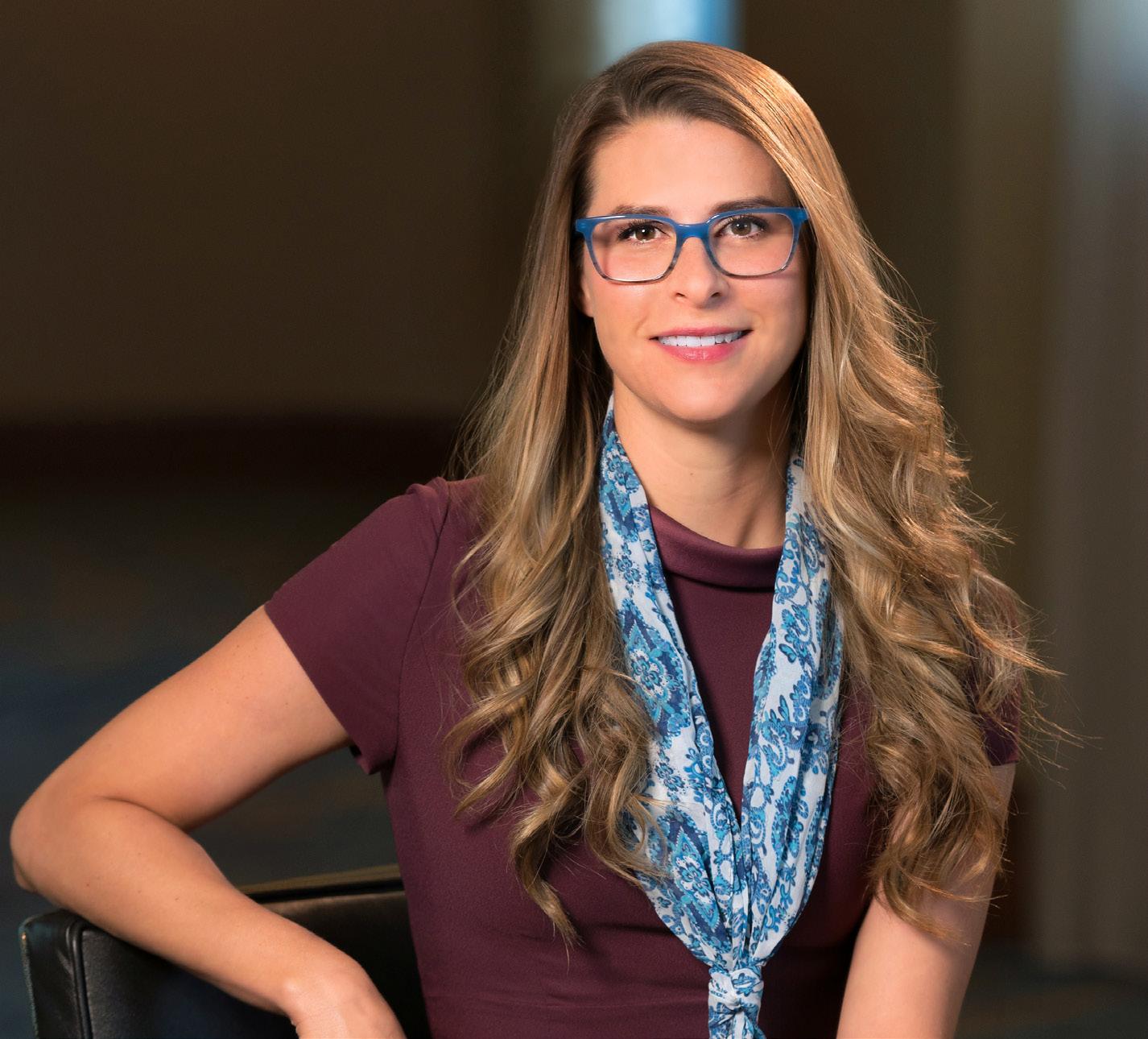
for not just me but for our entire company. He’s an excellent boss who is quick to recognize effort and shows all of our staff members his appreciation when he’s on property.”
Throughout her life, George has watched the industry modernize to enhance guest experiences. At Crescent, she says the greatest changes have been technological. “Our core pillars are exactly the same as they were when we began,” she says. “Crescent is still a people business and a shelter, but while the shelter itself has been impacted by design and technology elements, the people haven’t changed.”
At the core of Crescent’s mission is its commitment to its guests. Naturally, guest satisfaction starts with a groundwork of exceptional employees.
As George navigates her legal department as a team of one, she says she constantly keeps these pillars in mind, even though they are focused on hospitality, not law. Because the same values that reinforce problem-solving shine throughout the institution, George works interdepartmentally to ensure that her legal strategy aligns with every other operation to create impeccable customer experiences.
At Crescent, legal, human resources, and operations all work in tandem to ensure that the company functions with the utmost excellence with regard to internal and external staffing. “Our teams work extensively to make sure that we’re working with reputable companies that have extensive track records in the hospitality space and that we feel comfortable teaming up with,” she says. “In doing so, we’ve been able to uphold our standard of superior service.”
With the help of her team members, George invites rapidly changing technological solutions to stay updated on pressing issues that the company may face. George says that taking advantage of these big data solutions allows Crescent to stay ahead of any challenges or trends. In her role, George stays on top of market trends by looking at
how geographical changes affect Crescent’s brand locally. Using an interactive map of the United States, for example, George is able to discover information about different restrictions respective to cities in each state and adjust her tactics accordingly.
“Our goal is to be proactive,” she explains. “Our industry is always changing and moving forward, so it’s incredibly important to act progressive. Staying up-to-date with these solutions allows us to constantly stay informed so we can move away from the reactionary phase and issue-spot proactively.”
Crescent’s big data solutions have allowed the company to advance at the same capacity, as they have allowed its worldwide branches to work together by sharing tactics and experiences. By using weekly guest satisfaction surveys, Crescent compiles the feedback and shares it globally to see how other hotels and resorts create the ideal environment. The branches then use this feedback to enhance customer experiences. “We’re constantly striving to make our guests happy and comfortable in the hotels that we operate,” she says.
Over the past eighteen years, Crescent has increased its portfolio from five to one hundred, yet maintains its original grassroots mentality. As the company grows, George hopes to further drive this all-inclusive communication plan to keep up with its successes.
“We have a stronger core than we ever have at the corporate company level,” she illustrates. “We run our company sophisticatedly, but we still have the grassroots mentality that allows us to believe strongly in each other’s ability to be self-sufficient. It’s our hope that we use this strength to provide our guests and employees a positive experience.”
Bongiovi Law Firm sends a big shout-out to Caroline George—as a Vegas Born firm, we so admire your passion and commitment to the hospitality industry. It’s always a pleasure working with you and your team (and being entrusted to take some work off your plate).
Building a new arena is a landmark occasion for any sports organization, but in the case of the Golden State Warriors, it’s cause for a fundamental shift in organizational operations, an entirely new line of business, and a new home city across the Bay. The new $1.4 billion Chase Center, located in San Francisco proper, will supplant the Oakland-based Oracle Arena as the home of the Warriors, with room for more than 20 restaurant and retail locations, offices for Uber, 3.2 acres of public space, and a new 5.5-acre public waterfront park. Chase Center will also host nearly two hundred events a year, placing the organization in charge of a slew of new
contracts and requiring adaptability as now owners, not renters, of their new home base.
Ross Thompson joined Golden State as corporate controller in November 2017 as many within the organization, Thompson says, were already assuming what seemed like entire second jobs in helping prepare for the expansion (and move) of the company. It wasn’t the most expected move for Thompson, who says he had always assumed he would wind up a CFO at a software start-up. The move, though unexpected, was for good reason. In his last role, Thompson successfully aided software company Apttus in expanding rapidly from 200 to 1,200 employees and multiplying company revenue by ten. All of that growth in three years.
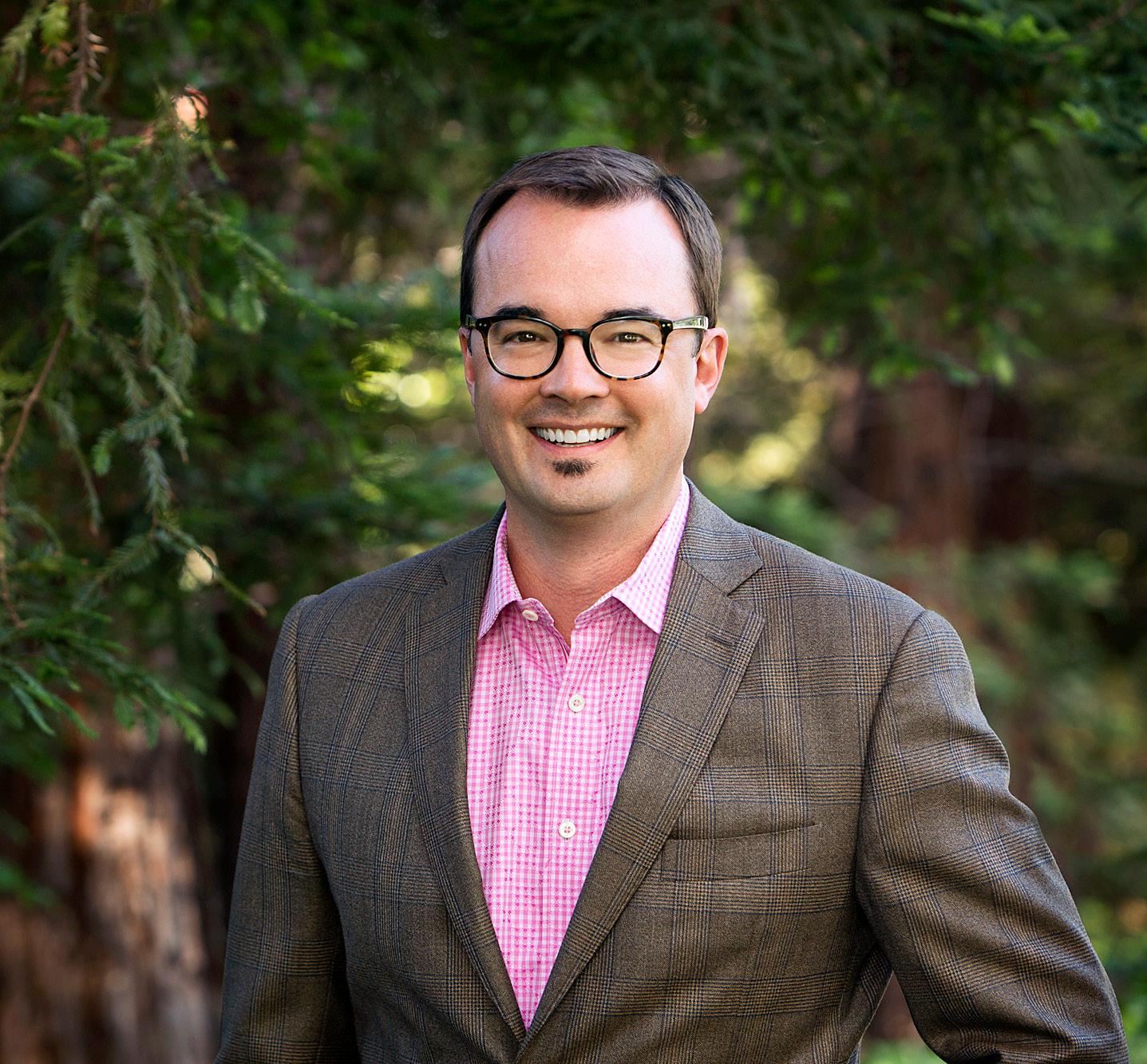
The lifelong basketball fan was tipped to the job opening by a former employee Thompson used to manage—“good manager karma,” as Thompson likes to say. “I didn’t initially think the job was for me,” the controller says. “But when I met with my boss and the organization, I realized it was clear they knew what they needed to do but weren’t entirely sure how they were going to do it. I think that’s what attracted me to the role.”
It’s perhaps an odd attraction when the selling point for the job could be the chance to join an organization that is in a period of success rarely seen in any sport, a sports dynasty comparable only to very few teams in professional sports history. But it’s what got Thompson through the door.

Thompson says he knew he would regret not joining Golden State at such a crucial point, not necessarily because of the team’s success but because of the construction of Chase Center. “This was a chance to be part of the team to help create and build something that is going to change the skyline of one of the most recognizable cities on the planet,” Thompson says.
One of the challenges the controller encountered upon taking the role was finding a way to help make his team more accountable. “The company had been very fortunate lately in that if they needed money to do something, the budget was ultimately there,” Thompson says. “When you’re building a billion-dollar-plus arena, most of those funds are already spoken for.”
It meant working to get his team on the same page regarding month-end calendars, reconciliations, and financial reporting as table stakes, then understanding cash flow metrics and being more accountable on reporting for operations like invoicing, receivables, and payables to help manage working capital.
The accountability initiative was part of a larger push to help make Thompson’s team more aware of their express responsibilities. “I didn’t have a whole lot to do in terms of the talent already here,” Thompson says. “But providing guidelines and structure around expectations and objectives was imperative.”
He is quick to say that most of the changes he brought weren’t uncommon for an expanding organization, but the benefit
of those measures is felt far and wide across the company.
As now building owners, Thompson’s team has helped implement new contract management and purchasing software to accommodate the influx of paperwork related to concerts events, like the grand opening of the arena featuring hometown superstars Metallica and the San Francisco Symphony.
“Obviously, every one of those shows will have a contract and will want to be paid. We needed to have approval workflow and a repository for a ‘one source of truth’ to reference quickly and efficiently,” Thompson says.
The move to San Francisco, Thompson says, provided its own challenges when it came to personnel. As Thompson looks across the bay from his Oakland office, he can see the new arena under construction.
“We understand that our employees are going to be facing a new normal on a daily basis in terms of getting to work,” Thompson says. “Over half of our employees live in the East Bay, so we need to be conscious of how they have to adapt.”
At press time, Chase Center was slated for a September 6 opening, and the controller was focused on the final push.
“We know there will be things that will need to be addressed once we see things in action; however, during this process we have been focused on the customer experience and we feel good with that as our North Star,” Thompson says. “I think we’ll all look back and say we’re proud to be part of this experience.”
“This was a chance to be part of the team to help create and build something that is going to change the skyline of one of the most recognizable cities on the planet.”
ROSS THOMPSON












With more than twenty-five years of business experience and thirteen years of experience in leading human resources teams, Imtiaz Shaikh discovered that HR, though focusing on the human aspects of a company, was like many operational departments: data driven.
“I found that data is the foundation for building HR credibility within the business,” he explains. “In human resources, you are dealing with people and emotion, so there are a lot of gray areas. But data removes potential
biases from the equation, allowing us to analyze and focus on the most important and impactful course of action.”
Using data to highlight the needs of a business enables Shaikh and his team of HR professionals at Hitachi Consulting Corporation to demonstrate and measure the value HR brings to the company. When Shaikh started at Hitachi, his goal was to leverage technology to create efficiencies that would enable HR professionals to focus on more value-added work.
He wanted to assess where employees spent the most time and found that, overwhelmingly, people spent most of their time caught in the administrative function of HR. Immediately, Shaikh recognized a need to
digitalize, modernize, and rebrand HR as more than an administrative power.
For workforce planning, Shaikh's team sought to find areas where recruiters were spending more time than needed on activities other than talking with candidates. “We wanted to take those factors out so we could prioritize their work,” he explains.
They also looked at how well the business could “forecast the demand of the people” and how that interplayed with the forecast of the business. “We aligned our higher-end talent acquisition functions to be nimbler in terms of meeting those demands." Internally, the team also took the time to assess where it could leverage talent from any region in the world.
Imtiaz Shaikh’s data-driven approach to HR has enabled Hitachi Consulting to progress to new heights as it moves the department beyond its administrative function
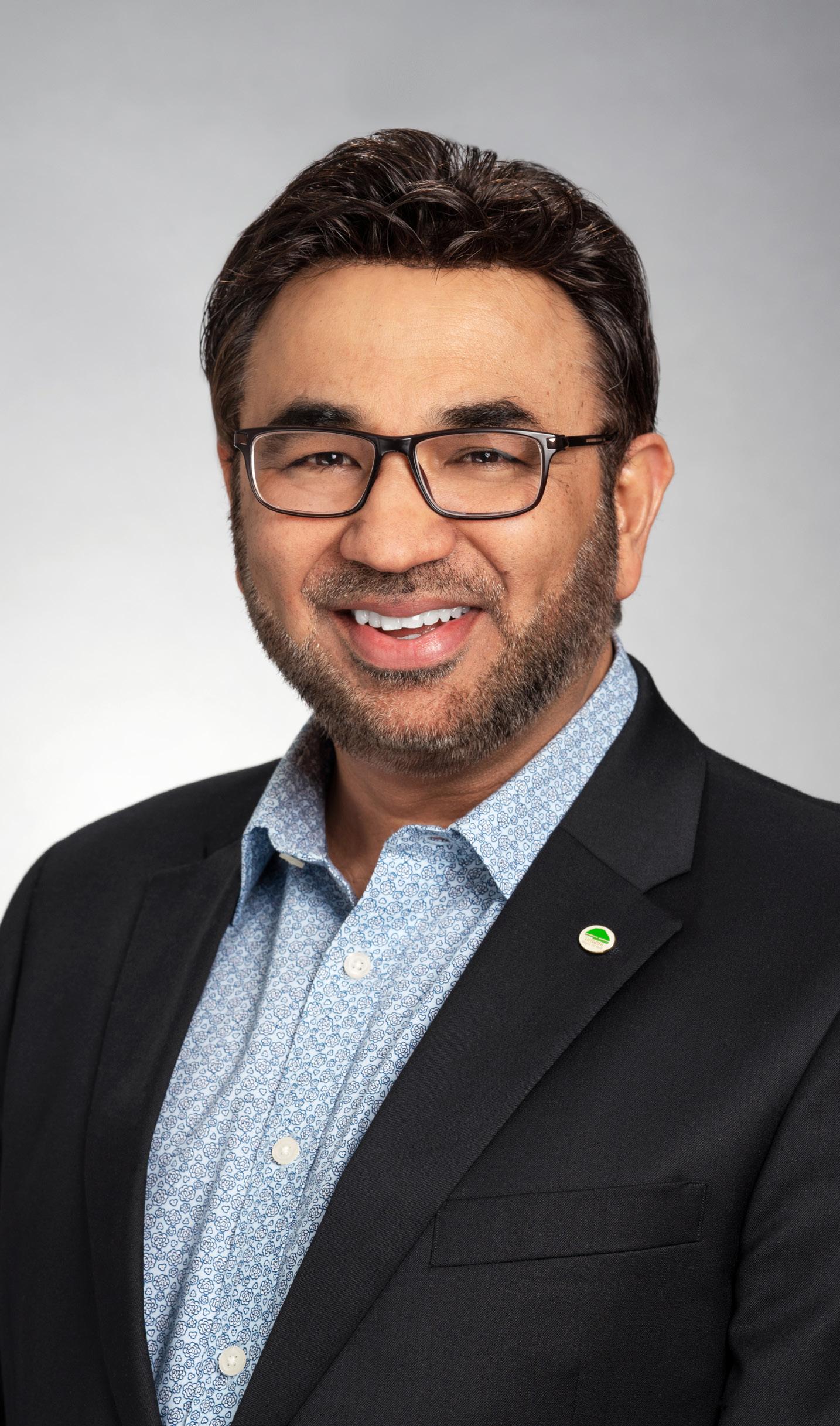
Now, by utilizing the support of its talent within its delivery centers in India and Vietnam, Hitachi can distribute certain work based on skills, allowing recruiters to focus on recruiting faster, more accurately, and more efficiently. Naturally, the modernization of the HR department warranted a simultaneous progression of globalization processes and technology. In turn, Shaikh's next step was to create a platform where his team could synthesize information arriving through various media, allowing them to respond more quickly to the needs of Hitachi Consulting’s employees.
“We were overwhelmed by different ways we were receiving information through aliases and mailboxes,” Shaikh says. “So we introduced a service management tool that could track different types of requests that we receive from our people. Now, the HR team has a better view of repetitive needs coming into the business and can automate these requests using technology."
Shaikh says that the service management tool, branded "Ask HR," allows his team to leverage the new generation of technology in ways that provide value to the company. The team is even introducing a chatbot to the
program, created by its own delivery centers, that will address frequently asked questions, whom to contact, and policies.
Shaikh’s holistic, pragmatic approach to the new wave of HR has made him a catalyst for change inside Hitachi Consulting. He initiated a departure from the company’s previous performance-management practices, re-focusing efforts to closer attention to performance and development opportunities for employees.
In many ways, data has allowed Shaikh’s team to attract and bolster human capital more than ever before. While these transformations take time, Shaikh acknowledges the progress that Hitachi Consulting has made during his current assignment over the last three years can be attributed to the company’s “hunger for change.”
“Fundamentally, there is always a better way of doing work,” Shaikh expresses. "Using data, we were able to do things differently and become more credible and relevant to the business.”
He continues, “Overall, our goal is to be better today than we were yesterday while making greater contributions to Hitachi.”
“In human resources, you are dealing with people and emotion, so there are a lot of gray areas. But data removes potential biases from the equation, allowing us to analyze and focus on the most important and impactful course of action.”
IMTIAZ SHAIKH
 By BILLY YOST Photos by GILLIAN FRY
By BILLY YOST Photos by GILLIAN FRY
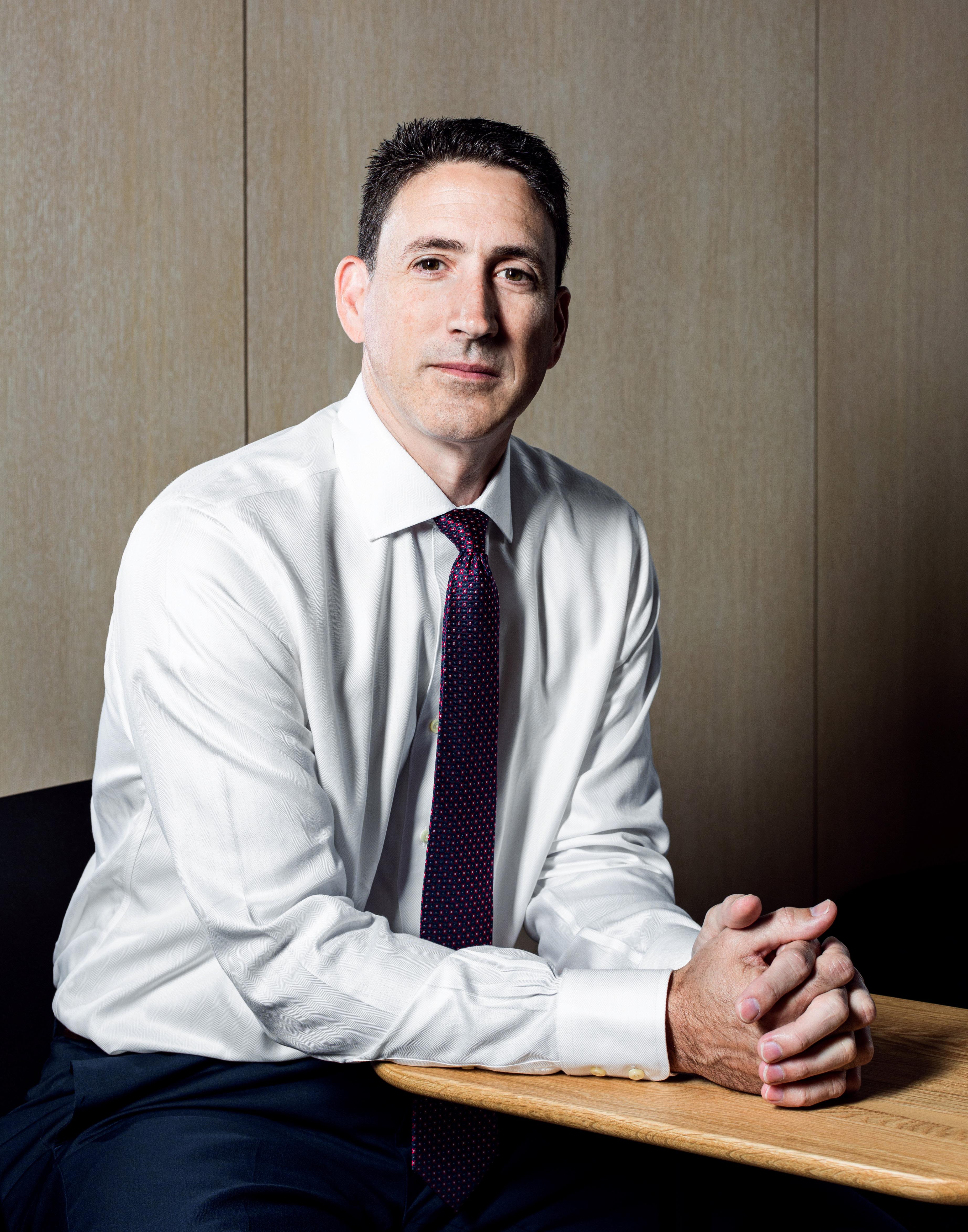 Lance Taylor Partner and CFO HGGC
Lance Taylor Partner and CFO HGGC
In a previous position, Lance Taylor had made peace with the fact that his office was the kind where people essentially showed up, shut their doors, and went to work. “Everyone was great, but the environment was very isolated, and that’s not how I prefer to work.”
After spending a couple hours on the phone with HGGC partner Les Brown and coming to the office in person, Taylor became convinced that HGGC’s collaboration-centered foundation would give it an edge in a market where interoffice competition can sometimes throw up unnecessary barriers and take a toll on company culture. “I was willing to take a bet and join HGGC, because it was the promise of something different and exciting.”
Lance continues to build out a top-notch finance team that can accommodate the expansion of HGGC while also helping usher in a new partnership with Dyal Capital Partners to continue HGGC’s growth and offer the firm a suite of value-added services.
Taylor says HGGC’s success, as well as his own since taking on the CFO position in 2014, is in the equity firm’s fundamental premise. “We don’t have any fiefdoms,” Taylor says. “We throw all of our relationships into the middle of the firm, collaborate, and work as a team internally.”
He says he’s routinely brought in on deal teams through an organic process that seems genuinely unique for a firm of HGGC’s stature. The company mind-set is much more grounded in group accomplishment. “We eliminated the expectation that a rogue individual is going to succeed here,” Taylor says. “You have to be a team player to fit into our culture.”
The company culture is guarded so heavily that Taylor and his colleagues went through an eight-month process to make sure a new hire would be a good cultural fit for the firm, even though he was business school classmates with someone already at HGGC. “We don’t want to mess up the environment we’ve created here, because we think it’s pretty special,” Taylor says.
HGGC has good reason to guard its process. The firm has more than $4.3 billion in cumulative capital commitments from investors around the world. The growth has required the firm to think strategically about leveraging its third-party relationships. “There’s only so much that you can accomplish with your internal expertise,” Taylor says.
During its last round of fund-raising, the finance team made the decision to outsource its fund administration function. “They can
invest in the same technology, but they can throw hundreds of thousands, if not millions, into development to support their client base,” Taylor says. “There’s no way we could keep up that sort of capital expenditure pace.” It’s enabled HGGC to be more transparent with its limited partners through enhanced reporting while limiting the strain on the resources within the finance team.
Taylor says the finance team is also partnering with a third-party vendor for data analysis and management that includes a service offering to handle and help with the data input and management. “They’re the hamster in the cage running the wheel, and we don’t have to hire those additional people,” Taylor says. “It helps us leverage what we do.”
The company’s most recent and impactful partnership is HGGC taking on Dyal Capital Partners as a minority passive investor. The cash infusion is just a small part of what seems to be a prime partnership match.
“Dyal has a business services platform to assist HGGC in getting better at its own business and provides tools such as a purchase price platform that we can roll across our portfolio and acquire volume discounts on certain commodity pricing and products,” Taylor says. “They also give us access to a variety of experts as well as a network of limited partner relationships.”
With Dyal coming on board, it provided a wise time to reset the partnership group,

“You have to be a team player to fit into our culture.”
LANCE TAYLOR
and Taylor was promoted to partner. “It’s an opportunity to start thinking how I and my team can drive value in our firm,” Taylor says. “And how does that then parlay into our relationships with our limited partners and with our service providers.”
The rise in leadership has offered Taylor a more active role in these negotiations and says it allows him to free up the deal teams to spend time thinking about the actual business.
If Taylor seems intent on collaboration, it’s intentional. “I’ve always tried to buck the idea of that accountant with the green light shade in the back room crunching spreadsheets,” Taylor says.
Going back for his MBA at Duke University helped Taylor be seen more as a strategic thinker and less of a pure numbers man. And while working to enhance his finance team and serving as the firm’s CFO is still role number one, Taylor is helping set HGGC apart with a mind-set that the best outcomes mandate input from every side with his expanded role as a partner.
Aon is a leading global professional services firm providing a broad range of risk, retirement, and health solutions. Our 50,000 colleagues in 120 countries empower results for clients by using proprietary data and analytics to deliver insights that reduce volatility and improve performance. www.aon.com

Aon’s M&A and Transaction Solutions team is with you throughout the life of your deal – from structuring coverage that optimizes results on the front end, to helping you navigate claim negotiations and settlements on the back end – we pride ourselves on providing unparalleled service and advise, all on “deal time.”

We can help protect your investments from unknown risks using representations and warranties insurance and help you ring-fence potential tax risks through tax insurance. We can also help mitigate exposure to known issues and pending litigation through a suite of contingent liability solutions.
Each engagement is customized to fit the specific needs of individual clients.
Contact Information
William Schoenbach william.schoenbach@aon.com +1.212.441.1430









CHRO Steve Price discusses his commitment to building a unified company culture after Dell’s merger with EMC Corporation

 By KC ESPER
By KC ESPER
In September 2016, the merger between EMC Corporation and Dell was complete. It was the largest acquisition in the history of the technology industry, which made Dell Technologies the world’s largest privately held technology company.
And the leader in charge of seamlessly combining the two cultures was Steve Price, chief human resources officer. “As we became Dell Technologies, we were committed to having a unified company culture that defines expectations for how we work and how we lead,” he says. “We played a significant role in defining the culture we needed to succeed as a new company.”
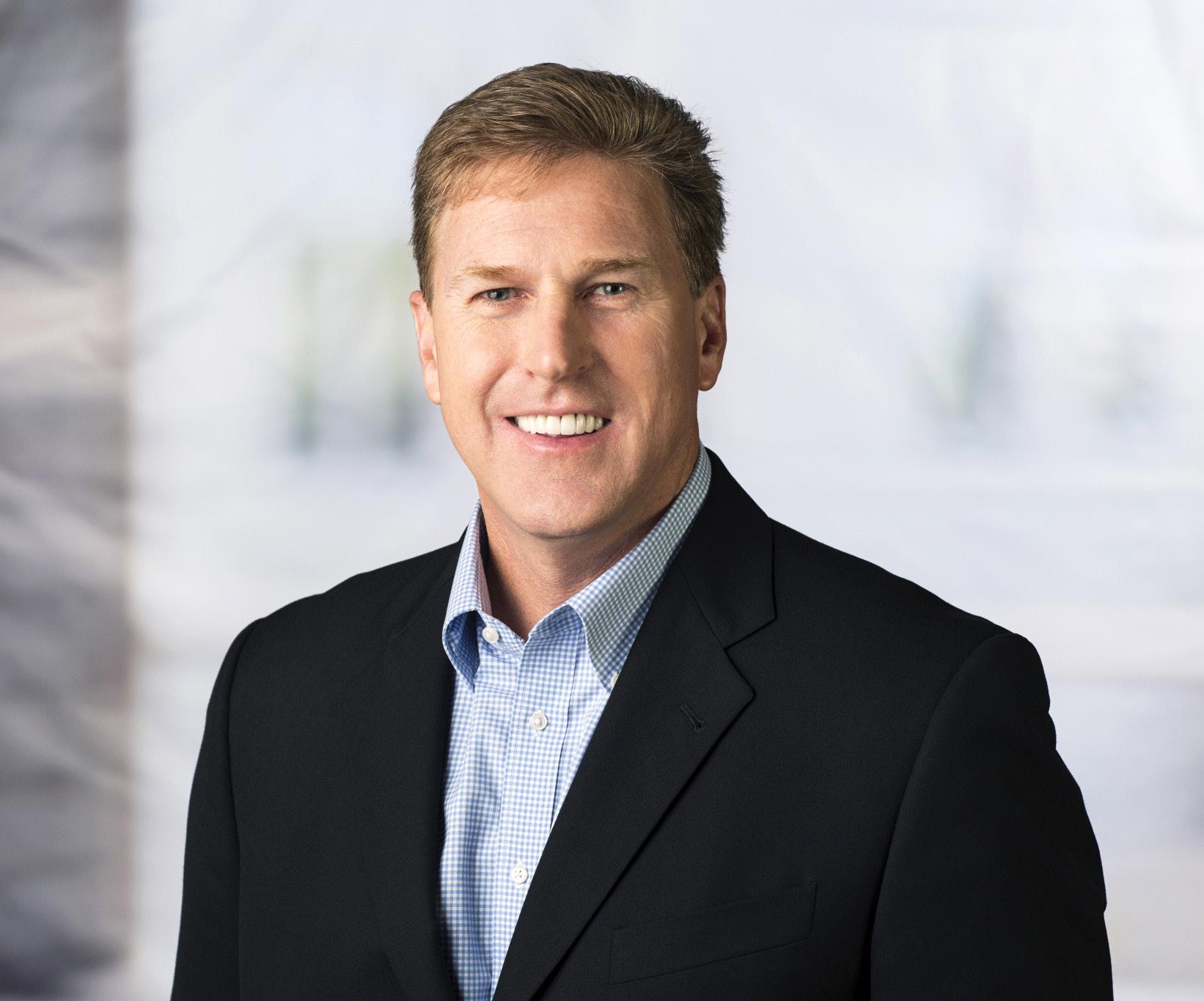
Price and his team conducted extensive empirical research and collected feedback from more than seventy-five thousand
employees at both companies to develop the new culture code. The code is a statement of the values and expectations for how Dell employees work and lead.
“We embedded the culture code into our entire ecosystem of HR practices, including hiring, development, engagement, performance, and rewards,” he explains. “We also led harmonization of all our HR-related technology, policies, practices, and ensuring the right talent and organizational design to best deliver on our strategy.”
To help create this new ecosystem, Price and his team turned to the Workhuman Cloud. “Dell Technologies’ investment in Workhuman Cloud, including social recognition and continuous performance management, puts the culture code into practice,” says Chris French, executive vice present of customer strategy at Workhuman (p. 106). “These human applications complement traditional HR technology and enable agile, cohesive teams.”
Courtesy of Dell TechnologiesPrice sat down with Profile magazine to discuss the new culture he built to reflect the united company.
How did the merger change the way you approach hiring, onboarding, and the continued support of employees?
As one of the world’s largest and most innovative technology companies, we have the full range of products, services, and solutions from consumers to large enterprises. Thus, the range of capabilities we bring into Dell is broader than it was before. It is a very exciting place to be, where team members know they are a part of a company with considerable opportunity for growth.
As an HR organization, we drive a number of transformation initiatives around culture, team member engagement, productivity, and business results. Digital and workforce transformation are the primary drivers of many of those efforts. It’s important to think about how people and machines should work together and how we can give our people the ability to do their work anytime, anywhere, and on any device.
The world of work is changing with the emergence of new technologies like artificial intelligence, machine learning, and robotic process automation. These technologies are changing how and where work gets done, they are changing the kinds of skills people need to possess, and they are shaping the expectations of the future workforce.
What were the greatest challenges in ensuring that the HR department reflected the new company culture?
It was about consistency and defining a new culture for our new company. We heard from more than seventy-five thousand team members around the world to shape our culture code, then viewed every HR practice through the lens of this new culture code and refined, improved, etc., based on that.
In fact, the two companies were so amazingly aligned that, while there was work to do, it was very evident what the North Star was. Out of two dozen cultural attributes that both companies incorporated, team members from both companies chose the
same top five as most important to our company’s success. These became our values in the culture code: customers, winning together, innovation, results, and integrity.
We know that driving human progress is not only good for our company, our customers, our communities, and our world, but that idea also extends to our team members and driving their progress, which we articulate in our people philosophy that clearly communicates our commitments to team members and is founded on three powerful propositions: achievement, balance, and connection.
A high-performing company must be committed to the individual achievements of all your team members, helping them balance the demands of life so that they can be their best both personally and professionally. We recognize that none of us grow and thrive alone; we all grow and thrive as we are connected in meaningful relationships.
As we look to the future, we’ll continue to create technologies that drive human progress and achieve our vision of becoming the essential infrastructure company. We’ll have an engaged workforce with inspired team members by activating our people philosophy for them.
To succeed, we know that companies need to be agile. Being agile is something our company has embraced over the years and has been essential to helping us react quickly and successfully to the emergence of new competitors, rapid advancements in technology, and sudden shifts in market conditions, especially in the new era of digital and workforce transformation.
Having an HR organization that is agile and focused on driving business transformation and performance is paramount for companies like ours to deliver on the promise of a digital future.
As we look to the future, it’s important to think about how people and machines will work together and to recognize that the workforce is transforming in their expectations, the technology they want and need on their jobs, and the desire for greater flexibility.
“It is a very exciting place to be where team members know they are a part of a company with considerable opportunity for growth.”
STEVE PRICE
JUST ADD GRATITUDE.
Feeling appreciated and connected are intrinsic human needs in life and at work. And the work part? We got it covered – for more than 4 million people around the world.
Our Workhuman® Cloud is the world’s fastest-growing integrated Social Recognition® and continuous performance management platform, connecting people to shared purpose through a consistent stream of gratitude and acknowledgment.

When people are empowered to recognize one another for the work they do every day – it motivates them to do the best work of their lives and builds trust in your brand.
All this, just by adding gratitude. Sounds like a no-brainer, right? Right. Learn more about Workhuman Cloud at www.workhuman.com.
32% more likely to perform at a higher level
73% more likely to go above & beyond
52% less likely to leave
Chris French wants you to experience the power of gratitude. He also wants to, as he says, “bring the human back into work.” Critical to this goal, he believes, is acknowledging human needs, such as environments where we are empowered, feel valued, and are free to create.
As executive vice president of customer strategy for Workhuman, French partners with CHROs and other company leaders to invest in building more human workplaces and fulfilling those needs.
He works to overcome a basic business problem. “HR tools are built to manage resources, not humans,” he explains. That is, tools are designed to try to get the most out of people, not to support people in giving their best. “The tools just look at meeting basic needs, like getting people a salary and maybe healthcare.”
However, he feels, as we move toward automation, it is critical to find methods to go further in the human layer for HR software, a category French calls “human applications.” “We need the human aspects most from people. Passion. Creativity. Agility,” French says. To give that, people need more nurturing, connected workplaces.
Through Workhuman’s cloud-based software, colleagues can recognize and acknowledge each other for great achievements and also key milestones at work and in life. “We use the full spectrum of feedback,” French says, “to create more trusting relationships where people can bring their best selves.” The goal is also to overcome an ingrained fear of feedback that many people have. Through solutions that allow people to celebrate and build stronger teams and connections, French and his team overcome the many forces aimed at tearing people apart. “Work can be a place to bring people back together,” he says.
Founded in 1999, Workhuman has grown at an impressive speed, now seeing more than 4 million people in 160 countries on Workhuman Cloud. The platform’s efficacy across the globe does not surprise French. Regardless of language and culture, he says, we are all human. “What we are doing appeals to basic human needs: social connection and knowing that what you do matters.”
This success—including such giants as LinkedIn, Cisco, Intuit, and The Hershey Company adapting the platform—also comes from French’s team making a serious investment in the internal process for each customer. The intent is to create a seamless experience from the first time that a customer hears about
Workhuman to ongoing, measured success. “We hold to the ideal that the customer and their outcomes come first,” he explains.
Also key to the process is Workhuman’s role as a superuser. The company’s five hundred employees—headquartered in Dublin, Ireland, and Framingham, Massachusetts, and working around the globe—are ground zero for testing. Staff also have an ongoing, tight connection with their product. The success of the company, as it racks up rewards for being a top workplace, is an example of what its products can do.
Through the Workhuman Analytics & Research Institute, French and his team have access to evidence-based, up-to-date research that enables the enhancement of tools, methodologies, and processes. While they scrape data and chart numbers, the overall goal is to enhance the human experience. For example, after analyzing communications between employees, Workhuman can identify trends and then have team members prepared for coaching employees around unbeneficial habits. “Workhuman is a full alignment of people, process, and technology,” French says.
French’s unbounded enthusiasm for his work comes from a deep belief in not only the mission but also the method at
Workhuman. He flies all over the world to talk to senior HR personnel as well as lead internal projects and innovation sessions around the benefits of creating a more human workplace. Building on a lifelong passion for using tech to solve business problems, French truly found his niche when he discovered social recognition platforms. The intent is to tie people together, and his method is positivity.

“If we can do this with the biggest companies and make this more human workspace, then we can do it with small places. Traditionally, large companies have led major shifts in what work looks like,” he says, referencing policies like paid family medical leave. This, for French, is the next generation: to treat people well, to have enabling tools so that people can work together, to support work through positivity, to secure privacy, and to ensure equity for all.
Since French joined the company in 2012, he’s been making these enhanced workplaces through systematic engagement. “This is the longest I’ve stayed in a job,” he says. “I am driven because of the opportunity ahead to reshape the future of work.” He is excited to continue his work, to find new partners that believe in creating a more supportive, and thus productive, work environment.
 By BILLY YOST
By BILLY YOST
It wasn’t until Alan Daines went into management that he started noticing peculiar changes around him.
“When you don’t manage people, you don’t appreciate what makes someone effective,” the senior vice president and chief information security officer at FactSet Research Systems says. “You may look around you and make judgments on people’s performance based on your own perception of their intellectual capacity or their technical expertise.”
But the first year that Daines turned into a leader, that all changed. In the leadership calibration process and examination of the way that other leaders approached their own team members, Daines says assumptions went right out the window.
“People I assumed would be rock stars on their teams were actually struggling,” Daines says. “Those who seemed average, at best, turned out to be rock stars.” It taught
Daines an enduring lesson: the smartest and the loudest aren’t always the most effective. And someone who has solved fifteen problems but not the single problem they were tasked to tackle is not an overachiever, Daines says. “You’ve actually failed.”
The SVP has spent his career helping build effective teams who take a proactive approach to cybersecurity, offering up far more than bare-bones risk mitigation. In coming to FactSet, Daines has been able to architect that building from square one.
The CISO’s most significant growth has come from his capacity to effectively accept and integrate feedback. “I’ve gotten some very good but very tough and constructive feedback many times in my career,” Daines admits. “I could have reacted in many different ways: fighting, resisting. But I looked at them as a way to make me better and improve.”
He admits that the emotional component of taking criticism can be a difficult one to navigate, but that upon reflection, resisting the urge to respond emotionally was always the best decision.
It was the same dedication to personal growth that led Daines to FactSet in 2018 after he had spent nearly twenty years in a multitude of roles at Dell. He had risen to the most senior cybersecurity position, amassed a number of accomplishments, and built the organization, which was up to 350 people when Daines departed Dell. “But,” he says, “I’d never built anything from scratch.”
At the C-suite level, Daines says the chance to have complete autonomy in building out a function was just too much to pass up. The forty-year-old financial and data company was flush with internal technical and security expertise, but it was siloed and unaligned.
“A reorganization was necessary, and the company needed to centralize and upscale their security,” Daines says of FactSet. “Our clients were developing a great expectation of a centralized security model, and the opportunity to build that with complete


autonomy and support from the organization was very attractive.”
Had Daines chosen to leave Dell any earlier, he says it might have been a much more daunting task. But Dell’s 2016 acquisition of EMC was a perfect primer for rebuilding a security organization. It included the stripping down of every function, the rebuilding of those functions, and the restructuring of the teams within those functions.
And it was more than EMC. Daines says the amount of transformation that occurred at Dell over nearly two decades made organizational effectiveness a point of passion for him. “That’s why in coming to FactSet, it’s really exciting to look at the business problems and see how security can potentially be the solution,” Daines says.
He says he understands many may see security as no more than a behind-the-scenes function whose sole capacity is just to make sure nothing breaks. “But FactSet’s clients are some of the biggest financial industries in the world,” Daines says. “We have the opportunity to differentiate ourselves by how we do security here.”


Daines says that one of the most interesting components of driving change at FactSet is the fact that the culture is so safety guarded. The CISO’s own interview process included two separate meetings with the CEO and countless other members of the organization to make sure an “industry hire” would be a good fit for a company whose leadership is primarily composed of people who started out in entry-level positions at FactSet decades ago. “My personality is highly collaborative, and I think that was part of my appeal to the company,” Daines says.
The leader says that in communicating the major challenges to tackle to stakeholders, he’s making sure that all parties understand progress is about the completion of agreed-upon initiatives. Going rogue just isn’t an option.
“I don’t care about the fifty other things you’re doing. These are the issues that matter,” Daines says. It’s the only issue where the CISO doesn’t welcome feedback.
Go


 Brian Mayhew
CFO
Brian Mayhew
CFO
 By BILLY YOST
By BILLY YOST
Brian Mayhew slings an upbeat fatalism that is rare for CFOs. “If I had known in 2001 what I would be facing in 2019, I really wouldn’t have done it,” he says with a laugh. “I would never have thought I was capable of doing this job.”
Mayhew isn’t speaking to a project or process, per se. He’s more speaking to the complexities of shepherding an organization whose revenue stream abruptly increased in the excess of billions of dollars, came to a near-halt during the Great Recession, and fired up again just in time to consolidate with an entirely separate agency. He’s also speaking of integrating numerous other agencies under the Metropolitan Transportation Commission (MTC), responsible for some of the
largest public works projects in California history, along with being the transportation planning, financing, and coordinating agency for the nine-county San Francisco Bay Area.
In all that Mayhew has accomplished in his more than twenty years at the MTC, he still somehow feels like he hasn’t done enough, because having a chance to really take stock would mean taking a minute to breathe, and there just hasn’t been enough time.
His staff, the CFO continually reasserts, has managed the difficult task of helping keep their boss from losing his mind. Some of those at MTC have been there for Mayhew’s entire tenure, perhaps a subtle tribute to leadership that the CFO may not boast about but was present all along the way.
In his time as CFO, he has seen exponential growth, including a capital expenditures
responsibility of $1 billion that ballooned to more than $16 billion. The treasury group, which initially included only Mayhew and now treasury director Susan Woo, now has two entire divisions dedicated to various parts of the function. “The growth here has required us to consistently rethink how we do things and grow and retool our departments,” Mayhew says. That’s a bit of an understatement.
The CFO describes the only point of calm in his twenty years as his early days. “I came here when we were just starting the point of transitioning into the sort of mega-agency we’ve become today,” Mayhew says. “I got to spend weeks designing some new systems and processes for our staff of twelve that were really cutting edge in 2002, with plenty of transition and training time.”
Everything Mayhew’s team has been able to accomplish in the subsequent years was built on the back of the same exact system, minus upgrades to keep it operational, that the CFO installed early on. “You want to look back and marvel at the changes that you’ve been able to make, but I have to admit, I’m sort of horrified at what we’ve had to go on. We have made some process improvements, but the technology is basically the same,” Mayhew laughs, adding that he is not only amazed at what they’ve been able to accomplish, but how they were able to find the time.
There were several contributing factors to MTC’s massive influx of capital and
expansion, which began when the agency took over finances for several of the area’s toll bridges. MTC had no expertise in managing the large cash operation, especially when it came to actually handling the money. “I wasn’t here yet, but I heard stories about staff going down to the local bank and depositing $99 million checks,” Mayhew says. “Ultimately, the bank had to build an entirely new vault just to handle our business.”
As toll revenue oversight increased, so did the number of grants that needed to be managed and maintained. The growing responsibilities meant adding more staff— Mayhew’s team has grown from twelve to forty—and continually absorbing new functions. “It’s sort of a situation where no good deed went unpunished,” Mayhew jokes. “People thought MTC did a good job and kept giving us more to do.”
Those responsibilities included a $1.5 billion voter-approved regional measure as well as taking over the stalled-out seismic retrofit program, including repair and replacement of the San Francisco–Oakland Bay Bridge, the largest public works project in California at that time. The MTC took over a construction program where politics and just about any other roadblock imaginable contributed to taking fifteen years and $12 billion to build the bridge. The Great Recession didn’t help, either.
“You have to look back to 2008, when absolutely everything was going wrong with
“The growth here has required us to consistently rethink how we do things and grow and retool our departments.”
BRIAN MAYHEW
the economy,” Mayhew says. “Despite the liquidity crisis, we didn’t hold up construction a single day; that’s the project I’ll always look back on and know we were both very lucky and very good.” Mayhew adds, again with a laugh, that he should have retired at that point.
MTC’s finance department’s postbridge plans to finally address its outdated financial systems were quickly put aside when, after extensive study and discussion, the decision was made to consolidate staff and operations with the Association of Bay Area Governments, which oversees housing and the region’s land use, as well as its Council of Governments, which represents the region’s cities and counties.
“We inherited an entire agency and didn’t miss a beat, staff got paid and checks went out, budgets were approved, and audits all got done for both agencies,” Mayhew says. “In the meantime, we didn’t give up our core mission. We also made progress on our allnew express lane program and have begun looking into all-electronic tolling as well.”
Mayhew says that a number of years ago, he tried to convince a colleague not to retire in the hopes that, finally, the MTC might have time to begin looking at overhauling its systems and return to some sense of “normal” that had never really set in.
“I saw her a few days ago, and I told her, ‘You were right; I lied.’ It just never got to be normal, but I’m so proud of everything we’ve been able to accomplish along the way.”
2001
• 12 staff
• $350 million budget
• Capital Project Responsibility: $1 billion
• No Bridge Oversight
2019
• 40 staff
• $2 billion budget
• Capital Project Responsibility: $16 billion
• Bridge Operation, Maintenance, and Oversight: $1+ billion

From structuring complex public and project finance deals to regulatory advice, our specialized, futurefocused legal solutions help business boom.
We congratulate Brian Mayhew of Metropolitan Transportation Commission on this well-deserved recognition and his dynamic career.
Nixon Peabody LLP is a twenty-first century law firm. We’re focused on what’s important to our clients now and in the future, so we can foresee opportunities and identify obstacles. Our holistic approach ensures that our clients have winning legal strategies to help navigate them through exciting and challenging times.
Each year, women are claiming their seat at the table. Sixteen motivating women share their

















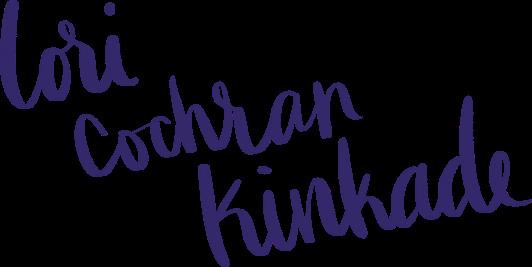



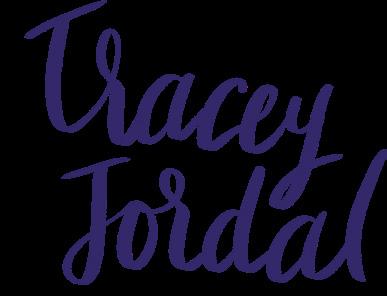





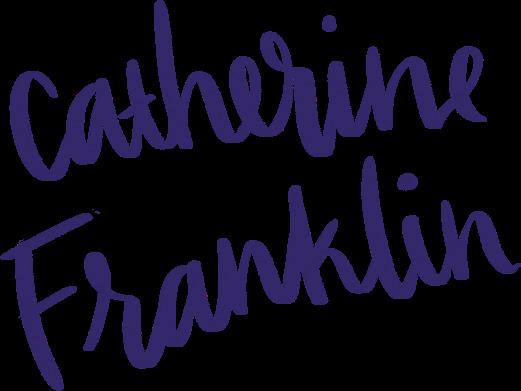
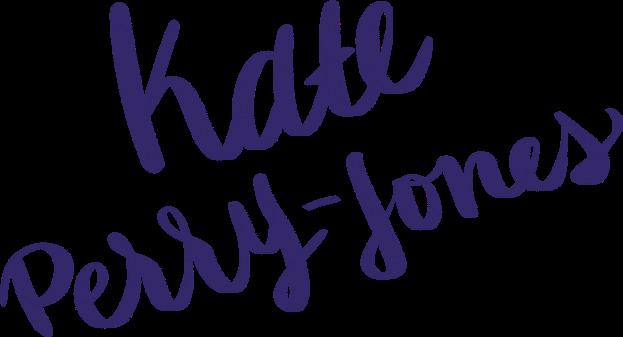
shares how she

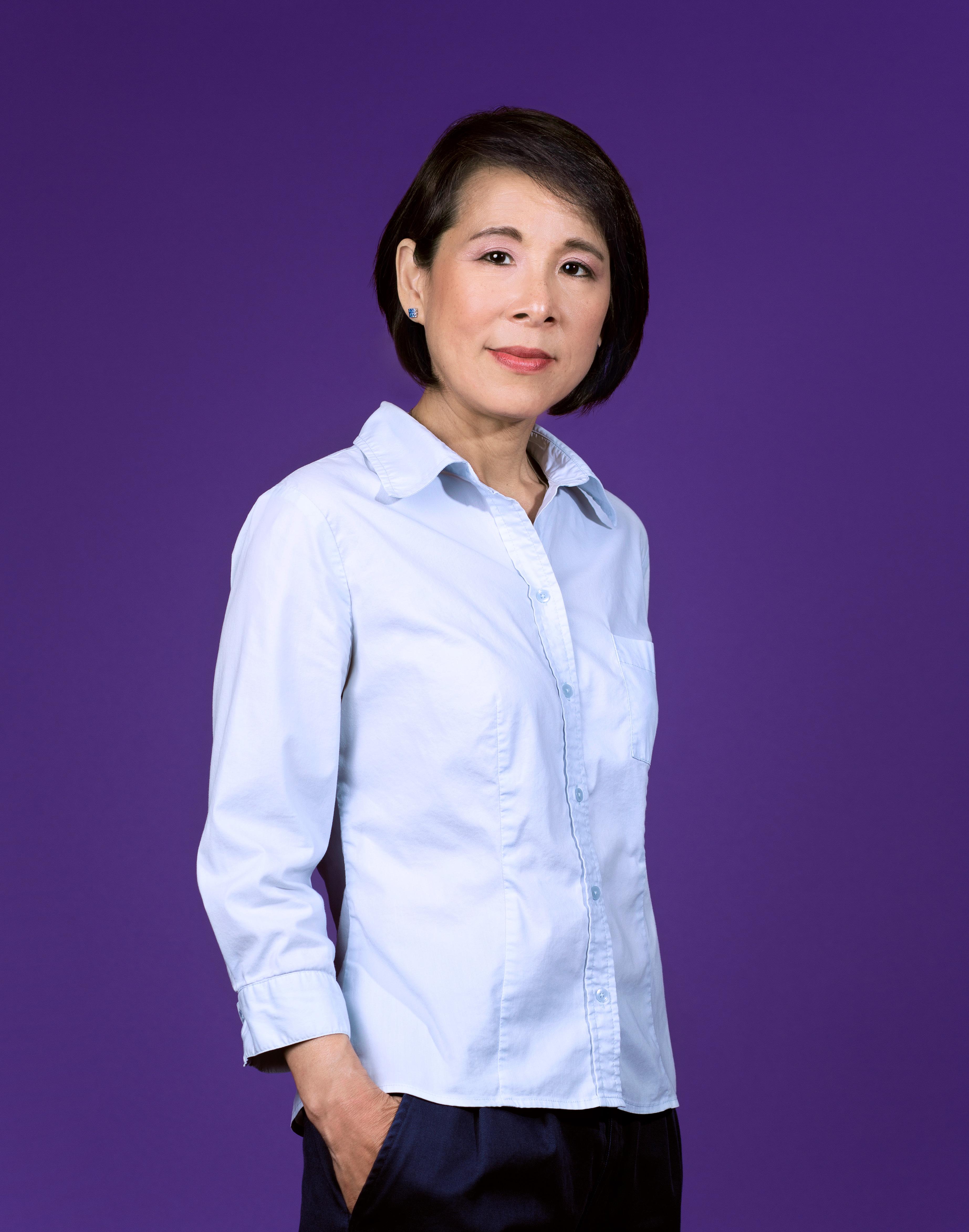 Esther Fan
Associate General Counsel Oracle
Esther Fan
Associate General Counsel Oracle
Based on the time it takes for the earth to rotate within a given time period , several centuries of human convention, and the inability for individuals to stay awake for more than a dozen or so hours without operating a severe handicap, the twentyfour-hour day is, at least for now, a given. And Esther Fan is using those twenty-four hours to the fullest.
Between her role as associate general counsel at Oracle and her pro bono work, there simply are not enough hours in the day to account for her passions: civil rights, women’s rights, victim’s rights, anti-human trafficking, children with disabilities, the homeless, and any other population who Fan says hasn’t had the same opportunities she’s had in the United States since emigrating from Taiwan at the age of twelve. When asked just how Fan is able to squeeze so much into any given day, she responds without a hint of laughter or jest. “The reality is I sleep very little, so I can get a lot done.”
Fan became the head of supply chain legal at Oracle in 2017. She says that Oracle has been a truly embracing institution, including letting her expand her team globally. “Not only do we have a fantastic team covering the globe, we leverage QuisLex as part of our team seamlessly helping us with many necessary but less complex legal tasks,” she says. “Together, we support our clients worldwide extremely effectively and efficiently.”
“Companies leverage QuisLex to efficiently complete legal work, driving tremendous

savings but also freeing up the in-house legal team to focus on the most strategic projects,” says Chase D’Agostino, associate vice president of corporation solutions at QuisLex. “It gives us great satisfaction to support Oracle and Esther’s organization over the past ten years.”
Her trial lawyer experience and many years of knowledge gained from working at hightech companies prepared Fan for her current role. “It helped me put things in perspective and in terms be more effective.”
In her day-to-day, Fan says she is privileged to be a member of Oracle Legal’s diversity and inclusion committee, meeting regularly to figure out how to make the multinational high-tech company an even more representative company for both its employees and customers. “Oracle is a great place to grow one’s career, and we want to make sure that everyone feels welcome to come here,”
“You don’t need to take two hours every week to volunteer, but if you see someone who needs help, give them the five minutes you have.”
Fan says. Oracle has continued widening its diversity and inclusion initiatives, placing more focus on including all voices.

At the end of the workday, Fan’s day has, more or less, just started anew. As a temporary judge in Santa Clara County Superior Court, Fan presides over traffic and small claims courts. From speeding tickets to “your apple tree dropped apples over my fence and I want the apple”-level disputes, Fan has been granted the power to settle the dispute, and she does it on a purely voluntary basis.

Many Bay Area high schools require students to take a living skills class that includes a module on social media and the law. The module is part of a program called Dignity in the Digital Age, which teaches the potentially harmful and life-altering effects of social media. “We share with high school students how posting is a double-edged sword with many unintended consequences,” Fan says. “Don’t be a bystander; be more conscious and conscientious of what you post.” Fan says that every time she presents, she is pleased at the students’ response and reconsideration of their own behavior.
Fan says she cares deeply about children of all ages and works to be an advocate for young people with special needs. The lawyer believes that despite students’ learning disabilities, every student can learn provided there is appropriate support in place. She works to help parents communicate their children’s needs to school districts and provide support for families that often feel like they have no outside help.
Helping people who seem to have no one else to turn to is Fan’s calling. She volunteers at Justice At Last, the only nonprofit law firm in the Bay Area exclusively serving the legal needs of survivors of human trafficking. The free legal service includes helping vacate the legal record of victims who might otherwise have to admit to criminal charges when applying for jobs. “They have had such a hard life already. This is a way to help them with starting over,” Fan says. She believes the organization is incredibly important because it serves victims on their own terms, and only when they are truly ready to move forward. As
What is the best advice you’ve been given?

When I was offered my first general counsel role many years ago, I was worried about not having all the answers. A wise friend who had many more years of experience practicing law than me said, “No one expects you to know everything. The key is to know your limit, know when to ask for help, and to not be afraid to say, ‘I don’t know but I will find out for you.’”
What is your advice for the next generation looking to make waves in their fields?
Do not be afraid. Always be open to try new things and embrace change; not only embrace it but seek and thrive on it. Through change, we can learn more about ourselves and expand our horizons.
Fan puts it succinctly: “If you need help, we are here to help.”
She realizes that not everyone has the time to commit to pro bono work on a regular basis, but that the everyday acts of kindness are what help define our humanity. “You don’t need to take two hours every week to go do volunteer work, but if you see someone who needs help, give them the five minutes you have,” Fan says.

Fan found time to raise two children, both of whom have followed in her footsteps of volunteerism. “They serve regularly through church and go on mission trips to help the less fortunate,” Fan relays. “It is very important to my husband and me that they become kind and considerate souls to lend a helping hand whenever and wherever.”
An immigrant who felt very privileged to practice law has spent decades giving back is able to rest for a minute or two, knowing that two more lives are dedicated to help the less fortunate.
Turnkey solutions for routine legal work
Tailored support for complex projects



Our Value
Integrated Technology
Fixed Fee Options
Reliable Timelines

































Consistent Results































































Easy Transitions
Our Expertise
Contracts
M&A Diligence
Compliance
Legal Operations
Document Review
Some of Lori Cochran Kinkade’s most profound learning experiences occurred early in her legal career, when she observed exactly how she wouldn’t choose to lead, if she were given the chance. The young lawyer spent her first three years out of law school in a large law firm and saw a cycle of management styles that didn’t appeal to her in the least.
“The partners believed that since they had ‘paid their dues’ working 24/7 as new attorneys in the firm, each class of new attorneys that joined our firm would have to do the same,” Kinkade says. “That attitude had a very big impact on me, and I realized that someone had to stop the cycle or it would just keep perpetuating itself.”
The now vice president, corporate counsel, and secretary at David’s Bridal Inc. says the fundamentals to her leadership are simple. “The bottom line is I lead by example and I don’t ask anyone to do something that I would not be absolutely willing to do myself,” Kinkade says. “That early experience really shaped the way I’ve viewed my in-house career as I moved out of the firm life.”
Kinkade has not only taken a more empathetic position in her own leadership but also has consistently demonstrated a willingness to step outside of her comfort zone and learn new facets of the business—a must for those going in-house, but not always with the zeal exhibited by the VP. By branching out, she has become a
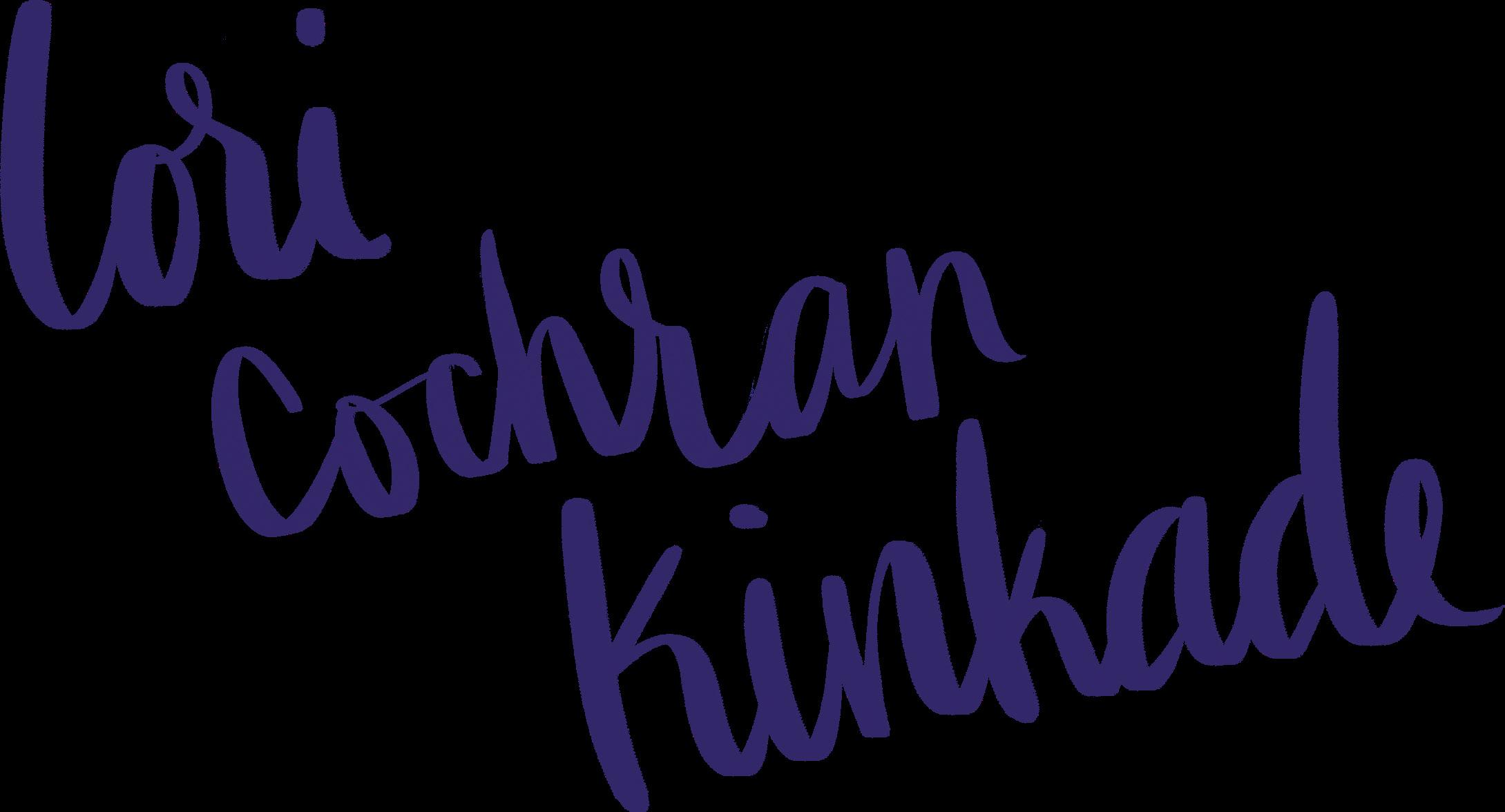
on growing in her in-house role at David’s Bridal and raising up those around her

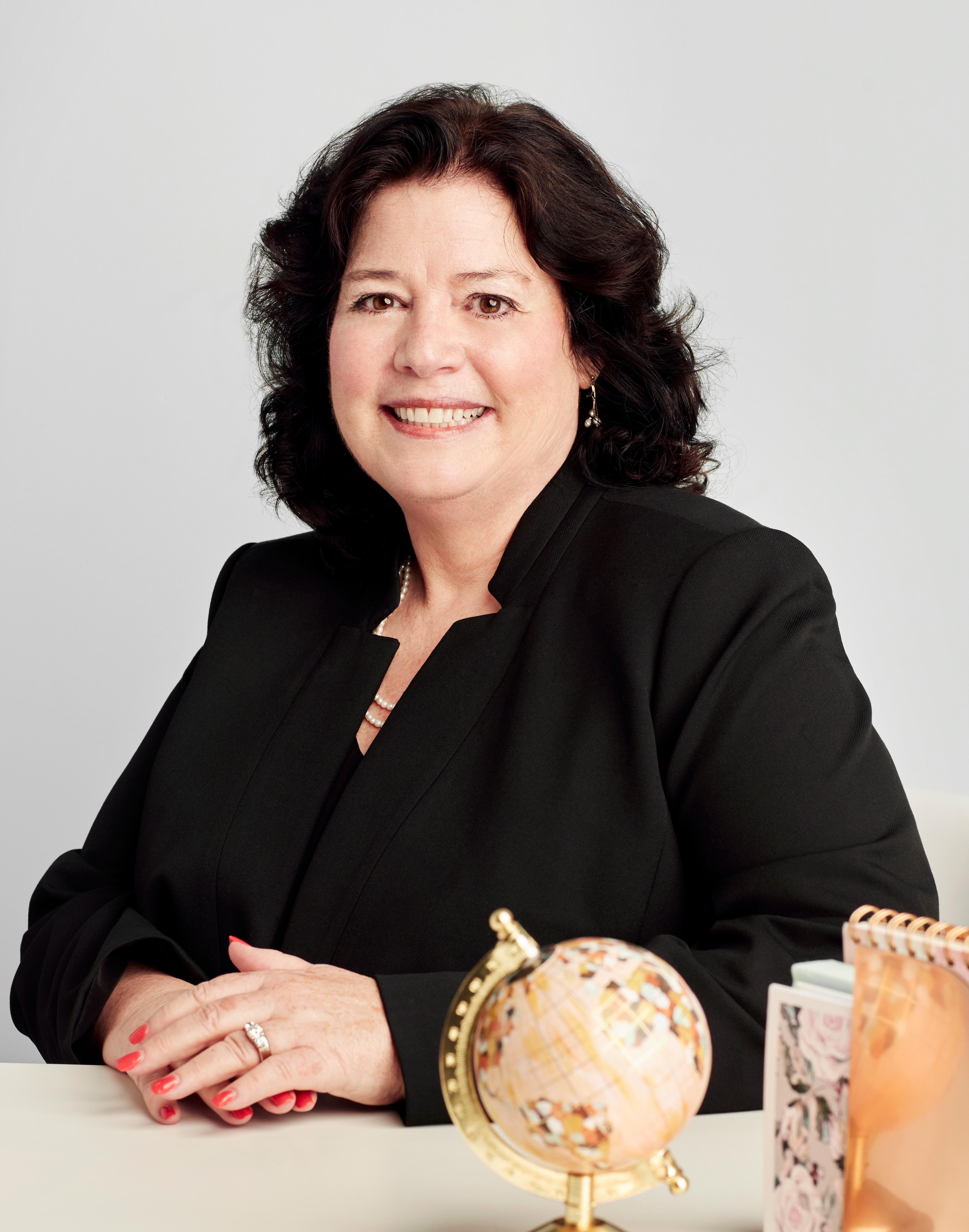 VP, Corporate Counsel, and Secretary
David’s Bridal Inc.
Juan Chami
VP, Corporate Counsel, and Secretary
David’s Bridal Inc.
Juan Chami

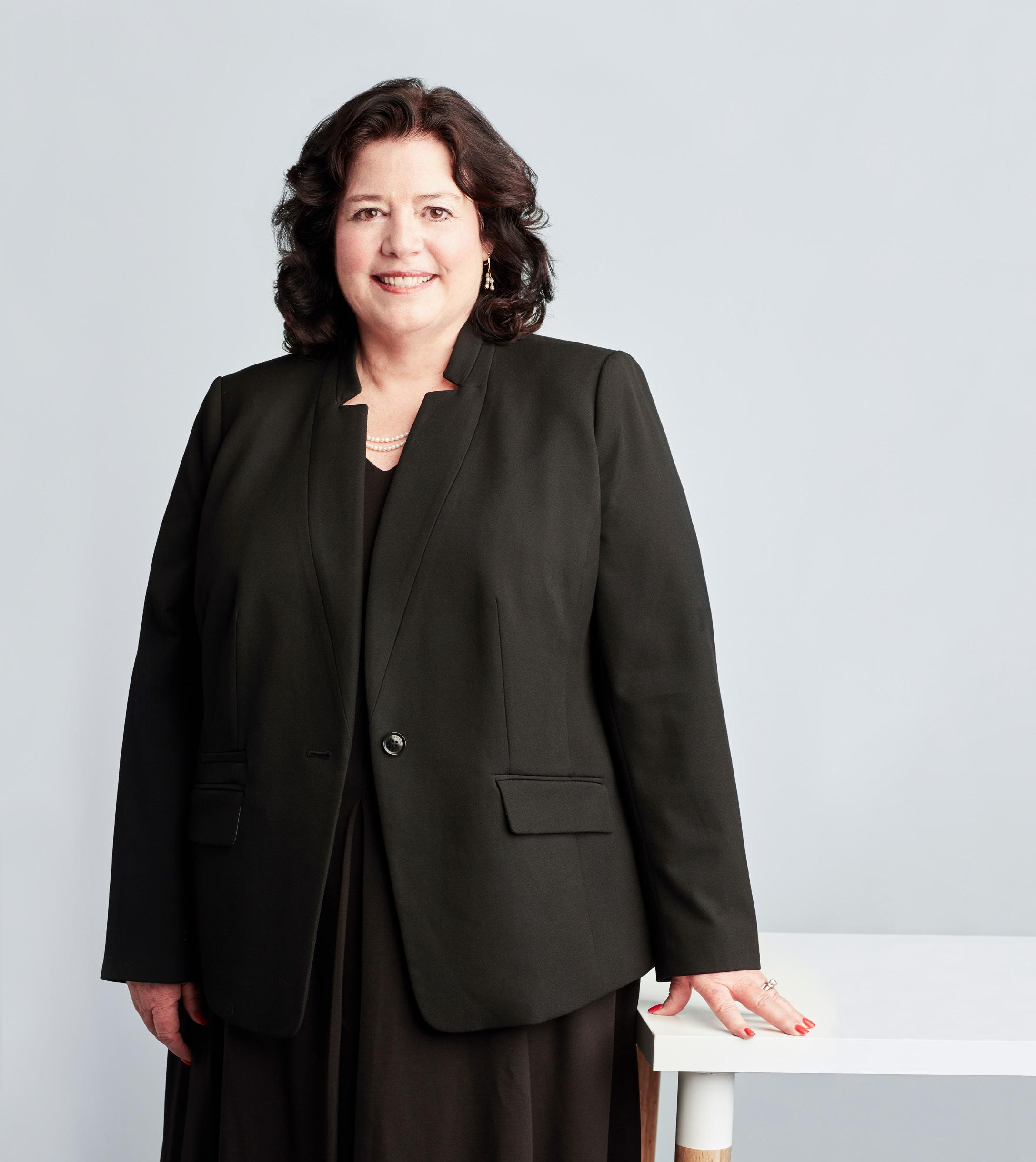


de facto expert in marketing and data privacy law and has supported the modernization of e-commerce efforts at David’s Bridal.
Before coming to David’s Bridal in 2007, Kinkade had accumulated nearly seventeen years of in-house experience for The May Department Stores Company as well as Macy’s/ Bloomingdale’s after May was purchased by Federated Department Stores (now Macy’s Inc.) in 2005. The lawyer was part of an unusual team within the legal department: an in-house litigation team responsible for the entire litigation process, from depositions to appeals. “We were true litigators in every sense of the word,” Kinkade says. “We weren’t stuck in an office telling outside attorneys what to do. We were trying cases.”
The lawyer’s knack for taking on unusual projects would continue upon her arrival at David’s Bridal. “When I first came here, we had just started growing our online business,” Kinkade says. “Initially, many members of our senior leadership team were convinced that no one would ever buy a bridal gown online. Nothing could have been further from the truth.”
Don’t forget the interdependence you have with the team of individuals that supported your journey to your leadership position. There is room for more than one person at the top and the same people that supported you on the way up will be an important part of your ability to stay there. One of my favorite books—Give and Take: Why Helping Others Drives Our Success by Adam Grant—sums it up beautifully: “A lot of people feel they’re diminished if there are too many names on a project, like everybody’s trying to share a dog bowl, but that’s not really the way it works. The thing about credit is that it’s not zero-sum. There’s room for everybody, and you’ll shine if other people are shining.”
Finally, self-deprecation is not a virtue. It often does not ring true when you do it and there are enough people out there who are willing to tear down your ideas, don’t give them ammunition. Take credit for your work, do not take credit for the work of others and use all criticism received as if it were given in the spirit of helping you to grow.
In her prior role at May Department Stores Company, Kinkade had worked with more than forty other lawyers with experience in all areas of the law. However, at David’s Bridal, she found herself and one other attorney responsible for advice and counsel for every area of the business and for any new, burgeoning projects that might spring up. “It quickly became clear that we did not have the expertise needed to provide the right advice for the e-commerce, data privacy, and marketing changes that were happening at the company,” Kinkade says.
The easy thing to do, she says, would have been to assume what many outside legal see as the “department of no” mentality and simply shoot down any prospective ideas that might place the company at prospective risk. But for Kinkade, easy was never even a possibility.
“I decided I was tired of being a ‘no’ person,” Kinkade says frankly. “I wanted my internal e-commerce and marketing clients to trust that I knew what they were talking about and that I would do everything I could to help them.”
The lawyer started attending seminars on data privacy, marketing, and e-commerce. She attended continuing education classes to learn

more. When it came to marketing classes, she often found herself the only lawyer in attendance. “I didn’t care because I was starting to learn what was really happening out there,” she says. “I was learning about these issues in real time with marketing professionals, so when our own marketing and e-commerce teams came to me and wanted to try something new, I was much more open to really exploring how we as a company could utilize these new technologies.”
In the process of broadening her legal (and nonlegal) horizons, Kinkade became involved with a number of organizations, such as the Global Retail Marketing Association (serving as an advisory board member) and Remodista, a social think tank examining global retail disruption (nominated as a 2016 “Women2Watch” in Retail Disruption.) Kinkade is quick to point out that she doesn’t know everything, but she says she now has a much better idea of where she can go for answers. “I don’t tell a client ‘no’ without doing absolutely everything I can to get to ‘yes,’” she says.
Kinkade says her growth has extended to building her own legal team at the company, and it is one of her proudest accomplishments. The two young lawyers she hired have become true ambassadors for the legal department as a whole. “Everyone genuinely seems to love working with them, and it’s not often that you hear about an in-house legal team inspiring affection,” Kinkade laughs.
The corporate counsel says that she takes mentoring those both in and outside of her department very seriously, as she was herself a
beneficiary of two female outside counsel mentors who wound up being incredibly important to her own legal approach at a time when she had no internal role models to go to. Kinkade has been the sounding board and mentor for many women looking to rise in their roles.
“I want to help women excel and grow in their positions,” Kinkade says. “It is easy to be discouraged and to simply stop trying to overcome challenges and reach your goals when you have no one from whom to learn.”
Kinkade’s willingness to make herself available to women at all levels of the organization just serves to underline the fact that she hasn’t forgotten those lessons from her law firm and early in-house days. She’s grown from them and helped others do the same.
Strategic. Innovative. Trusted partner. Lori Kinkade is all of these, and more.
Lathrop Gage LLP congratulates Lori Kinkade on twelve years of legal leadership at David’s Bridal and nearly three decades serving the retail industry. We salute your dedication to David’s Bridal and your countless contributions to your company’s success.
Michael Best congratulates our good friend Lori Kinkade on this well-deserved recognition. David’s Bridal is lucky to have her legal savvy and tireless dedication. We are proud to partner with Lori to protect and enforce David’s Bridal’s rights in a broad range of areas, including intellectual property, privacy, and advertising law.

Jackson Lewis Proudly Supports Lori Cochran
Kinkade, David’s Bridal Vice President, Corporate Counsel & Secretary, as she is a valued client and partner who consistently raises the bar of excellence.
We extend our congratulations to Lori for this well-deserved honor.
If you ask Anna-Lisa Corrales about why she’s excited to come to work every day, the answer is simple: there’s passion.

“We spend so much time at work and with our colleagues. So if we don’t tap into our passions and feel inspired while we’re there, then I don’t think we can truly be happy at work,” she says. “For me, I’m passionate about helping people and using my talents in the best way I can to contribute.”
Appropriately, the general counsel’s interest in cars helps inspire her work with Jaguar Land Rover’s products. “I was attracted to working here because of that passion people have for these brands and these beautiful cars,” Corrales says. “I work with people who are talented, who work together toward a common goal. And we
By KC Esperall use these talents to help the company do better and help our customers be happier.”
Another driving force for Corrales is supporting other women and minorities and encouraging respect for diverse perspectives. She hopes to inspire confidence in women to rise to executive positions both inside and outside Jaguar Land Rover, continually providing a voice for mothers balancing their lives and work and speaking at women’s conferences as an industry leader.
Her goal, she says, is to support all of her colleagues in being “successful in whatever it is that they do.” At Jaguar Land Rover, this support takes shape in myriad ways—flexibility, open communication, and embracing diversity. Since Corrales started building her team when she
took her position in 2008, she has embraced these guiding principles wholeheartedly.
When Corrales first arrived, she was a team of one. What’s more, she was Jaguar Land Rover’s only staffed lawyer in North America. While taking this position may seem like an intense feat, Corrales embraced the challenge with a strong drive to develop the legal function into an effective and efficient team. Eleven years later, she doesn’t regret her decision.
As she navigated the initial challenges of her position, Corrales quickly realized that she had to expand her department to keep up with the growth and complexity of the business. She has since learned that it pays off to take time to find the right fit with candidates, and she has chosen people who hold the kind of passion she had.
empowers her close-knit team at Jaguar Land Rover by providing the flexibility they need to thrive
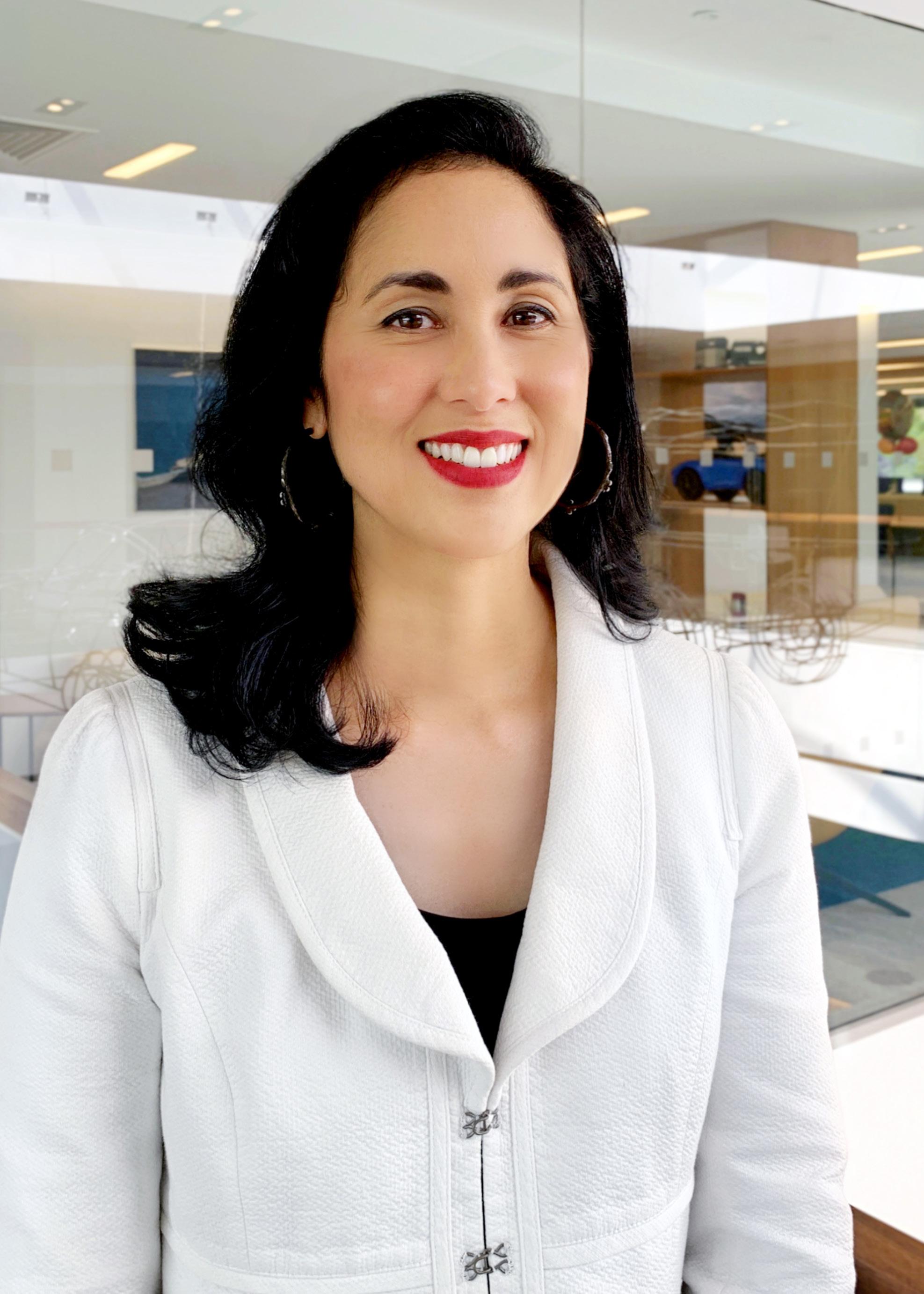

“If you support the people that you trust, who are hard workers and who appreciate the flexibility and autonomy given to them, they will not let you down.”
Anna-Lisa Corrales General Counsel Jaguar Land Rover
“I wanted people to be doing what they love to do and are good at doing while still covering the needs of the company,” Corrales explains. As new members joined, she ensured their duties matched their interests and talents. In doing so, she says that she found a way to retain and hire people who want to contribute to the company on a long-term basis.
“Getting the right fit of people on my team pays off for the long term,” Corrales says. “During the hiring process, it’s important to make sure the candidate really clicks with the position. Each person I hired brings so much to the table, and there’s so much I can learn from them.”
Now, Corrales quickly recognizes her team as her greatest asset and building her team’s expertise and processes as one of her greatest accomplishments. This experience has influenced Corrales’s leadership style immensely because it has taught her to harbor the talents of each team member and bolster them however she can.
“My leadership style has definitely evolved to be more in touch with communicating priorities and goals regularly without stifling someone’s problem-solving process,” Corrales explains. “I’m focused on making sure we have regular check-ins and being transparent so we can agree on goals and learn from each other.”
This transparency, Corrales says, also lies at the epicenter of her approach toward her fellow female and diverse colleagues. To her, open communication is key to allowing women to maintain the balance they need when juggling work, life, a family, and more. When looking back on her own career, Corrales reflects on the levels of flexibility she required in different phases of her children’s lives and is keen to understand the type of flexibility that will work best to keep her team happy and thriving.

“One of the most important things is to know how to model and be transparent about the kind of agility and flexibility that you need in order to make things work,” Corrales describes. “We each have a different set of circumstances that we need to balance with our work life, and it is important to recognize that there’s no one arrangement that works for every person.”
Through her approach, Corrales has noticed that the team she worked hard to build works hard for her in return. “If you support the people
To be a good listener, especially when dealing with a new area or issue, and to put myself in the shoes of my management to better understand the challenges they face.
that you trust, who are hard workers and who appreciate the flexibility and autonomy given to them, they will not let you down,” she says.
Corrales has fostered relationships with her female colleagues at the company to encourage them to take a seat at the table and voice their opinions. She has encouraged women throughout Jaguar Land Rover—both in and outside of leadership positions—to continuously contribute to the culture, to have their perspectives represented, and to take action. Corrales has taken part in Jaguar Land Rover’s diversity and inclusion committee, promoting education about different aspects of diversity. She also meets ad hoc with different groups to obtain a holistic picture of the organization’s culture at all levels and jointly innovate improvements to employee engagement.
As Corrales and her team move toward accomplishing their upcoming goals—particularly using new technologies and metrics to improve the legal department’s efficacy even more—she says she is proud to see that her team continues to adapt and support the company from a legal and regulatory perspective as the auto industry evolves.
“Everybody in this team is adding value to the company in many ways,” she says. “The feedback I’ve received from other departments is that the people on my team are really approachable, very knowledgeable, diligent, and responsive, and they’ve partnered with others to find solutions to mitigate legal risk. To me, that is the highest compliment.”
www.hoganlovells.com
Hogan Lovells is proud to celebrate the accomplishments of Anna-Lisa Corrales and her important work at Jaguar Land Rover.
lets her passion for learning guide her strategy at Finisar as she helps make the company safer, creative, and collaborative
By KC Esper

Shaila Ruparel’s mother is her biggest influencer and inspiration in life.
After escaping an abusive marriage in Kenya, her mother brought them to the United States to build a new life. Ruparel doesn’t remember her mother feeling hopeless because of the distressing circumstances. “We grew up laughing and smiling,” Ruparel says. “My mother never looked at the past as something that burdened her, but as an opportunity to grow and learn.”
For the rest of her life, Ruparel has held this lesson dear to her and allowed it to guide her throughout her career—just like her mother.
Ruparel was born in Nairobi, Kenya, in the third generation of her Hindu Indian family. Before she was born, her mother was arranged to be married to a seemingly ideal partner—a tall, attractive doctor from a good family. The moment they were engaged, however, the abuse started and persisted.
At the time, women in similar situations rarely had the option to simply leave the marriage. So, when Ruparel was born, her mother worried for her daughter’s safety. Luckily, Ruparel’s grandfather “had a little bit of money and was a little bit of a Western thinker,” she says. He knew a child couldn’t be raised in an abusive, discontented environment.
On the evening of her uncle’s wedding, her grandfather arranged for a car to take herself and her mother directly to the airport, offering her a new life in the United States. Once they arrived, her mother became an avid learner, an aspiring educator, and was eventually offered a teaching position in Kentucky, where Ruparel spent some of her favorite childhood years surrounded by a new family of friends and neighbors.
Then, when she was thirteen, her mother explored a different path. She took her CPA

One of the most fulfilling parts of my career, to date, has been the opportunity to handle such a myriad of issues. While the bread and butter of my work are commercial agreements, I have developed a certain expertise in intellectual property matters, executive compensation/ employee benefits, labor matters, etc. Knowing that every day brings a new challenge motivates me to keep learning and to help the company find the right balance between the business and the legal risks/exposure.
exam and applied to KPMG in San Francisco, moving the mother-daughter duo to the West Coast, where Ruparel stayed to earn her bachelor’s degree in political science from UC Berkeley.
Ruparel, equipped with a similar passion for learning, took any opportunity to gain more experience in the industry of policy, law, and politics. She took time during her summers at UC Berkeley to gain real-life experience in the field, attending an exchange program at Oxford University, and even working as an intern in the White House during the Clinton administration as part of a domestic policy group.
“My internship was just an incredible experience,” she says. “It lit my fire for politics and made me want to come back to California to do the same kind of work I was doing in DC. I had this passion for politics and policy and wanted to help the underdog and do good for the world.”
And she did, through the yearlong California Executive Fellowship program. Ruparel, appointed by Governor Pete Wilson, worked at the Department of Health Services to create a health insurance program for the children of low-incoming working families.
Maschoff BrennanAfter attending Vanderbilt University Law School and working as an associate for a couple large Silicon Valley law firms, Ruparel expanded her experience and knowledge of the industry before taking her expertise in-house.
Nearly fourteen years ago, Ruparel landed her current position as associate general counsel for Finisar Corporation, a global leading supplier of optical communication products. She carried the same craving to learn in all aspects of the business. Throughout her career, she’s helped in transactions with complex issues, helping her adapt her problem-solving methods to better serve Finisar’s employees, suppliers, and customers.
“I’ve had the opportunity to touch upon every subject that faces a corporation,” Ruparel explains. “I’ve developed the intuition to recognize red flags and know when to get outside help. While the bread and butter of my practice revolve around commercial agreements, every day I’m touching upon intellectual property questions, employment issues, executive compensation benefits, and corporate social responsibility
policies. I’ve really expanded my growth and opportunity in the practice.”


Recently, Ruparel used her expertise to address questions and issues with matters focused on privacy. Over the past few years, she created a comprehensive global data privacy program that helps the company define privacy and how to go about protecting information. Stemming from the fact that the General Data Protection Regulation (GDPR) has a very broad definition around what is considered personal information, Ruparel was tasked with solidifying where personal data is captured globally at Finisar, assessing how it is shared or transmitted, and informing each branch about best procedures moving forward.
“We used questionnaires to see how data flows throughout the organization,” Ruparel explains. “We had to make sure employee information was compliant with the law, which required cross-functional planning between groups. So, IT and legal worked with every branch of Finisar across the world to educate employees about the law and how to collect business processes. It’s an ongoing program that will continue to grow and hopefully become more robust over time.”
Unsurprisingly, Ruparel identifies strategy work as one of her strong suits, making this data privacy project among the most fulfilling aspects of her job. While she enjoys having the freedom to solve big challenges, she’s constantly grateful to have strong mentors working symbiotically with her, helping each other thrive.
“I like being invited to the table to ask for advice and guidance,” Ruparel says. “I’m able to bring the legal knowledge or framework to a business decision, and I can look beyond the law to see what the facts and circumstances are to determine what direction would be advisable.”
Both in and outside the office, Ruparel holds on to the lessons she learned from her greatest mentors, including her mother. “I am most grateful for the people who have guided me along the way because they often saw something in me before I saw it and they’ve created opportunities for me,” she says. “I am looking forward to be in a place where I can pay forward the time people have taken for me to eventually train the next generation of lawyers to be inventive, creative, valuable, and good global citizens.
Stanley Black & Decker combines generations of history in multiple legacy companies into a beloved and relied-upon Fortune 500 company. Its legacy and brand loyalty loom large, but organization leaders such as Kate Perry-Jones aren’t content to rest on those laurels.
As a vice president of human resources for Global Tools & Storage business, Perry-Jones ensures that Stanley Black & Decker remains at the cutting edge without sacrificing its history, ensuring the company’s place as an in-demand employer through efforts such as a women’s leadership program, global employee resource groups, and advanced diversity training. Throughout that scope, Perry-Jones has found that asking questions drives the work forward. “Rather than trying to be the one that
By Lior Phillipsknows everything, it’s a lot more empowering to ask questions that allows you to guide someone else in the right direction,” she says. “Sometimes we believe that we’re rewarded for all the things we know and do, and not necessarily for helping others unlock these amazing ideas or plans within their own world.
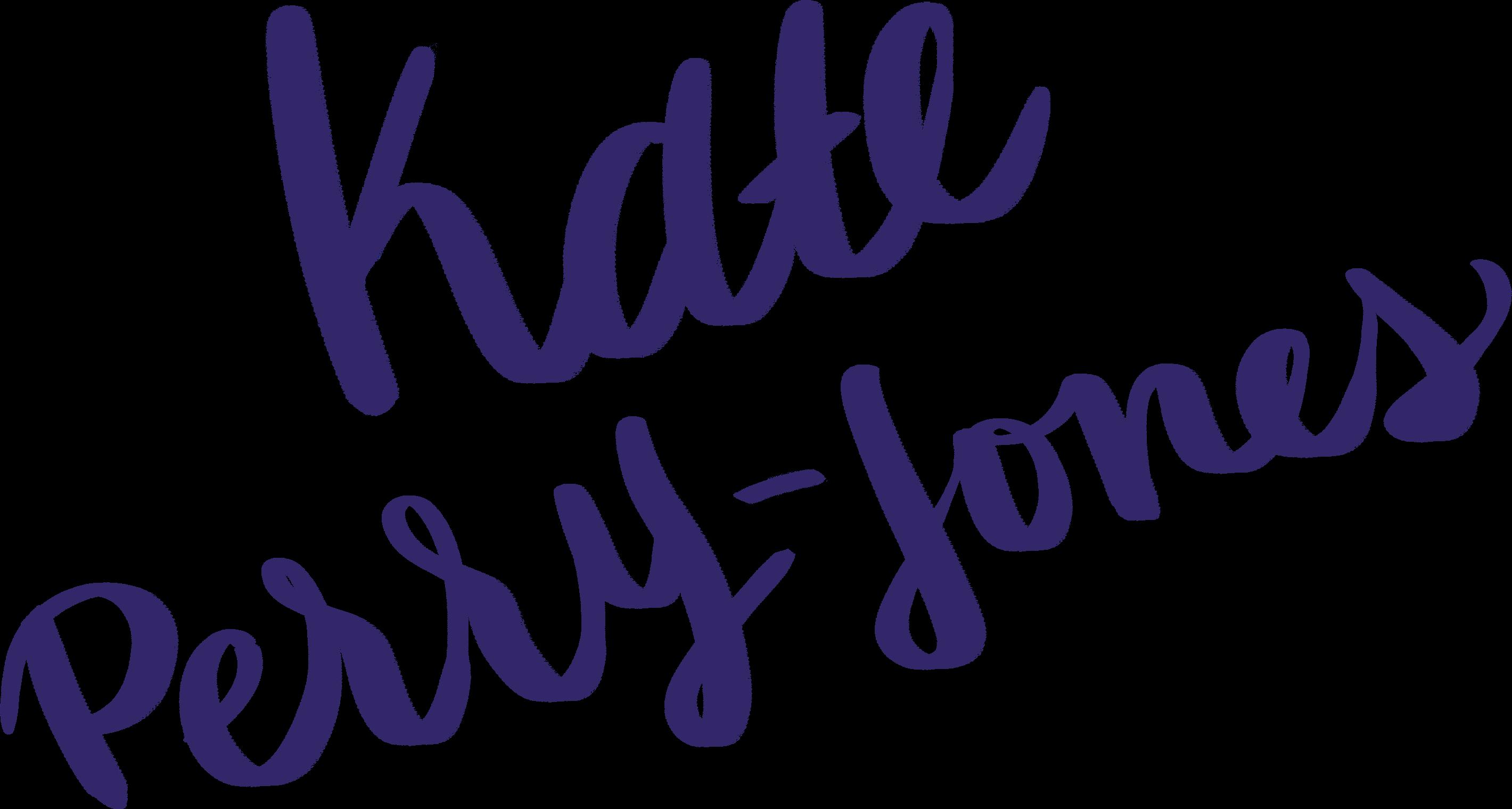
Throughout her career, Perry-Jones has honed the importance of always pushing for more information, asking one more question, and showing curiosity and an eagerness to listen—even as she’s become a more senior member of the organization. By doing so, she has found that she can better help both the organization and every employee.
That said, Perry-Jones has plenty of expertise of her own as well. In fact, she began her
HR career as an administrative assistant during her last year of college. After completing an undergraduate degree in psychology and a graduate degree in human resources at Rutgers University, she quickly moved up the HR ladder. She swiftly put into practice the lessons she’d learned about becoming a true business partner from the human resources office. It helped, of course, that her then employer, Chevron, was equally interested in getting that contribution.
“You can do HR anywhere, regardless of the industry, as long as you are partnered with a company that believes in HR as an enabler and a business partner,” Perry-Jones says. Her career includes stops in financial services, the oil industry, and now manufacturing, and her skill set continues to grow and further solidify.
helps lead Stanley Black & Decker and its employees toward a more diverse and inclusive future
HR manager in 2011. Moreover, the collaborative nature of the HR team at the organization held a lot of appeal.
“From my earliest roles, I worked a lot because I thought that was how I was going to achieve my goals and get to where I wanted to go,” she says. “But now I have the ability to leverage relationships and the strong team around me to ensure that we are all doing the work in the smartest, most efficient way.”
Beyond strengthening her own leadership skills, Perry-Jones’s work at Stanley Black & Decker enabled her to develop leadership skills in others. Beyond bringing the right people into the office in the first place, Perry-Jones sees her role as a unique opportunity to shape the way the entire organization works, helping unlock the best in the employees already at their desks.
That means, of course, that her job could change from moment to moment. “For example, am I here to be the subject-matter expert or am I here to coach folks to understand how to do something themselves?” she says. “I am not going to be the same type of leader in every situation, and being aware of that allows me to flex to whatever is being called for at that time.”
Lately, that flexing has been increasingly focused on initiatives aiming to boost diversity
and inclusion at Stanley Black & Decker. President and CEO Jim Loree has inspired that focus as a way to continue to evolve into the next century of the company’s history. PerryJones and the Global Tools & Storage HR team started a diversity advisory board in North America in 2015, and that project has since been modeled across other locations.
Globally, the focus on diversity and inclusion has centered on listening and asking questions, true to Perry-Jones’s form. “We wanted to hear it directly from employees instead of putting efforts in place that were not going to be leveraged,” she says.
In that time, they’ve also started nine employee resource groups, including a women's leadership program, which has since extended across all of Stanley Black & Decker. “By supporting employees and providing a framework of what these organizations should look like, we’ve really allowed people to organize and mobilize very quickly,” PerryJones says.
To accelerate female development at the director and vice president levels, PerryJones and her team partnered with Sherpa Executive Coaching to implement a threeday program where female leaders network, share experiences and best practices, receive coaching themselves, and eventually change the culture.
“People now have a voice to female advocates at the more senior levels,” she

“Every human is diverse in some way, but if we don't talk about those unique traits, then we also don't help people communicate effectively, and they can’t have a bigger impact on business and really get to a better solution.”
Coaching others. It is amazing to watch leaders get promoted and move into bigger roles after being coached. I have become a better leader and mother since learning to coach. Once you learn to coach instead of doing all the work, you are given the gift of time. Leaders as coaches can achieve so much and help shape the future of the workforce.
says. “These women were now connected to about forty more women leaders. This crossnetworking helps the individuals but also allows for much more connection between divisions.”


Other employee resource groups for working parents, the Latino community, the Asian heritage network, African ancestry communities, veterans, and more have been equally successful, spreading resources to those that need it most. Perry-Jones and her team have worked with these groups to push for further inclusion efforts as well, teaching the Stanley Black & Decker community that hiring a diverse workforce isn’t enough. By working through unconscious bias and embracing the unique traits of every worker, the entire organization benefits.

“Every human is diverse in some way, but if we don't talk about those unique traits, then we also don't help people communicate more effectively. The better the communication, the bigger the impact on business and the better the solutions,” Perry-Jones says. “Meeting people where they are with new tools can really make our inclusion and diversity function beneficial for the business and for the world in general. By conducting inclusion focus groups, we are truly teaching our leaders what inclusive leadership looks like.
“We’re asking them for one thing they can go back to their desk that day and do differently so that we can start to impact people at all levels within the organization.”
Kate Perry-Jones VP of HR Stanley Black & DeckerEight years into her role with the National Football League, Dolores DiBella, vice president of legal affairs, says she has yet to spend a workday watching the clock.
“When I meet junior attorneys who say every day at the office feels long, I encourage them to explore new opportunities because law is never supposed to feel that way,” DiBella says. “You know that you’re on the right path when every workday passes in the blink of an eye, and I certainly feel that way here at the NFL.”
Since her first day, the lawyer says the NFL has made extraordinary strides in consumer, brand, and content protection. Every year, news media coverage spotlights the league’s anticounterfeiting efforts and ironclad protection
over NFL trademarks, such as “Super Bowl,” that have become ubiquitous. Fourteen years into her legal career, DiBella says going in-house has been its own education, providing a foundation to branch out in almost any direction in the legal industry.

Prior to arriving at perhaps the most recognizable league in sports, DiBella spent more than five years at the New York firm Proskauer Rose. It was an invaluable experience that provided a solid bedrock of broad litigation skills as well as expertise in intellectual property (IP), entertainment, and media.
“Dolores’s legal and business acumen are top-notch,” says Elise Bloom, partner at Proskauer Rose. “She is a strategic thinker and
an indispensable, practical business partner. We are honored to work with her and her team at the NFL.”
And her mentors have helped her implement her experience regardless of her industry. “I’ve been quite fortunate to have mentors throughout my career who not only took the time to invest in my success but taught me to be the type of attorney who leads by example,” she says.
Her mentors showed her she could be a successful attorney who also maintained a work/ life balance. Those mentors, DiBella says, provided great guidance on career navigation no matter how different her next role might be. Case in point: moving to the sports industry.

In moving to the NFL, DiBella says the incredible opportunity also came with its own challenges. Her time at Proskauer hadn’t involved sports clients, and issues like anticounterfeiting and brand protection were new areas of practice for the young attorney.
“It required me to dive into a subject area where I had the underlying legal knowledge but still needed to develop the industry experience,” DiBella says. “I had to make immediate strides to learn about the league, the teams, and the industry.”
Anticounterfeiting and content protection have become standout areas of evolution for the NFL legal team. “I’m most passionate about the consumer, brand, and content protection areas of my IP portfolio,” DiBella says. “The NFL as an organization has been able to create many valuable partnerships and has proven itself a driving force from both a legal and policy perspective in anticounterfeiting and antipiracy initiatives.” Further, DiBella says every passing
year at the NFL has offered a new area of the law for her to delve into and learn about, even beyond IP and litigation—a welcome challenge for a lover of the law.
“Dolores is like a legal quarterback,” says Dale Cendali, partner at Kirkland & Ellis. “She is a true leader who mobilizes and instructs the team to fulfill the NFL’s objective. She is an expert in her field and is fun to work with.”
DiBella understands her position may be an enviable one for any sports enthusiast, which may make it more surprising to learn that traditional “fandom” did not weigh into her initial choice to come to the league. “It’s a much better idea to focus on finding the substantive area of law that you love first,” DiBella says. “Then you can focus on the industry where you want to practice.”
Many attorneys think that to work in sports, they have to work for a league or a team; nothing else will do, she says. But the number of legal careers in partner companies and agencies that cross the sports industry are limitless if you are looking through a wider lens. “It’s
great if you’re a fan and bring that excitement to your role,” DiBella advises, “but what matters more is having the substantive knowledge needed to get the job done.”
Early on at the NFL, DiBella’s boss was slated to speak on a panel about ambush marketing but was unable to make the engagement. DiBella had to step in—and quickly learned that she had a talent and passion for sharing her knowledge as well as learning from others in public speaking panels and industry presentations.
“I’ve gained some of my most valuable experience from joining panels and fireside chats,” DiBella says. “Often, I’ll speak alongside legal professionals outside sports that I wouldn’t have encountered in day-to-day work, and those opportunities are an impactful way to grow your networks and knowledge base.”
DiBella says that junior attorneys often feel like there is some prerequisite they need to achieve before agreeing to public speaking
“It’s great if you’re a [sports] fan and bring that e xcitement to your role, but what matters more is having the substantive knowledge needed to get the job done.”
What is your advice for the next generation looking to make waves in their fields?
Focus on finding an area of the law you love, and then it will be much easier to find opportunities to advance and excel. Choose a legal practice because you enjoy it, not because you think it’s a path to quick success.

We congratulate our client and friend, Dolores DiBella, Vice President, Legal Affairs, NFL, for her recognition in Profile.
We celebrate our clients’ successes as if they were our own.
V&E congratulates Dolores DiBella for her continued success in helping to make a positive impact in the NFL and legal profession.


engagements, but it’s simply not the case. “Don’t feel like you need to be a subject-matter expert on every topic before raising your hand to volunteer for speaking opportunities; everyone in the legal profession has valuable insights someone else wants to hear,” DiBella says. “While you of course need to be prepared on the topic at hand, the best advice I can give is to just jump in.”
DiBella has spoken on a range of issues, including IP, employment law, litigation, and career development. At the time of the interview, she had just spoken at Georgetown University’s Annual Women’s Forum on a panel for students and alumnae interested in pursuing careers in sports.
“As I’ve moved further along in my career, I’ve taken the opportunity to coach law students and junior practitioners in various settings and mentoring relationships,” DiBella says. “I know how much I’ve benefited from the guidance of senior lawyers over the years, and passing along advice to rising attorneys is the best way to pay it forward.”










work to develop young talent and collaborate for the good of the business at PIMCO
Right out of law school, I clerked for a federal judge in Manhattan. I watched fairly young female prosecutors try cases all by themselves, going toe-to-toe with much more experienced male defense attorneys. It was awe-inspiring. I knew it was what I wanted to do from that moment on.
Four of PIMCO’s most senior legal executives found their way to the asset management firm in ways as diverse as the careers they represent. From private practice to increasingly complex in-house capacities to regulatory enforcement, these four women in PIMCO’s law department have helped define a nurturing and welcoming place for developing talent as well as a gold mine of collective legal experience all over the map.
Managing director and global head of regulatory risk and compliance Sung-Hee Suh and executive vice presidents and deputy general counsels Nadia Zakir, Tracey Jordal, and Karen Aspinall are cultivating an appreciation for collaboration and growth in ways that help ensure rising talent at the firm will continue to mature and benefit from the many decades of combined expertise of their executive team.
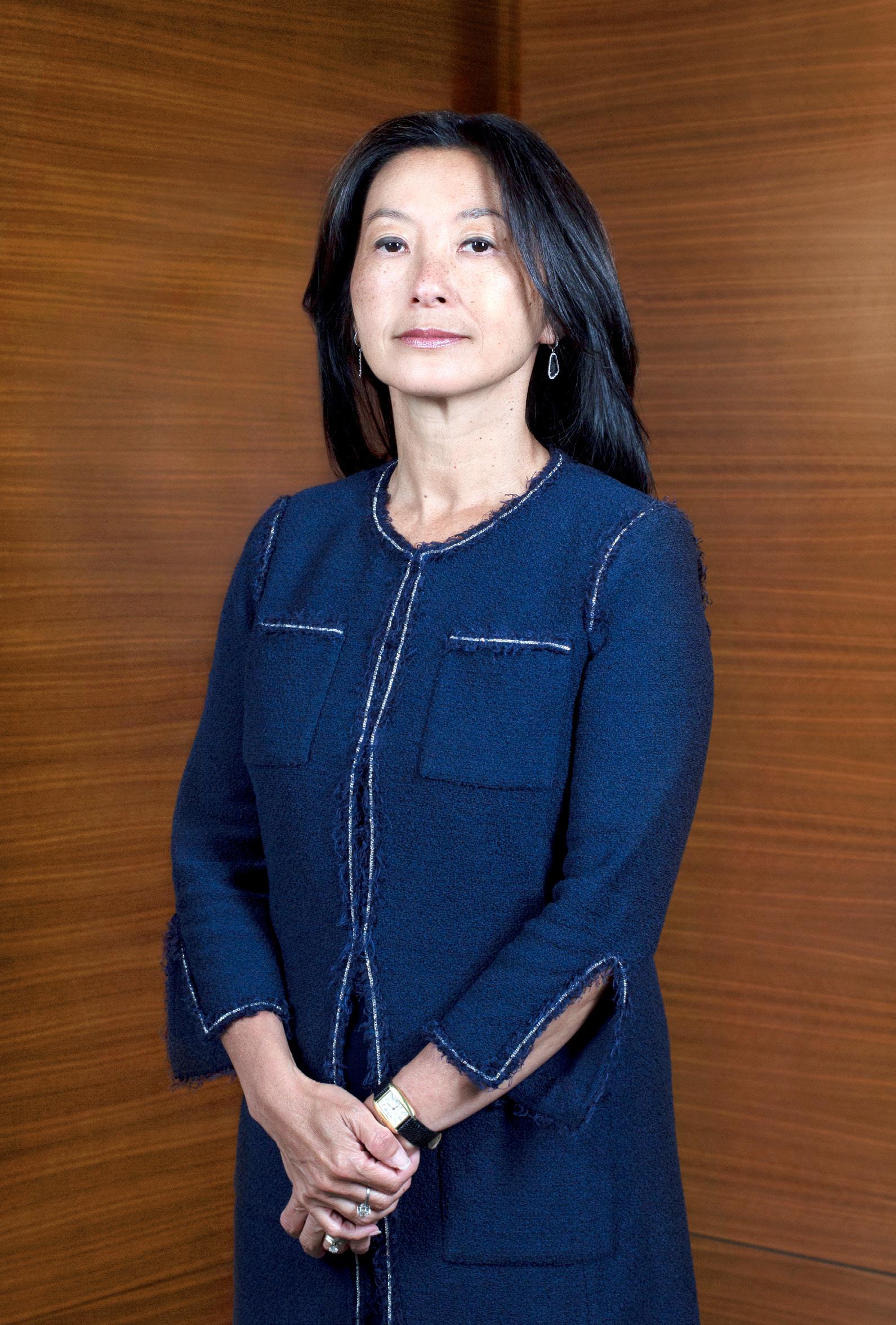
Suh says her two stints as a federal prosecutor for the US Department of Justice have most influenced her approach to her role as managing director and global head of regulatory risk and compliance. “I spent a lot of time in front of juries in Brooklyn, and it forced me to boil down complex facts and laws into digestible and compelling narratives,” Suh says. “I’m always thinking of ways to most effectively relay complex information to different audiences here.”
While Suh was petitioning New York juries, Jordal was helping aid privatization efforts in the post-Soviet Czech Republic. She realized that working with a global mind-set often meant reframing an approach to be more considerate of cultural and geographical differences and understandings. “It’s so important to put yourself in that person’s shoes,” Jordal says. “You need to be prepared to look at a situation with a number of different lenses in order to help understand, and most importantly achieve, certain goals.”
Aspinall accrued significant firm experience before going in-house, a move that she
 —Sung-Hee Suh
—Sung-Hee Suh
says was also motivated by a desire to see the position from a separate lens. “When you think about communicating among lawyers, it’s much different than communicating with a business person,” Aspinall says. Going in-house provided her with an entirely new perspective on how one can be truly effective in a legal role.
Zakir says she benefited from working for founder-based or leaner business models early in her career. These experiences have been especially effective at PIMCO.

“PIMCO’s growth has been quite organic, and I think many of those passionate principles of leadership and growth are very much valued here despite our being a leading global asset management firm,” Zakir says.

Aspinall says employee development is a passion point. “In my life and career, people have invested so much in me, so I feel like it’s my responsibility to help further those on my team along in their careers,” she explains. Aspinall has a large team of direct reports, and interacting with them regularly benefits the overall organization when it comes to work satisfaction, personal development, and overall happiness in the lives of people she values.
In the very early years of her career, lack of experience sometimes made Zakir less likely to take the lead on significant projects, she says, even when she knew she could do the work. “I want to empower junior team members to take the lead on complex projects and to be comfortable with their ability to make decisions, because I have been there,” Zakir explains. “Growth opportunities typically arise when we are being challenged.”
Suh says her approach to inspiring talent is dependent on communication. “I think those in leadership need to try to be their young talent’s champion,” the managing director says. “It’s so important to understand their goals
The financial crisis of 2008 put a spotlight on a lot of the counterparty trading agreements I had helped draft and negotiate for PIMCO. Humbly, I can say that those agreements demonstrated that the terms we negotiated helped protect our clients, and under a significant amount of scrutiny, our organization had a good and well-thought-out structure in place.
—Tracey Jordaland look for ways in which we can help best position them for success in whatever those goals are.”
Jordal is not only a founding board member but CEO for Women in Derivatives, a nonprofit organization whose mission is to attract, retain, educate, and develop female leaders in the financial industry. Finance is a growing area of expertise since the Great Recession and an area in which she also wants to see more senior women across all facets of the financial industry. “We do a great job of recognizing younger talent at PIMCO and involvement in organizations like these help us cultivate young talent in our industry even further and help them develop into senior leaders.”
While she only joined the firm in 2018 in a newly created role, Suh visited nearly every PIMCO office in her first six months. “It was really important for me to engage personally with everyone across the organization and gain their trust,” Suh says. “It was a great way to meet everyone and work hand in hand across the firm.”
Diversity of thought is a prominent attribute of the PIMCO legal team, Aspinall says. “Our job is to ask difficult questions and operate in often gray legal areas,” she explains, “and those are areas where we can add value based on all of our diverse backgrounds and in the way that we collaborate.”

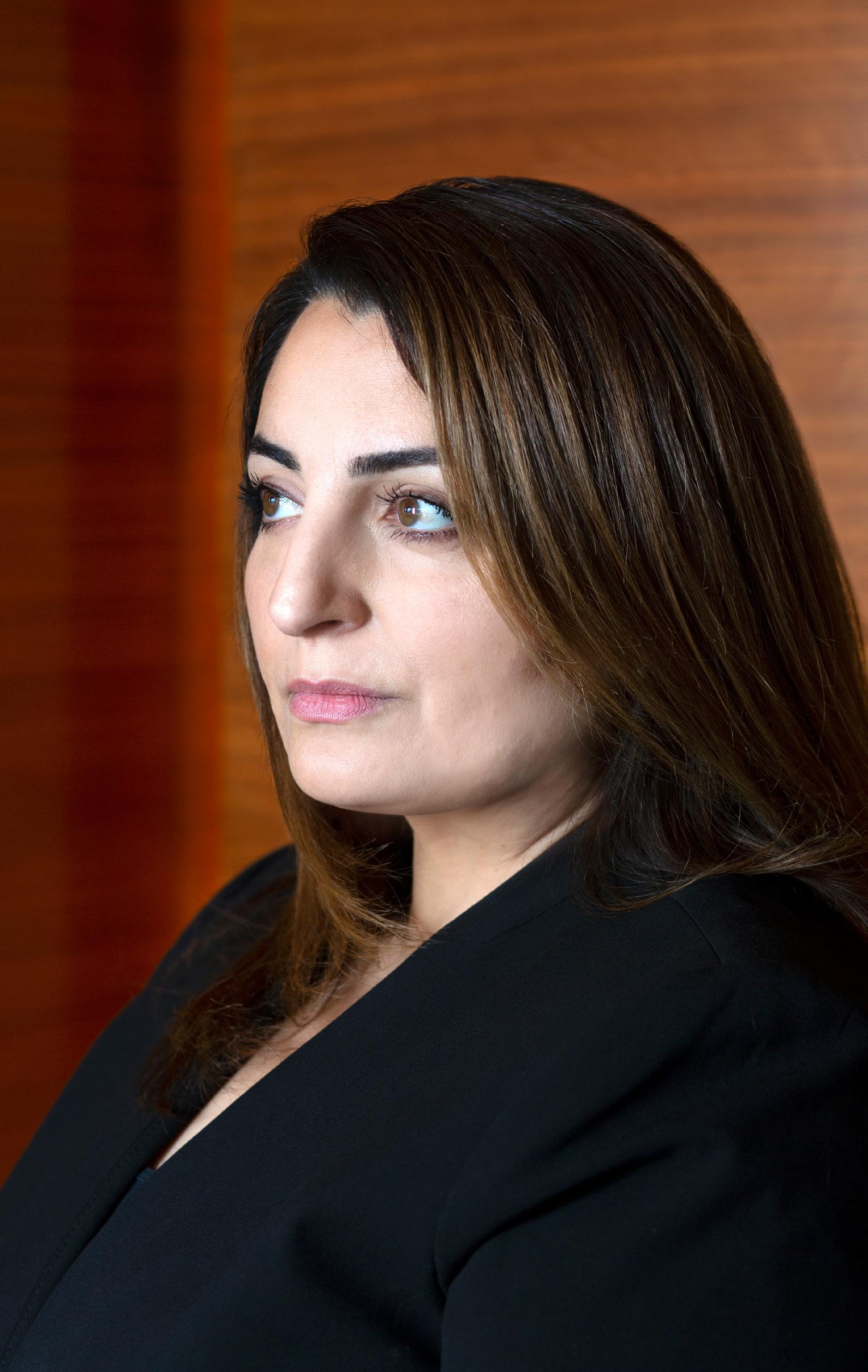
Zakir says her tendency to be drawn to experts has paid significant dividends at PIMCO. “Our firm has been very successful in being able to attract and develop employees who are leading experts in their respective fields,” Zakir says. “Interacting and learning from them every day is a very important part of my own development and satisfaction in working for PIMCO.”
I left private practice after the financial crisis and joined the US Commodity Futures Trading Commission. Our role was really to look at the market structure of the derivatives market and help strengthen it to avoid similar events to those of 2008. It was incredibly challenging but pivotal for the future of that market.
—Nadia ZakirJordal, too, says that collaboration within the legal team and beyond is absolutely essential to be effective in the role. “I worked on a lot of projects in the past six years that required me to work with so many different people across various departments in terms of implementing new regulations and rules applicable to the trading markets,” she explains. “For me, it’s about helping them understand the impact of those regulations and rules while still being able to enter into the trades and deals they want to do. I get a lot of satisfaction from helping them navigate successfully through it all.”
All of the leaders of PIMCO’s legal team express a desire to think about ways that the function can add more than just legal expertise to the business conversation. For Aspinall, it means thinking from the business perspective as much as possible. “Communication is so important that when I interact with an outside firm, I try to get them to understand the complexities of the environment in which our businesspeople operate,” she says.
Innovation, for many of those in legal, can come from just about anywhere. “I work with so many different departments. I feel like I learn something new every day,” Jordal says. Suh echoes the sentiment. Suh conducted a global assessment of the firm’s regulatory compliance framework, hoping her recent addition to the company could provide fresh eyes on possible wise moves for her organization.
Zakir says that her team’s guiding principle is the same as the firm’s: acting in the best interest of PIMCO’s clients. “Being able to interact and understand our clients’ needs and know that we’re providing them with valuable assistance and service as a firm is very rewarding.”
I initially worked at two large law firms, and in deciding whether or not I wanted to pursue a partnership, I believed that it was important to sit in the seat of the person to whom I was giving advice every day. I didn’t feel I could be as effective without that experience, and that’s when I decided to go in-house.
—Karen Aspinall EVP and Deputy General Counsel


create a collaborative environment of inclusion at Fifth Third Bank

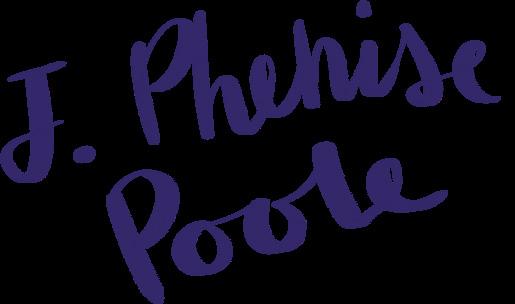

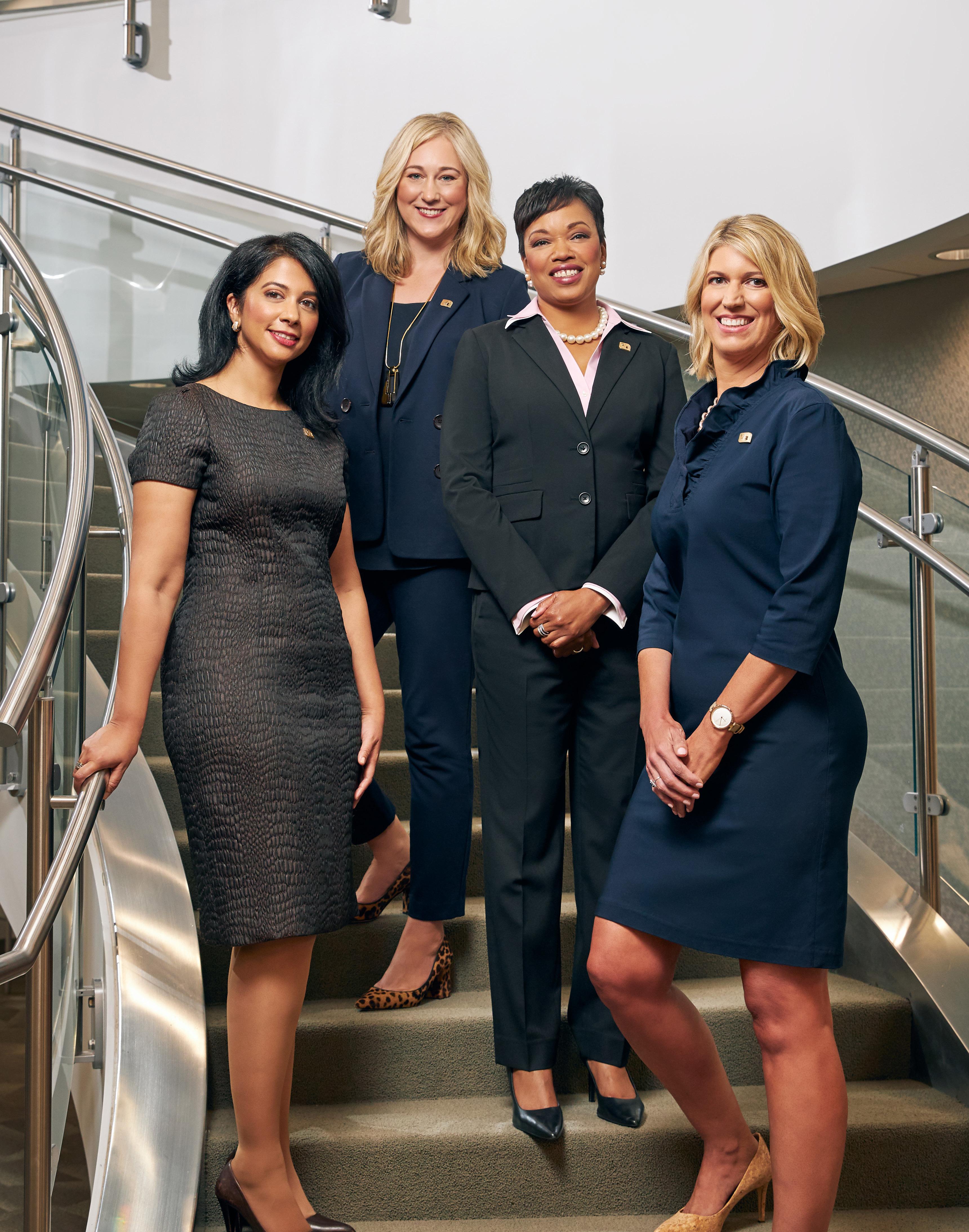
 By Frannie Sprouls • Photos by Jeremy Kramer
By Frannie Sprouls • Photos by Jeremy Kramer


Having more women in leadership roles provides more examples of what a successful woman looks like than if there are just one or two women in the ranks. “When you have ten, twenty, or forty people and they’re all different, it gives people another idea of who a leader is,” says Hope Schall, senior vice president and deputy general counsel for regulatory strategy for Fifth Third Bank.
The Cincinnati-based bank is committed to inclusion and diversity throughout all levels; and its legal department, led by Susan B. Zaunbrecher, sets an example for both the bank and the industry at large when it comes to representation in its leadership.
“The focus on fairness and equity that lawyers love becomes somewhat embedded,” says Saema Somalya, SVP and deputy general counsel for corporate law. “I’m a big believer in stagnation as death. Just because we’ve always done something a certain way and just because power has looked a certain way in the past doesn’t meant that’s how power is going to look in the future.”
Somalya, Schall, and their colleagues
J. Phenise Poole and Gwen Morris are continuing the leadership legacy of Fifth Third’s legal department through their collaboration on furthering the mission of the bank and connecting with up-and-coming leaders in and outside their department.
Morris, who is now SVP and deputy general counsel of consumer and payments, first arrived at Fifth Third from a large local law firm
as a fifth-year attorney in 1999. It was a small department of six attorneys at the time, and Morris decided it would be a great fit. “The amount of responsibility and accountability that you have at that stage in your career is much greater than I had at the law firm,” she explains. Ten years later, though she enjoyed the work she was doing, Morris returned to her former firm, was later named a partner, and continued to do work for Fifth Third.
After seven years, “I heard about an opportunity to lead a new team in the legal department,” she says. “So I came back to Fifth Third in 2015, and I have zero regrets.”
Like Morris, Phenise Poole transitioned from the public sector to in-house at Fifth Third Bank. “My plan was to be in the public sector for five years, be in a law firm for five years, and then go in-house. To the day, I was in the public sector for five years,” Poole says with a laugh. After being at a law firm for one year, Poole took the opportunity to come in-house at the bank as an employment attorney. Six years later, Poole got another opportunity to become the first labor and employment department attorney at another Cincinnati-based company.
In 2018, Poole returned to Fifth Third to lead the employment law team. She had worked with Morris the first time, and there were other attorneys that were still at the bank when Poole returned. “It just felt like I was coming back home,” says Poole, who is now SVP and deputy general counsel for employment law and legal operations. “There’s just been a lot of positive growth at the bank, and so it was a very easy answer for me to come back.”
“Just because we’ve always done something a certain way, and just because power has looked a certain way in the past, doesn’t mean that’s how power is going to look in the future.”
—Saema Somalya



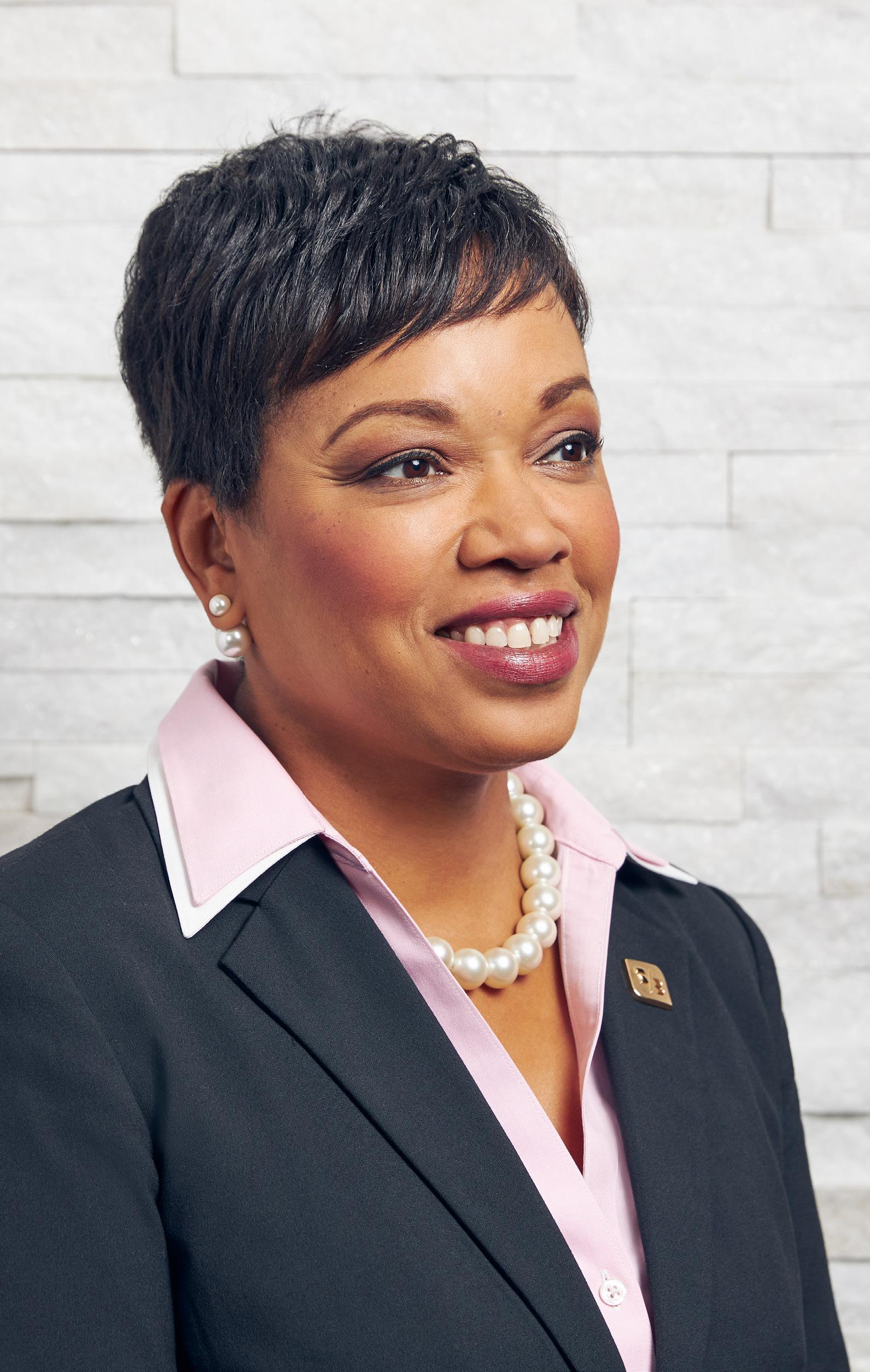
Much like Morris and Poole, Schall once worked at Fifth Third Bank, left for other opportunities, and returned in 2018. “There are only so many jobs in the world for a bank regulatory attorney,” Schall explains. “Fifth Third is an attractive bank because it’s large enough that you get to see interesting issues and feel like you’re a player in the industry, but not so large that you’re so specialized and don’t deal with top-of-the-house issues.”
Somalya, on the other hand, joined the bank for the first time in 2016. “One of these things is not like the other,” she jokes. She had spent the entirety of her career on the East Coast and abroad; moving to the Midwest was not on her radar. When the opportunity crossed her desk, it was so interesting that she realized this was where she wanted to go. Fifth Third was looking to expand the securities legal function and looking for someone with a connection to Cincinnati.
“I am always drawn to interesting stories and economic development and growth,” explains Somalya, whose husband is from Cincinnati. “Being a main-street bank in the Midwest is a really interesting endeavor. We’re very serious about doing the right thing here.”

My mother. She is a retired educator and has always lived a life of service to others. Even in retirement, she continues to give back and is an active member of a number of charitable organizations in her community. Most importantly, she is the epitome of strength and grace under pressure.
—J. Phenise Poole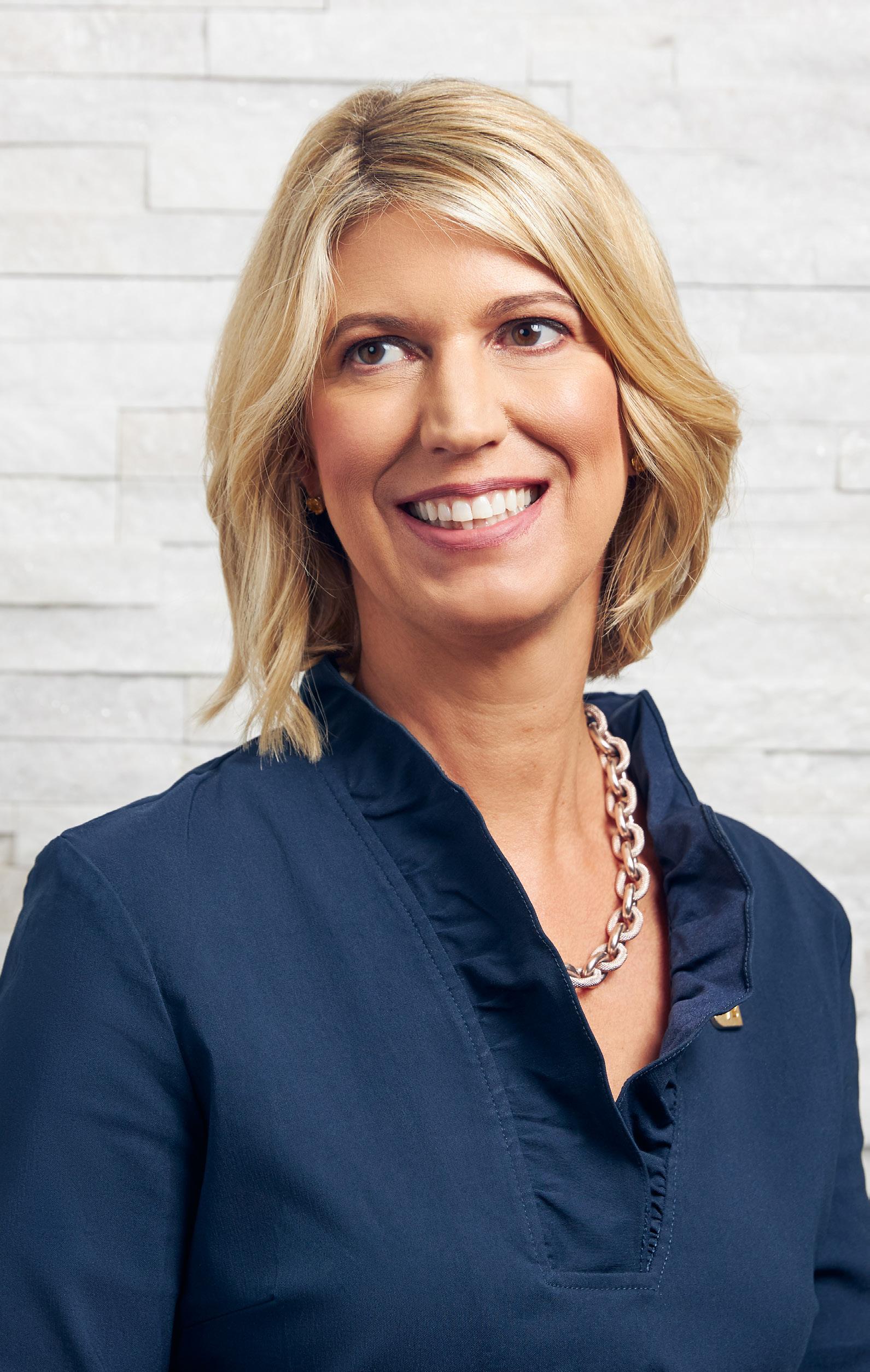
While the four women work in different functions, they often work together, whether on a daily basis or on larger projects like the acquisition of MB Financial. “We’re independent of each other, but we’re all attuned to listening and making sure we’re identifying areas or issues so we can pull in our peers,” Poole says. “It’s rare that there is one issue that doesn’t somehow impact someone else. It’s a very good team, and we have a nice operating rhythm.”

Somalya agrees. “One of the most fun aspects of this job is how collaborative it is,” she says. “We’ve been lucky at this point in our careers to be working on issues that have multiple facets. It’s more interesting, but it also allows us to work more collaboratively and more frequently.”
That collaborative spirit extends to creating opportunities for up-and-coming leaders at the bank. When Poole was at Fifth Third years ago, she says the organization looked very different. Now the bank has more women and more people of color in leadership roles, and it’s created leadership programs and business resource groups to support the bank’s employee base.
When it comes to mentoring, all four women prefer to take an informal, organic approach.
“These three ladies will tell you that I’m pretty
The relationships built over the course of my career. Whether in my role as a legal advisor, colleague, or otherwise, my relationships with the people I’ve worked with have been the most fulfilling aspect of my career. As a bonus, many of the relationships built in a professional capacity have led to impactful friendships outside the office.
—Gwen Morris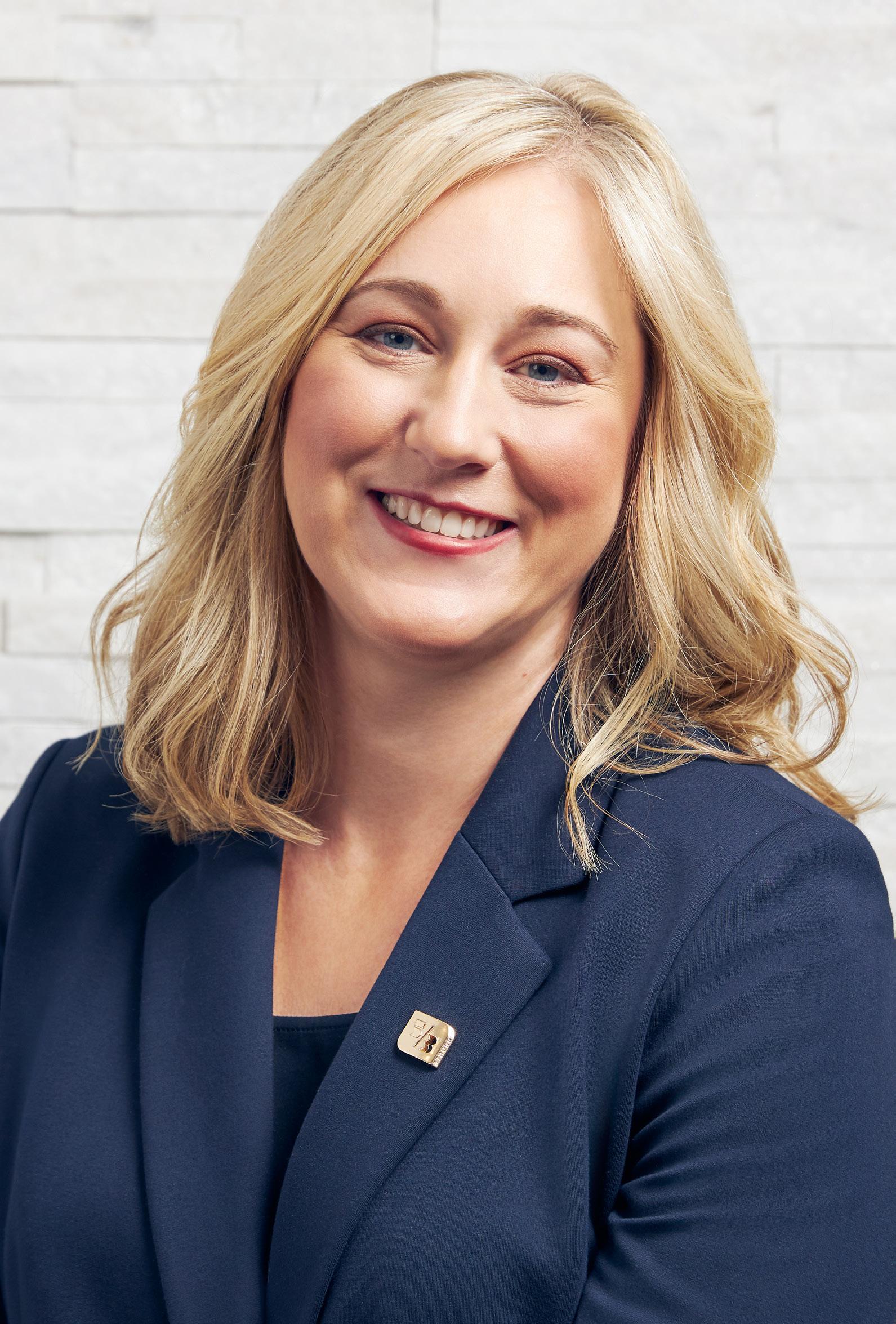
I grew up in a tiny town with a graduating class of twentytwo. I don’t even remember the context, but my high school English teacher told us one day to never sacrifice our integrity. It seems basic but that advice has stuck with me—I think about it every day. Making sure that I always do the right thing and encourage those around me to do the same is my most important contribution.
—Hope Schallsocial, especially among our department,” Morris says. “The more junior attorneys often seek me out for career advice and how to approach a situation with the clients they’re supporting. I find real value in that. If you’re just trying to connect people to each other that otherwise don’t have a meaningful connection, they’re not going to get as much out of it.”
Schall has been involved in formal mentorship programs at other organizations where you’d be paired with someone and meet every Wednesday. When the session was over, you’d never talk again. “That didn’t work,” she says simply. “You can have those programs, but it’s also about the culture, the tone, the visibility, and the access.”
And being in a department run by a woman does make a difference, she continues. “It’s that elevation of importance and visibility of the chief legal officer within the organization, reporting directly to the CEO,” she says of Zaunbrecher.
Somalya adds that there has been a lot of encouraging dialogue in the industry overall, particularly with taking a second look at how a good leader is determined. “Sports has been this historical proxy for, ‘Hey, if you can talk

What is the best advice you’ve been given?

Never make a decision based on fear. (Thanks, Mom!)
basketball, then you can be in the club,’” she explains. “Having a boss who doesn’t require you to be good at basketball in order to opine on whether an acquisition is going to be lucrative is refreshing.”
One of the things Zaunbrecher instituted when she joined Fifth Third was a quarterly meeting with other women in the bank’s law department, Poole says. And every woman is welcome. “She has intentionally created these opportunities for us to just get together and talk about things that are unique to women,” Poole says. “Sometimes it’s about what we do in our day-to-day lives as employees and sometimes it’s just what do we need as women from each other and what she or the organization can do to help support us.”
“As I’ve said to Susan [Zaunbrecher], the talent, diversity, drive, and collegiality she fosters is very impressive,” says Greg Lyons, a partner at Debevoise & Plimpton. “These are terrific lawyers who promote the bank and each other.”
With the support of Zaunbrecher as well as the bank, Poole, Morris, Somalya, and Schall are helping create a new normal for legal departments across industries.
 —Saema Somalya
—Saema Somalya
Debevoise is privileged to work with leaders Saema Somalya Kaukab, Gwen Morris, Phenise Poole and Hope Schall at Fifth Third Bank. We salute their dedication to clients and are proud to recognize their contributions to the field of law and achievements in promoting innovation and inclusion, paving the way for generations of women to come.
www.debevoise.com





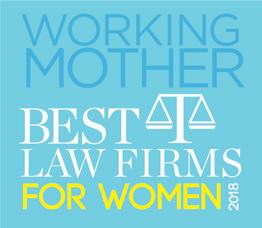
While the vast majority of corporate America fails to reach proper representation of women in senior leadership roles, Ascena Retail Group has impressive stats when it comes to women executives: 60 percent of the company’s board of directors are women, 61 percent of those in vice president roles and above are women, 71 percent of directors and above are women, and in its retail stores, 98 percent of store leaders are women.
But all that said, Ascena’s leadership team knew that it had the opportunity to maximize its development and representation of women throughout the organization. When Wendy Hufford joined Ascena in 2018, she knew she could leverage her past experience in leading and developing women’s resource groups to

builds on her previous women’s resource group experiences to help launch Ascena Retail Group’s women@ascena
What is the best advice you’ve been given?
The best advice I have been given was taught to me at a Senn Delaney Training Culture Building Class, where I was taught to “be here now” to increase personal effectiveness both at work and at home. This means that you should stay present and focused on the person you are interacting with rather than trying to multitask or be thinking of other things and not paying attention. This advice has helped me become a better listener and leader at work and a better parent and spouse at home.
further that work. “I’m happy and honored to have the opportunity to continue this work at ascena,” Hufford says.
After earning her JD from Yale Law School, Hufford started her legal career working for a federal judge and then as a litigation attorney prior to moving into the corporate world. Her first step into the retail world, however, came in the form of a vice president and senior litigation counsel role for GE Consumer Finance.
Before returning to the retail industry at Ascena, Hufford made stops in a variety of fields, from pharmaceutical distribution to global manufacturing. But the opportunity to return to retail—and move into her first general counsel role—was too good to pass up.
“It’s especially rewarding to work for a company where I’ve always been a customer. I have loved wearing their products for many years,” Hufford says. “I purchase apparel from Ann Taylor and LOFT, so I knew and appreciated their style and the high quality of their clothing.”
But more than the quality of the garments, Hufford was immediately drawn to the organization’s commitment to supporting women—both its customers and employees.

“As the mother of three daughters, I'm proud to work for a company whose mission is to provide all women and girls with fashion and inspiration for living confidently every day,” she says.
Though Ascena’s products may be very different from those of her past companies, such as Cardinal Health or Boehringer Ingelheim, Hufford is sure to take best practices and strategies from every stop along the way into her current work, particularly when it comes to furthering the company’s mission of supporting women in the workplace.
“The GE Women's Network helped me develop as a leader and gave me the opportunity to meet other GE leaders when I was a younger attorney,” Hufford says. “I attribute some of my career growth at GE to having that opportunity to attend networking dinners and coaching sessions.”
So when she first joined Cardinal Health, Hufford saw the perfect opportunity to work with other female leaders to develop a new and much-needed women's initiative network. “We created a steering committee and provided support to enable branches to start all across Cardinal Health, which is a very large organization,” she says. The Cardinal Health women's initiative was a quick success and expanded rapidly in membership.
“My vision was to ensure that every woman had the skill, support, and exposure to succeed at the organization at every level, consistent with their aspirations,” Hufford says. “I was always passionate in my belief that everyone should have a fair opportunity to succeed if they
worked hard and felt that corporate America had not yet made sufficient progress in giving opportunity to capable women.”
In addition to importing some of her best practices in the legal realm, Hufford immediately looked for ways she could influence Ascena toward even stronger female leadership representation. Still in its earliest stages, Ascena’s Women’s Leadership Initiative, women@ascena, utilizes executive sponsors (Hufford included) and other campus cochairs to empower all women at Ascena, and women in Ascena’s customer base, in the search for diverse perspectives and opportunities to elevate unique voices.

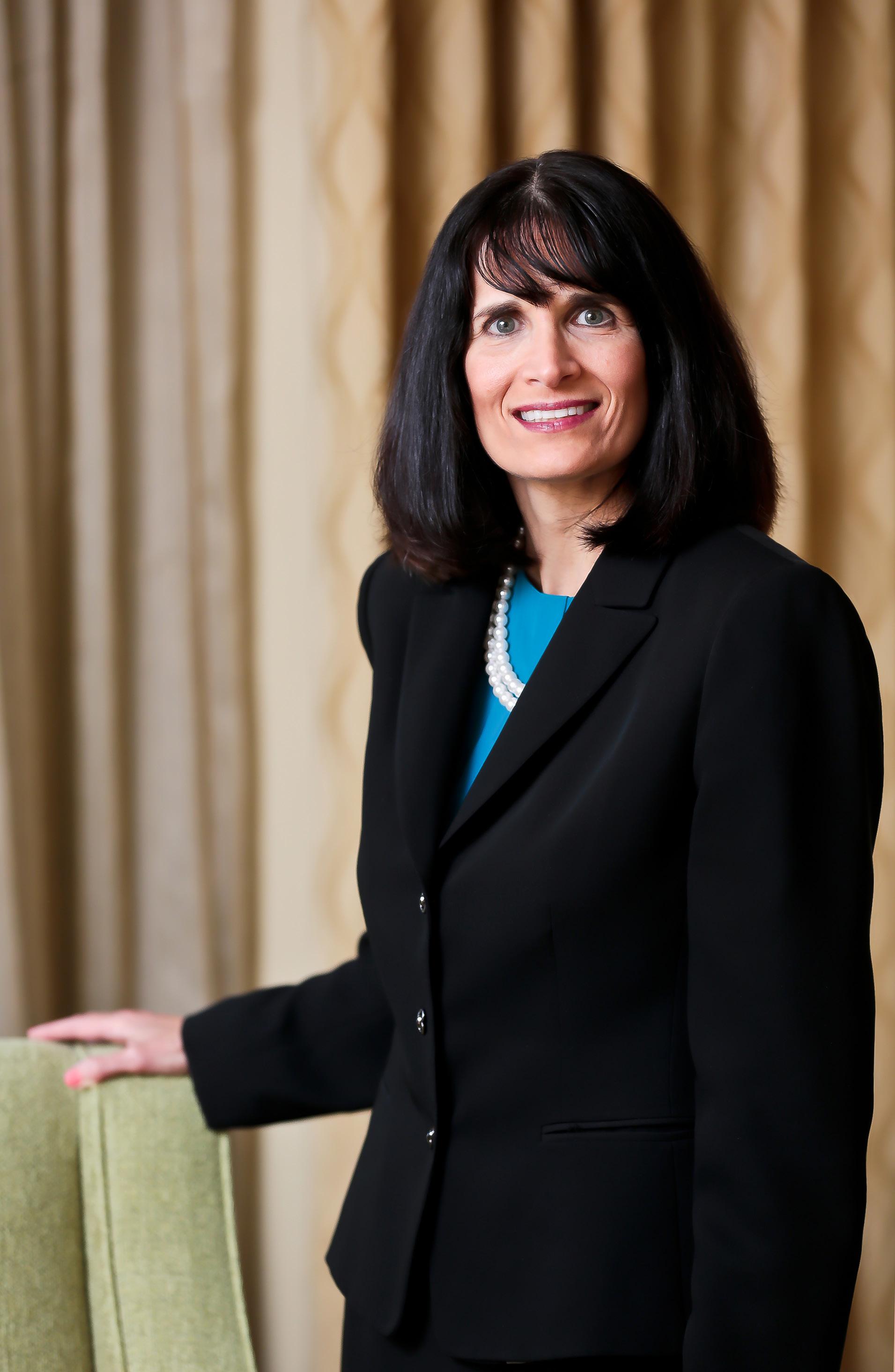
“This new organization is just getting started, but I’m really excited about being able to work on another women’s initiative,” Hufford offers. The project has plans for community-based and career-based projects to inspire its members—efforts that she found essential in her own career development.
Drawing on her experience with leading women’s organizations at previous career stops, Hufford has been able to share key lessons that have helped define women@ascena’s launch and early activities. “Whether it’s for my own team or the women in this organization, constant development is very important,” she says. “You can't just do your job. You have to keep trying to grow and broaden your skills.” As such, Hufford ensures that each member of her department has a development plan to guide their skills and address development needs.
Wendy Hufford SVP and General Counsel Ascena Retail Group TonyHufford also emphasizes the importance of working collaboratively with others in the process of learning as much as possible. “Trying new tasks under the supervision of someone with more experience is a great way to learn a new skill set in a safe environment,” she says.
In addition to a strong work ethic and the ability to adapt to change, Hufford counts strong mentors in her past as part of her success story—something she hopes that women@ascena can further offer to women in the organization. “Over the years, I've gotten better at figuring out how to prioritize my time at work and at home. I’ve learned to focus on putting the most important things first and also reaching out for help as needed,” she says.
Part of learning how to prioritize her time has included Hufford's contributing some of those same skills to the board of the nonprofit organization Family Ties of Westchester. “I recently participated in a women's retreat, which gave women who were caretakers for their families a chance to step away and think about their own aspirations and goals and how to better manage their lives,” she says. “I have found it very rewarding to help connect women and families to services that they need to help make their lives run more effectively.”
White & Case is proud to congratulate and support Wendy Hufford. Wendy is a master strategist and a true leader. It has been an honor and a privilege to work with her over the years.
of Ascena Retail Group on being recognized for her outstanding achievements.
We are proud to support Wendy and her exceptional career accomplishments.
Catherine Franklin credits her career journey to several great teachers, and as vice president of tax at Westgate Resorts in Orlando, she strives to emulate them as a manager and as someone planning for the next phase of her life.
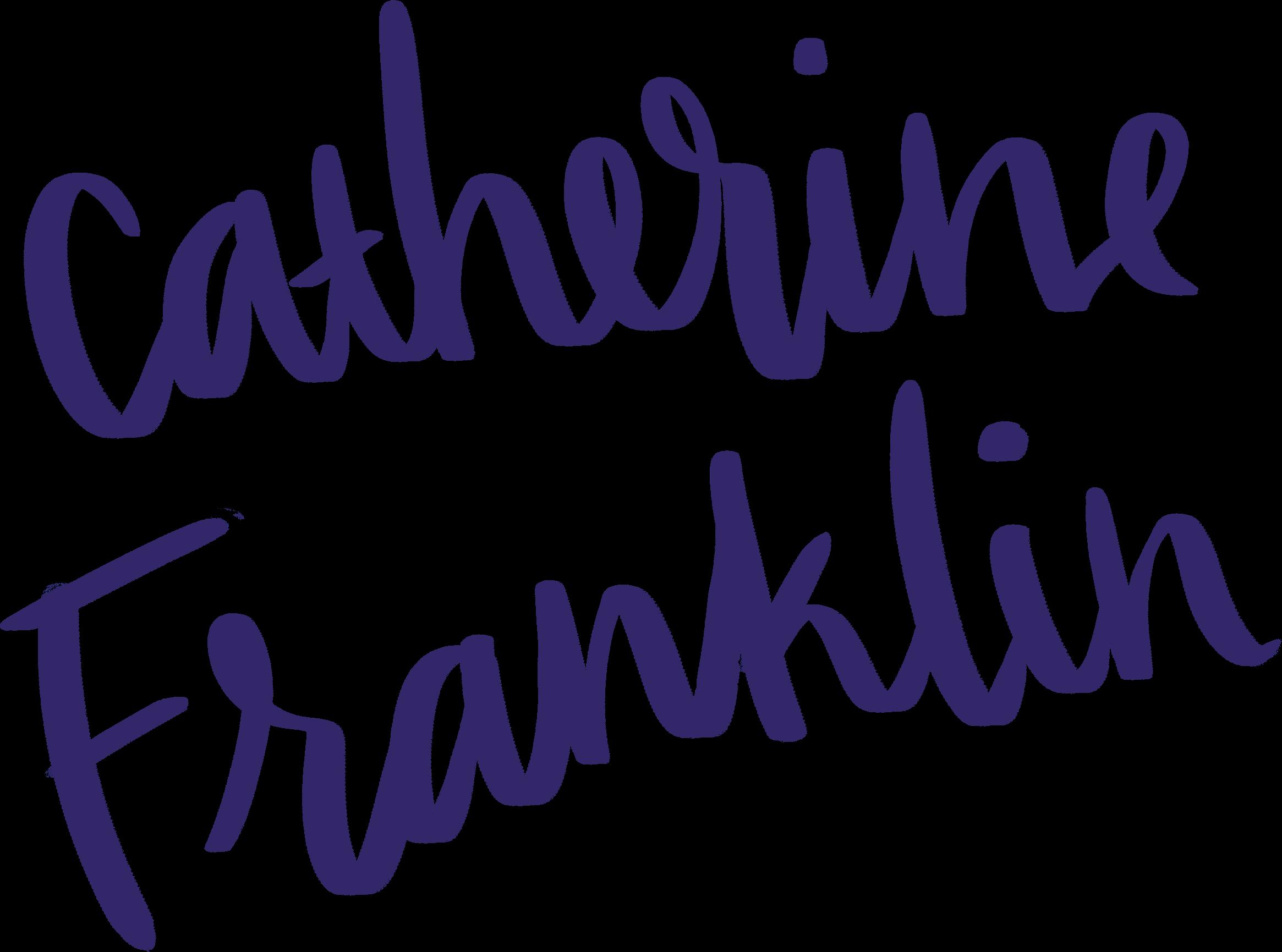
One of the first of Franklin’s great teachers was her dad, who taught her how to read by reciting stories from the newspaper every day until she could read them herself. He took a different approach to teaching math. “Every night before I went to bed, he would give me a long math problem I had to solve in my head,” Franklin says. “I think that he had a lot of influence on the way I am today.”
Franklin describes herself as a sequential thinker, able to build in her mind and set logical steps toward a solution. Her passion for tax
By Chris Gigleycame after she earned her accounting degree at the University of Central Florida’s College of Business Administration.
She spent her first two years out of college at a small Orlando accounting firm where she did a little bit of everything. She discovered she didn’t like the audit side of the job, so in the mid-eighties, she joined a larger firm in Orlando where she could specialize in tax. That’s when she met Joe Davila, an older gentleman who had been a tax partner at one of the national accounting firms. Franklin credits her proficiency in, and love of, tax to Joe.
“He took the time when we were doing returns to not only talk to me about how we should handle an issue,” Franklin says, “but also to go into explanations and sometimes tell stories about a particular topic.”
Franklin says she’s been following Davila’s example ever since. And as the field has become more automated, explaining the why behind tasks has become increasingly crucial. “The generations of accountants coming out of school now have never done a tax return by hand,” she says. “They really don’t understand the crux of the tax law and how things are supposed to calculate.”
But Franklin doesn’t get involved in her team’s work unless they ask for help. “I don’t micromanage, but my door is always open,” she says. “And when they do ask questions I try to not just say, ‘Do this,’ and let them walk out. I try to explain the reasons, because once you know the why you’ll never forget the what.”
One of the first teams she managed proved it was the right approach. Franklin, a new mother at the time, was managing a
implements her work and management philosophies to find success for her, her employees, and Westgate Resorts
fifteen-person tax department. She remembers working from 4 a.m. to noon on Saturdays so she could have more time with her daughter. Eventually, her team started following the same schedule so they could be around her more for guidance. “I think they liked the fact that I wasn’t afraid to sit down and roll up my sleeves,” she says.
Franklin has also found success by being hands-on with big projects. One of those came during her twelve-year tenure at Walt Disney World, where she started in the corporate tax department in 1995. After five years, she took the opportunity to manage the accounting and finance teams for Disney Cruise Line—just as the company was implementing SAP, a new enterprise-wide financial system. Franklin and her team had six months to get it done.
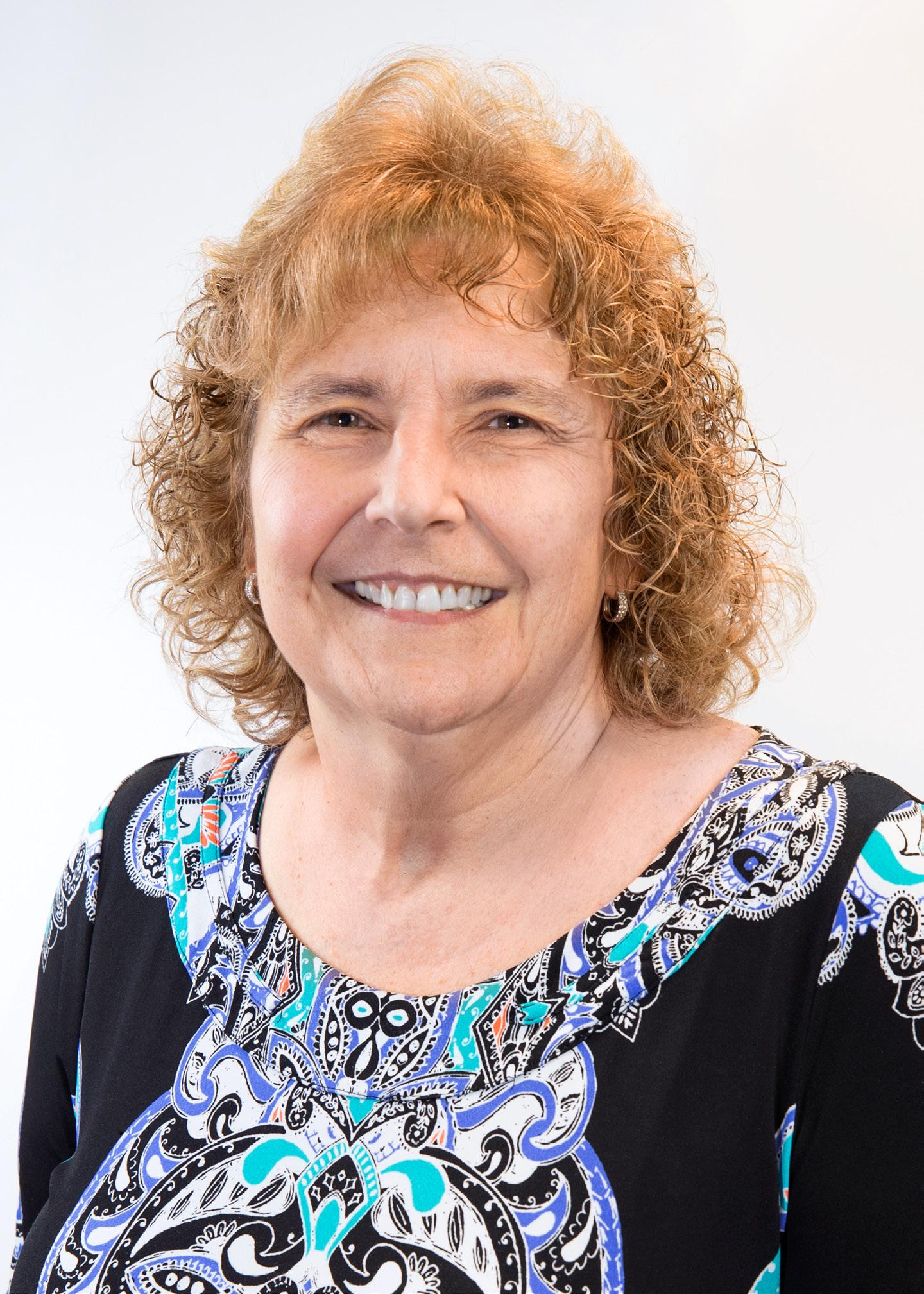
“Because the cruise line was still fairly new, I decided to completely redesign their entire accounting and reporting system,” she says. “I took the extra step of meeting with all the operations and finance teams to understand how they used their monthly reports, so I knew what information was important to them.”
Franklin and her team designed a system with a single report that each department could run using its own criteria while still fitting within the standard format set by Disney. She spent a lot of time with the IT team learning how to map the current information into the new system. She personally trained the finance teams shoreside and on each ship. Despite the extra time invested, the cruise line was the only Florida-based Disney division to close its books both on time and accurately the first month after implementation.
Franklin’s success at Disney didn’t completely satisfy her passion for the tax side of the business, however. She joined Westgate Resorts as tax manager in 2007, and it didn’t take her long to rise to her current position and recognize the need for an entirely new, more automated sales and use tax system. She knew the company had to simplify its processes while minimizing its audit exposure because Westgate buys everything from cleaning supplies to furniture from vendors all over the US. Tracking sales taxes, whether self-charged or charged by the vendor, was a challenge.
In addition, Franklin saw the opportunity to structure the new system to allow Westgate to
designate itself as a wholesaler. The company keeps shampoo, pens, bedsheets, and other supplies in a central warehouse, distributing items to resorts as needed. As a wholesaler, the company can defer paying sales tax until the supplies are shipped to the resorts, helping with immediate cash flow. It can also get better pricing from vendors.
“You have to have a good system in place to do that,” Franklin says. “I wanted to be sure we did it right the first time so we wouldn’t have to pay for mistakes down the road.” She says Westgate is now implementing a second phase of this system to simplify and automate the billing process for the supplies shipped to the resorts.
Catherine Franklin VP of Tax Westgate Resorts

My first leadership experience was scary. I was a brand-new manager with a group of twelve tax people who had been at the firm longer than me. It was really hard going from peer and friend to leader, especially since I had not had very good leaders in my career. I decided to never make those who worked for me feel small, unappreciated or unheard. To this day, I take the word “team” to heart.
In the middle of all this work, Franklin earned her master’s in tax online to prepare for her next career move. She wants to teach both undergraduate- and graduate-level tax and found that her experience in online learning motivated her even more. Many of her professors were good, but others offered minimal guidance, if any. No explanations of the why; just do the work and get a grade.
Naturally, that got Franklin thinking of the growing reliance on automation in her field and of steps she’d follow to make sure her students knew why they did what they did as tax professionals. Step one? Tackling an assignment none of them have likely ever done.
“I’m going to have them do a business return and a 1040 by hand,” Franklin says. “They will moan and groan, but it’s important. It helps
them to really understand the tax law and speak intelligently to the IRS. You do your employer a disservice if you don’t understand the tax law as much as you can.”
That’s how Franklin got to where she is today, and she intends to be the kind of teacher and mentor who can help young and aspiring accountants get on the same track.
Greenspoon Marder is a national full-service business law firm with 240 attorneys and 26 locations across the US. Since our inception in 1981, our firm has been committed to providing excellent client service through our cross-disciplinary, clientteam approach. We serve Fortune 500, middlemarket public and private companies, start-ups, individuals, and entrepreneurs nationwide. For more information, visit www.gmlaw.com.

Vishal Agnihotri leverages twenty-plus years to help Hinshaw & Culbertson embrace and implement tech innovations
 By BILLY YOST
Gautam Agnihotri
By BILLY YOST
Gautam Agnihotri
Vishal Agnihotri has worked on three different continents, speaks five languages, and has worked with teams from Bangalore to Brussels and from Boston to Brazil. She says none of this is a requirement for a chief knowledge officer, but it certainly doesn’t hurt.
Agnihotri, chief knowledge officer at Hinshaw & Culbertson, has been in knowledge management for more than twenty years and has navigated technological inflection points from dial-up to artificial intelligence for both accounting and law firms. Agnihotri’s extensive experience in both business research, competitive intelligence and technology adoption is an ideal fit for knowledge management, and her résumé reads like a blueprint for assembling essential experiences that she is leveraging in her current role for the past two years.
The chief knowledge officer underplays her life experience previous to her career, but it’s essential in understanding her desire to gain new knowledge. As an Indian raised early on in Kuwait, Agnihotri was seen as different and treated as an outsider in both countries.
She moved back to Kuwait after graduating university in the mid-1990s and had one of two options. The conservative country that had just been liberated from Saddam Hussein’s takeover offered few options for an
educated, single woman. “Professionally, you could be a teacher or a secretary,” Agnihotri says. She chose the former; her mother was a career teacher of thirty-eight years. But after a year, she realized that this path wasn’t enough for her young, hungry mind.
“I could see that my opportunities were limited in Kuwait,” Agnihotri says. She fiercely resisted her family’s traditional view of marrying her off right out of college and instead sought to pursue her MBA, researching colleges in the only English public library in the country, the one affiliated with the British Embassy. With no guidance or mentors, she would write down the names of colleges, type out applications on her typewriter, and fax them off.
“I don’t know how I got three acceptance letters or managed to convince my parents to let me go, but later that year, it felt fantastic to step onto those fall leaves on a university campus to start off a graduate program in a new country. At that point, I had never seen fall leaves! Every step after that was challenging but enriching,” she says.
Agnihotri says her diversity of experience, in career and life, has allowed what she calls “hybrid thinking,” being able to manage multiple viewpoints concurrently. “Based on the places I’ve lived, I think my empathy quotient has really gone up,” Agnihotri says. “It is very key in my current role. When you’re rolling out technology and asking busy billable
“Moore’s Law applies to technology, but it doesn’t apply to technology adoption. People and organizations are complex; they can’t just be switched on and off.”
VISHAL AGNIHOTRI
professionals like lawyers or accountants or auditors, you can’t come from a place of ‘I know best and let me just throw this at you.’”
Knowledge management at Hinshaw means bringing in new technology but keeping in mind that her constituents don’t spend their time eagerly hoping to examine a new system or process that might make their lives easier. Every two years, according to Moore’s Law, processing power doubles—which means technology gets faster. “Moore’s Law applies to technology, but it doesn’t apply to enterprise technology adoption,” Agnihotri says. “People and organizations are complex; they can’t just be switched on and off.”
It’s then a priority for Agnihotri to shorten learning curves on new tools and processes and demonstrate that those investments of time can lead to lasting benefits. New tools like Lex Machina and Context from legal publisher LexisNexis are able to analyze perspective outcomes based on federal records of judges’ and courts’ tendencies and leanings.
“Using those kinds of analytics, lawyers can now design much more nuanced litigation strategies,” Agnihotri says. “That’s a gamechanger, and if you’re not using tools like this, you can bet that the next firm is.”
Agnihotri’s progressive approach has been noted by Anthony Davies, vice president of sales and account management at LexisNexis. “Vishal is super focused on innovation and best practice and genuinely encourages
business partners to contribute to the firm’s strategy and vision,” he says. “She is always open to exploring new ideas, maintains open and honest lines of communication, builds strong relationships, and offers a positive and constructive approach to every interaction.”

While knowledge management as a field is relatively young, Agnihotri says that any company that is document-intensive or offers professional services needs knowledge management. “The volume and variety of the information we are surrounded by keeps increasing both internally and externally,” she says, “and knowledge management helps manage that overload of data, so the right information can be found at the right time.”
There is an urgency around cultivating technology adoption in law firms, Agnihotri argues. The American Bar Association has mandated an ethical duty of technological competence. “You cannot spend too many hours on research because you don’t know how to research properly and then bill that to a client,” Agnihotri says. “Advances in search engine technology and contract analytics means that digging through boxes of paper are a thing of the past. Analytics software can help detect and display patterns in large amounts of data that would otherwise take an unviable number of man-hours.”
The law may move slowly, but Agnihotri continues to effectively implement and adopt technology to grease the rails.
When you put information and technology into the right hands, you give people the power to change the world.
On behalf of LexisNexis®, we congratulate Vishal Agnihotri of Hinshaw & Culbertson LLP on her contributions to the legal profession.
On the phone, it’s easy to get the feeling that Justin Lau may, in fact, be engaged in several activities concurrently. As he offers well-wishes to members of his team leaving for vacation while speaking at a rapid, yet somehow conversationally casual pace, it becomes clear how Lau is able to balance so much on his plate at present. The general counsel at Mixpanel also oversees six other internal groups besides legal at the business analytics service company. When asked how he’s able to handle the stress of so many roles, Lau seems almost confused at the idea. “It’s just part of my job, and I’m happy to take on these roles as
long as I believe I can build cohesive, strong teams that do the work well,” Lau says. “My dad was an army guy who taught me about the value of empowering the team and in what you can accomplish as long as you believe in the value of the organization.”
Lau says Mixpanel is poised for a period of hyper growth, and with that expansion has come the opportunity for the GC to take on extended roles.
“I’ve been most proud of the amazing teams I’ve been able to build and the level of service they’ve been able to provide the organization as a whole,” Lau says. “Because of the strength of those teams, I’ve been able to expand my own scope to include legal, security, partnerships, recruiting, HR, and
operations teams and unify them into one well-oiled machine.”
The strength of Lau’s team building is most immediately evident in the capacity and willingness of his home team: the legal department. “Collectively, we cover a lot of scope and touch every part of the organization from product development and engineering to sales and marketing,” Lau says. “These are highly committed people who want to build things, and when you combine that with a purpose-driven approach, we’re really poised to help move the business forward.”
Lau says his legal team works to truly embody the notion of servant leadership, a philosophy in which the main goal of the
leader is to serve. “I wanted to create an internal DNA of service on our legal team,” Lau says. “We’re there to help, and I think part of the reason that this team is so great is because of the overall lack of ego.” Lau says anyone who thinks they’re above a certain role in legal just simply won’t make it on his team.
There was no time at all for ego when it came to making sure Mixpanel was General Data Protection Regulation (GDPR) compliant. And while Lau says the project was one of the most rewarding jobs he’s had since coming to Mixpanel, he’s also willing to acknowledge that working to align to the new European privacy guidelines required “an insane amount of work.”
 Justin Lau General Counsel Mixpanel Inc.
Justin Lau General Counsel Mixpanel Inc.
“This project required cross-functional collaboration with a number of teams including legal, security, product, engineering, IT, HR, and more—and it forced us to work backward from our known end goal of full compliance,” Lau says. “As a whole, we’re focusing on reshaping our product around the concept of privacy by design, meaning that privacy and security aren’t topics that live only on our legal team but permeate through our entire company.”
That evolved scope changes the way engineers think about designing product features as well as engaging new business, as the company now has around 40 percent of its overall revenue to date coming from internationally based companies. With its GDPR compliance program, Mixpanel is increasingly focused on capturing the global market with European offices in London, Barcelona, Paris, and Amsterdam, along with an office in Singapore.
Mixpanel is GDPR compliant, but its focus on privacy goes deeper. For Mixpanel, privacy is not simply a box to be checked. “We’re


always working across internal teams to make sure Mixpanel focuses on privacy by design and continues to offer industry-leading privacy and security to our customers,” Lau says. That includes a new data residency initiative in the EU, preparing for the California Consumer Privacy Act, enhancing GDPR compliance tools that feed product initiatives, and helping numerous financial and healthcare partners meet stringent regulatory obligations.
As Mixpanel’s strong growth continues, Lau is also cognizant of the challenges of recruiting, hiring, and maintaining the best talent globally because, along with the new European offices, locations in Asia Pacific are also under consideration. “Our growth has been matched by strong validation and demand in the marketplace from large, global organizations—we now serve 30 percent of the Fortune 100,” Lau says. “We’re honored by that, we’re equipped to serve these customers, and we’ll continue to work tirelessly to support their innovation efforts.”
“As a whole, we’re focusing on reshaping our product around the concept of privacy by design, meaning that privacy and security aren’t topics that live only with our legal team but permeate through our entire company.”
JUSTIN LAU
Katie Rowen wasn’t always on the path to become a lawyer. “I sort of fell into it and got lucky,” she says. Originally an environmental policy major, she was interested in the crossroads of government, science, and economics. But, eventually, when she enrolled in law school intending to practice environmental law, she realized her passions laid elsewhere and gravitated toward litigation and employment law.
“Because I lead both global employment law and litigation, I have visibility into most of our risk and conflict issues,” she explains. “To provide value to the organization I need to be flexible in my thinking and approach every problem as an opportunity. It might
be an opportunity to improve a process, or educate our leaders, or drive inclusion. The common thread in those opportunities though is the ability to increase employee engagement. In my role, you get to help shape the culture of the organization, which is really compelling to me.”
Since finding her passion, Rowen has carried it through in-house positions focused on employment, compliance, and general litigation in Arizona, Massachusetts, and now Seattle, Washington. In her current position as vice president of labor and employment and litigation for Fortive, a Fortune 500 diversified industrial growth company, she channels the lessons she learned from past mentors, modeling her own leadership style based on their valuable skill sets. One of
the most important lessons, she says, was learning the advantages of reflection and slowing down.
“I am biased toward action and so it is naturally hard for me to slow down, but as you progress in your career and the problems you are facing become more complex, you have to be thoughtful and not jump to a solution right away if you can help it. I have learned the importance of slowing down and getting feedback from all stakeholders before I act. Reflection offers opportunity to come up with more elegant solutions, develop a more junior team member by pulling them in, or get further buy-in and support from the organization,” she explains.
In all, Rowen’s approach fits in with Fortive’s drive to help customers succeed
and build extraordinary teams, and allows for more effective communication, whether it be work-related or societally relevant.
Approaching the midterm elections in November 2018, Rowen recognized that the political climate of the United States was spilling into the workplace environment. “The new watercooler gossip isn’t gossip at all—it’s current events,” she says. As such, Rowen decided it would be valuable to educate Fortive leaders about best practices and legal issues that arise in managing political conflict and diversity discussions in the workplace and created a workshop to accomplish this goal.
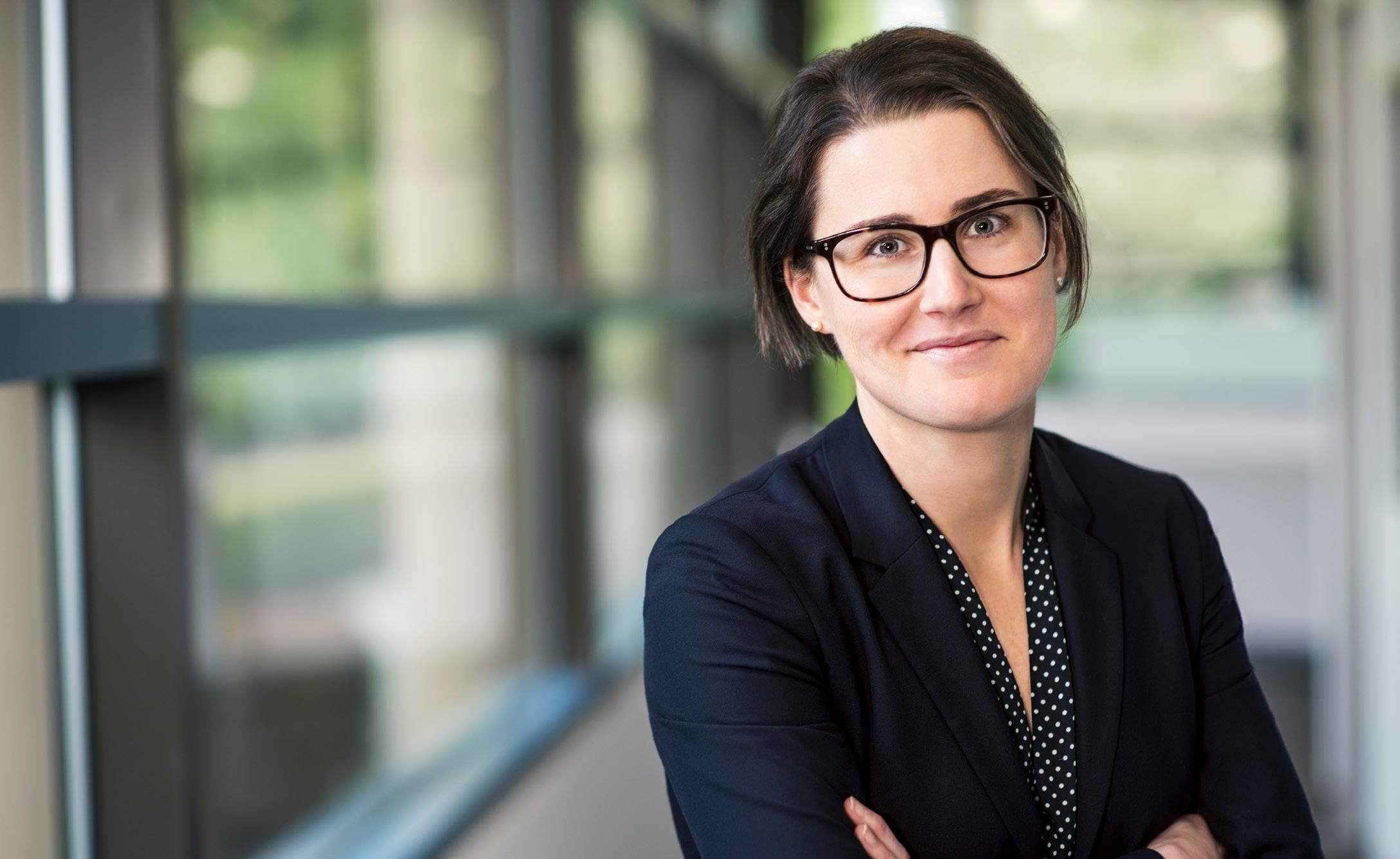
“The genesis of the project was really just taking in the political atmosphere when there is increasing political divisiveness in America and an erosion of civil discourse,” Rowen illustrates. “The most emotional political issues of the last couple years have been diversity issues—the Kavanaugh hearings, separation of families at the border, the
#MeToo movement—and this diversity thread provides a greater nexus to the workplace. Further, these political issues naturally spill into the workplace simply because everyone is talking about them.”
In these workshops, Rowen led Fortive’s senior leaders and the entire US HR team through hypothetical situations using real life scenarios of political and diversity issues that have impacted other companies. For example, what should a company do when an employee skips work to protest or someone writes a politically charged message on their office whiteboard? The teams would work together to mock handle similar scenarios allowing them to realize the intricacies and legal frameworks for each unique case.
“The workshop shows the team that handling these issues well requires a cross-functional lens and a thorough and individualized analysis in order to ensure you have considered all of the issues and stakeholders,” Rowen says.
Rowen easily tags this project as her favorite to date. “I’m so incredibly lucky that I work at a company where our senior leaders see these challenges as an opportunity to drive engagement and culture,” she says.
“And for me personally to be able to drive our values and our culture and employee engagement within the legal function—and to help facilitate the success of our executives and HR leaders—is just a special privilege,” she adds.
Moving forward, Rowen hopes to continue progressing in her career, venturing simply “to continue to move it into roles with greater organizational impact and with an even greater opportunity to develop others.” Her personal goals are simple, too: “to be the best family member, friend, and colleague” she can be. Whether facilitating political thought or promoting inclusion and diversity initiatives, she keeps her simple but important goals as guideposts to ensure the happiness of the people in her personal life, and the success of the clients in her professional life.
Katie Rowen VP of Labor & Employment and Litigation FortiveTo fuel her own happiness, Katie Rowen practices her favorite hobbies in her free time. She adores traveling, her abundant vegetable garden, and spending time with her wife and their three rescued dogs. But, above all, she’s deeply passionate about cooking.
“It’s a great de-stressor for me,” Rowen says. “When I get home from the office, the first thing I do is put on an apron and start cooking. In fact, you can tell when I’m having particularly busy weeks because my meals get more and more elaborate.”
We proudly partner with her to deliver greater efficiency, better outcomes, and increased value to Fortive.
to our client Katie Rowen, Vice President, Labor & Employment and Litigation of Fortive, on her outstanding professional achievements.
“The new watercooler gossip isn’t gossip at all— it’s current events.”
KATIE ROWEN
Save the Children is celebrating one hundred years of seeking better education, healthcare, and economic opportunities for children in addition to its humanitarian response work. The organization, founded by British social reformer Eglantyne Jebb in 1919, was originally created to help children throughout war-torn Europe following the World War I, and it became the first globally recognized effort made on behalf of children. Jebb’s Declaration of the Rights of Child would eventually be adopted by the United Nations in 1959 and ratified as the Convention on the Rights of the Child in 1990, underlining decades of work to help one of society’s most vulnerable populations.
Debbie Pollock-Berry has endeavored to provide employees at Save the Children with the same respectful and nurturing atmosphere that the organization has worked to create for those it serves. Pollock-Berry
 Debbie Pollock-Berry Chief Human Resources Officer Save the Children
Debbie Pollock-Berry Chief Human Resources Officer Save the Children
has twice been honored by Savoy magazine as one of their “Top Influential Women in Corporate America” on behalf of her diversity and inclusion efforts and commitment to what she calls “making the workplace a more comfortable, successful, and healthier place to be.”
The chief human resources officer has been able to make tangible progress in two short years at Save the Children in ways she hopes will help streamline diversity and inclusion issues for years to come. A huge part of this success is thanks to a staff-led Diversity, Equity, and Inclusion Council formed last year, which dug into issues and advised management on strategy from the employee perspective. The first HR push to remove incidents of unconscious bias was to address the educational qualifications for hiring.
“We have the great fortune of having people with master’s degrees applying for entry-level positions for which they are overqualified, and I think it has almost become expected to look for that degree in the hiring process,” Pollock-Berry says. “Six months into the roles, those individuals are frustrated because they’re overqualified, and on the other side of it, this is excluding many diverse populations who could do that job well.”
Since higher education is often out of reach for economic or cultural reasons, the organization adjusted minimum education requirements to ensure that those
with equivalent relevant experience could be considered. “It’s not about hiring a lessqualified person,” Pollock-Berry says. “It’s about not letting someone’s education define their qualification.”
Working to combat unconscious bias has become an important component of the CHRO’s work in the internship program as well. This fall will mark the first time that interns will be paid for their participation—an uncommon occurrence in the NGO world and a significant investment for the organization.
“I’m as guilty of this as anyone, but if it came down to my child accepting a paid or unpaid internship, I would advise them to accept the paid internship,” Pollock-Berry says. “Students who have to pay for their own education are not going to be able to accept unpaid internships, and again, we’re missing out on a wide variety of diverse candidates because of a financial barrier.” Pollock-Berry credits the Diversity, Equity, and Inclusion Council for spearheading the effort and making the case for change, which was universally welcomed by staff.
Save the Children has also committed to not taking prior salary into account during the hiring process. “In many cases, you’re going to find a woman having been paid less than their male counterparts in the same exact position,” Pollock-Berry says. “If you base your criteria on those numbers, you’re going to wind up
paying women less.” While some states have outlawed asking about salary history, Save the Children has placed a blanket ban on asking. In addition, the organization completed a gender pay equity report last year to create greater transparency around pay practices and to ensure that gender-based bias does not exist in compensation discussions.
Pollock-Berry says staying on the frontline of emerging HR issues is important to her, and she takes the recognition she receives from other HR professionals as an indication that she’s on the right track. While awards have been nice, she says it’s the feedback from fellow colleagues that compels her to keep working for the betterment of her organization.
“I think what has worked for me is being able to personalize the need to change policies or procedures to staff needs,” PollockBerry says. “When you’re transparent and honest, whether you’re delivering good news or bad, if changes can be made quickly or will take more time, employees will respect you for your candor. That goes a long way.”
At Aetna, we are committed to building a workforce that is as diverse as the individuals we serve. By doing this, we foster a culture where everyone is invited to bring their unique perspectives to the work with them. Diversity and inclusion are part of our company DNA. We are proud of the efforts led by Debbie PollockBerry at Save the Children to help bring these important initiatives to their employees.
“When you’re transparent and honest, whether you’re delivering good news or bad, if changes can be made quickly or will take more time, employees will respect you for your candor. That goes a long way.”
DEBBIE POLLOCK-BERRY
In today’s post-#MeToo environment, workplaces are shaken by risk. Cases of harassment, discrimination, wrongful discrimination and retaliation are being brought to light as never before.
You can’t prevent every employee issue from happening, but you can manage how you respond, with HR Acuity—the only technology platform specifically built for employee relations management.
• Conduct best-practice, fair investigations
• Uncover forward-looking insight with analytics
• Provide trusted, confident experiences for your people

Heather Vidourek has always favored the country. She grew up on her family’s small hobby farm in southern Ohio on a road flourishing with farmland, from tobacco and hay to corn and soybeans. Throughout her childhood, she would help her family raise their small collection of livestock and take any opportunity to help other farmers in the community. Then, for undergrad, Vidourek attended the University of Kentucky, worked as a college recruiter for the College of Agriculture, and eventually took a serendipitous position as a recruiter for Farm Credit Mid-America.
Vidourek’s passion for the industry was more than nostalgic. She was drawn to the farming community, specifically the grit and passion they held for their work and wanted to help in any way she could. “For them, it’s a way of life,” she says. “It’s the land they live on, often passed down through generations. They take the responsibility of producing food very seriously. They have a deep passion and commitment to that work. Despite challenges, they persevere. They’ve got heart. And I deeply admire and respect what they do.”
Now the senior vice president of human capital at Farm Credit Mid-America and a member of the Association’s Executive Committee, Vidourek brings her own passion for
the industry into her job every day, working to share this admiration with her team of similarly passionate professionals. Over the past years, Vidourek and her team have worked together to carry the history of the company into everything they do, deepening community within their own walls and promoting a new wave of leaders.
Inspired by the generational change taking place at Farm Credit Mid-America, upper management decided to focus on succession and leadership development. As such, the team developed programs that center on a new leadership philosophy: “We are financial professionals who live our values, care for others, and achieve results.”
Vidourek develops a new generation of leaders using a simple but meaningful philosophy: care for those who care for us
Using this philosophy to drive change, the company has adopted a new outlook on productivity and what it takes to accomplish tasks as a team rather than alone. As a financial lender chartered to secure the future of rural communities and agriculture, Farm Credit Mid-America helps farmers acquire funds to put toward their equipment and inputs, their land and home, and operating their business. By serving a company of farmers who are deeply ingrained in the value of community, the company itself mirrored this trait by adopting a culture of learning, mentoring, and open communication.
“We have, what we call, a ‘coaching culture,’” Vidourek explains. “That means that
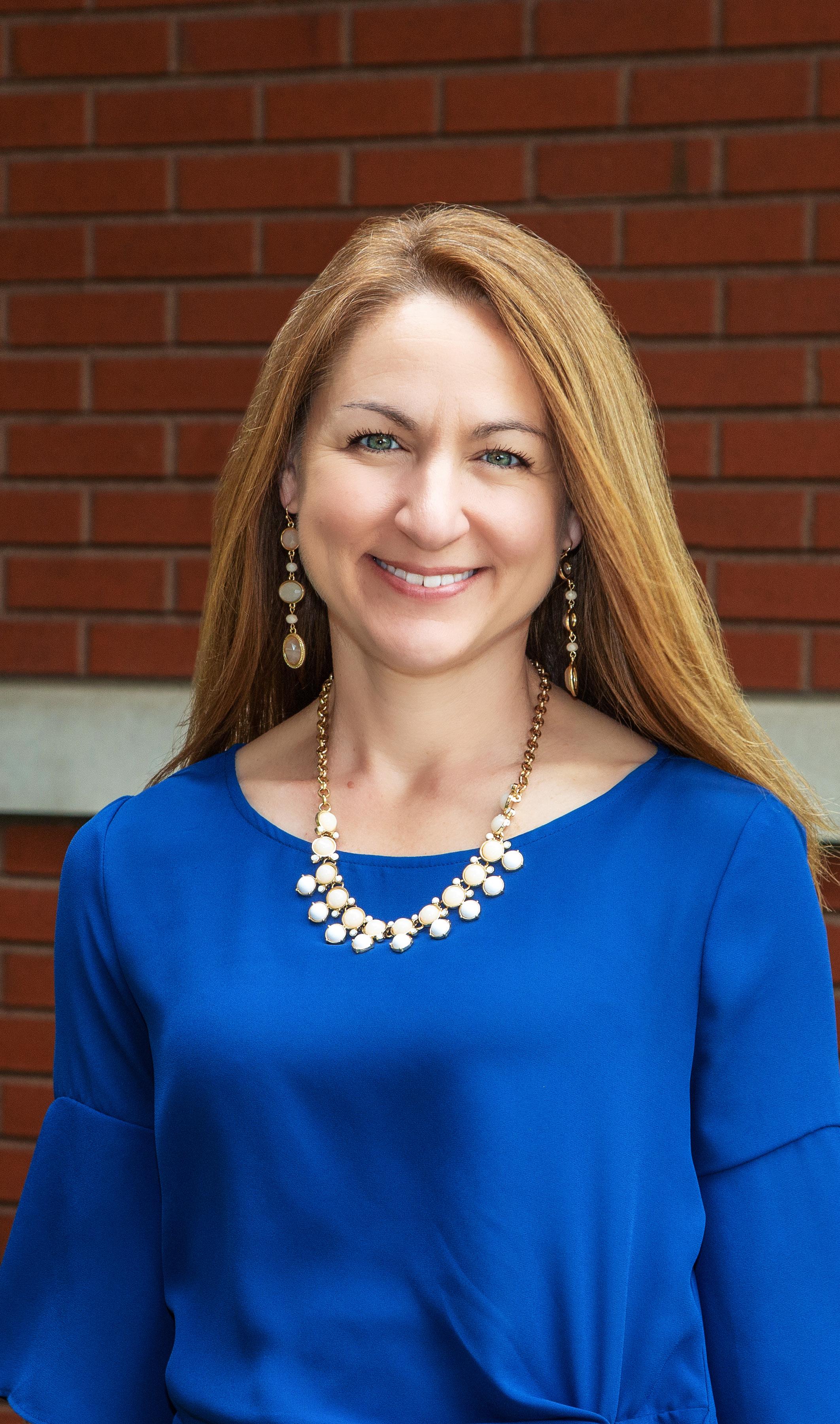 Heather Vidourek SVP of Human Capital Farm Credit Mid-America
Heather Vidourek SVP of Human Capital Farm Credit Mid-America
“What I learned through being a leader is that it’s not about being the answers person. It’s about getting the right, diverse group of people together who can create the right answer, and make things better together.”
HEATHER VIDOUREK
anybody in any position can coach any other person—up, down, across reporting lines and team lines—because we believe that if we do that with the spirit of helping other people, then we’ll all be better because of it.”
Greg Harris, CEO of Quantum Workplace, agrees. “Cultures thrive when continuous improvement is a priority, and Heather gets that,” Harris says. “Quantum Workplace is honored to help her and the Farm Credit Mid-America team make that a reality.”
To bolster this effort, Vidourek and her team adopted a program called “The Heart of Coaching.” Open to all employees, people join the program not only for the benefit of improved results, but also to learn how to be an effective, engaging coach to others. Through programs like these, Vidourek ultimately hopes to establish a culture that fosters leadership potential from all levels of the organization and starts from the moment a new employee is hired. In fact, every new
leader at Farm Credit Mid-America attends a foundational course based on the book Leadership Pipeline by Ram Charan, Stephen Drotter, and James Noel.
“The course discusses how leaders need to make a turn from individual contributor to a leader of others, which includes shifting what they value, how they spend their time, and what skills are needed,” Vidourek explains. “What’s unique about how we deliver this program is that while we have an outside facilitator, our CEO Bill Johnson and I cofacilitate with this outside facilitator. We invest this time so that we can bring the content to life within our organization, get to know our up-and-coming leaders, and learn what’s going on in the organization from the leaders’ perspectives.”
In this same vein, Vidourek sponsors a grassroots group of Farm Credit MidAmerica team members who connect, develop, and empower people through
different experiences across Indiana, Ohio, Kentucky, and Tennessee. The goal is to strengthen engagement across the four-state area by creating stronger bonds among all team members. Then, every other year, the collective hosts a summit where all members can meet in person to celebrate positive changes and connect over a mutual bond, all stemming from the values they work hard to preserve.
“We engage people across the organization to discover better solutions,” Vidourek says. “What I learned through being a leader is that it’s not about being the answers person or leading from the front. It’s about getting the right, diverse group of people together who can create the right answer, and make things better together. Everything we do centers on being honest, respectful, and committed to care for the people in rural communities and agriculture who provide so much for us.”
“We invest this time so that we can bring the content to life within our organization, get to know our up-and-coming leaders, and learn what’s going on in the organization from the leaders’ perspectives.”
HEATHER VIDOUREK
“Quantum
 - Jamie Swain, Assistant Vice President of Human Resources
- Jamie Swain, Assistant Vice President of Human Resources



From her team to internal partners to external partners Jill Livesay uses communication, team building, and automation to do accounting better
By KATHRYN KRUSECarMax is a leader, disruptor, and innovator in the used car industry.
Jill Livesay, chief accounting officer and controller, takes on those same roles within the company. She creates change through returning to the basics: people, process, technology. “We are shifting away from traditional order takers with closed reporting. We are moving to a new consultative and integrated approach,” Livesay says. This is an approach and experience she wants to offer internal and external partners.
Livesay fulfills a traditional accounting role in her Fortune 500 company. That means focus on fiduciary excellence, presenting confidence in financial records, and ensuring internal and external excellence. It also means compliance with laws and guidelines.
Livesay is also taking on a nontraditional role as strategic partner. Since her start with CarMax in 2016, she has brought her team
out of the cubicled shadows many accounting departments inhabit and into the light of internal partnership. “A business begins and ends in accounting,” Livesay says. “But usually accounting departments are not proactive and are even seen as resistant.” Livesay believes that this is because they are not a part of processes from the beginning, and she is working to transform that paradigm.
Putting communications first, Livesay ensures that other departments understand the how and whys of her team. She provides simple summaries of significant accounting disclosures. And as her team implements tech transformations, Livesay offers an accurate view of these changes. She is conscious of her audience and tailors all communications to impact specific readers. Livesay sees this work improving confidence in the team’s proactivity. It removes the veil of mystery around what goes on in the accounting department and helps shatter a siloed business approach.
Just like Livesay and her internal and external partners, CarMax wants to provide an honest experience to car buyers. Fourteen years ago, after a decade in operation, the company decided to let customers drive their experience, a re-revolution. Now, it is undergoing a third wave of change through digital transformation, an omnichannel experience that allows customers to choose preferred levels of interaction.
Within her own team, Livesay is also focused on digital transformation. Currently she is bringing robotics process integration to accounts payable and inventory accounting data collection. Robotics is also playing a role in the payroll department processes, leading to quicker reconciliations. Looking at automated procure-to-pay implementation, CarMax will have a faster and more accurate process for creating purchase orders and developing preferred payments.
While speed and accuracy are excellent outcomes for this digital revolution, Livesay is most excited about the space for reallocation of resources automation provides. “The tech allows us to scale and be agile,” Livesay says.
“We are not just order takers, we are business consultants,” Livesay says, explaining her team’s new role at CarMax. “We truly integrate within the business.” She is

The role of the C-suite is transforming. Controllers are often expected to serve as stewards of the company’s financial statements and operators of a highly efficient financial reporting organization. However, operating in a rapidly changing environment can present as many challenges as opportunities. Deloitte offers labs to advise C-suite executives, who are held to—and expected to set—high standards.
Deloitte’s Next Generation CFO Academy is a first-of-its-kind experience for finance executives. Delivered over three days, the Academy provides executives with an opportunity for preparation, self-reflection, and hands-on scenario planning. In addition, Deloitte offers an intensive one-day Controllership Transition Lab focused on three critical aspects: time, talent, and stakeholder relations.
Deloitte congratulates Jill Livesay on her career milestone. We are proud to be part of your journey and wish you many years of success.
www.deloitte.com

changing the identity of accounting within the company. “We can be the department that doesn’t just say no. We can be the department that says, ‘Yes, but . . .’ Or even, ‘Yes, and . . .’” Livesay is using automation as a catalyst to getting a seat at the table.
Livesay is also changing the culture within her team, focusing on empowerment. While introducing leading-edge tech supports achievement, she also provides opportunity for skill development including leadership courses and cohorts. She fosters an increased level of employee engagement. Internal programs for career development have proven effective and CarMax sees employees moving into leadership roles, promoted from within.
Livesay’s team of seven people provides an array of skills, from accounting knowhow to institutional knowledge to project management skills. These skills support the group as a whole, and, in turn, the group supports the development of these skills. Livesay brings ideas of collaboration and inclusivity to the team, and as they work on
financial redesign and look at fundamentals, everyone is involved in the five-year accounting systems roadmap. Team members help select vendors and team members lead projects as well.
Livesay credits a role prior to CarMax, in helping her develop best practices. She supported a company going through huge growth, much of it through mergers and acquisitions. She says, “Integrating new ideas and employees taught me important skills and provided useful tools that lead back to my basic philosophy: people, process, and tech.”
At CarMax, with the help of trainings and discussions, the team embraces change and Livesay sees more engagement with associates. “The team has brought themselves up to a new level,” she says. People are motivated to do their best work.
It is not only Livesay’s observations that suggest positive impact. Surveys, both internal and external, indicate that the team’s increased proactivity and more updates, collaboration, and inclusion. There has also been
a higher level of service and responsiveness from the team.
Every leader has a different way of inspiring trust, and for Livesay it is about powerful networks that support a transformation. The used car market is competitive and fragmented with a diverse business model, and CarMax’s footprint and level of recognition is unique. Within that space Livesay encourages individuals reaching their full potential, and she builds cross-functional teams. She believes this is possible because of relationships. “Build a trusted and diverse network,” Livesay says. “Don’t shy away from new projects outside your regular sphere. They can help you understand ideas and have a better grasp of a business in general and make connections. Take on roles and responsibility outside of your comfort zone.”
When asked about advice for anyone interested in her field, Livesay says, “Leave everything—projects, companies, people—in a better place than when you started.” After her first few years at CarMax, Livesay is clearly following her own advice.
“Leave everything—projects, companies, people—in a better place than when you started.”
JILL LIVESAY
Being a leader takes more than drive to have a successful career. It also takes dedication, courage and integrity. We think these words aptly describe Jill Livesay.
Jill, your colleagues at PwC congratulate you on being featured in Profile Magazine. We wish you continued success in your career and look forward to working with you in the future.
www.pwc.com
Five years into an auditor role for a public accounting firm, David Clothier knew he didn’t belong there much longer. “Everyone smiles when they see you, but you know they hate that you’re there,” Clothier says with a charming, slow drawl. “The only day that smile is actually genuine is the day you’re leaving.”
The part of the job Clothier found most rewarding, the management letter that provided the company with ideas to improve their business practices, was too small a part of the process. After spending a month in over a hundred businesses, Clothier decided he would like to do more than find problems. He’d like to implement solutions.
Twenty-seven years in, the now vice president of finance, treasurer, and controller for
Pilot Flying J has helped initiate process evolution in the $25 billion company with more than 30,000 employees.
Far more than just a numbers guy, Clothier has his hands in several key initiatives that are fundamentally changing the way Pilot’s Travel Centers and stores work, including a company-wide initiative to literally eliminate half of all tasks that employees do in stores.
Pilot has successfully implemented cash recyclers with outcomes that are having both immediate and long-term effects. The bulky machines essentially look like giant ATMs and are located in full view of customers in the store.
At the beginning of the day, employees type in a code and receive their till money for
David Clothier VP of Finance, Treasurer, and Controller Pilot Flying Jthe day and deposit it back into the machine when finished. “We determined that we spend almost a full-time job just touching coin and currency,” Clothier says. “These machines now report back balances immediately, credit our account, and the bank picks it up without us having to do a thing.”
If a retail business like Pilot isn’t constantly looking for ways to evolve, Clothier explains, they’ll be out of business. “Everything about retail now is about efficiency, efficiency, efficiency,” he says.
“We forged a relationship with David seven years ago on our Currency Processing Solutions recycler program,” says Michael Brooks, vice president of cash logistics at Fifth Third Bank. “David’s forward-thinking thought leadership has allowed our fully managed service approach to solve Pilot Flying J’s cash logistics needs.”
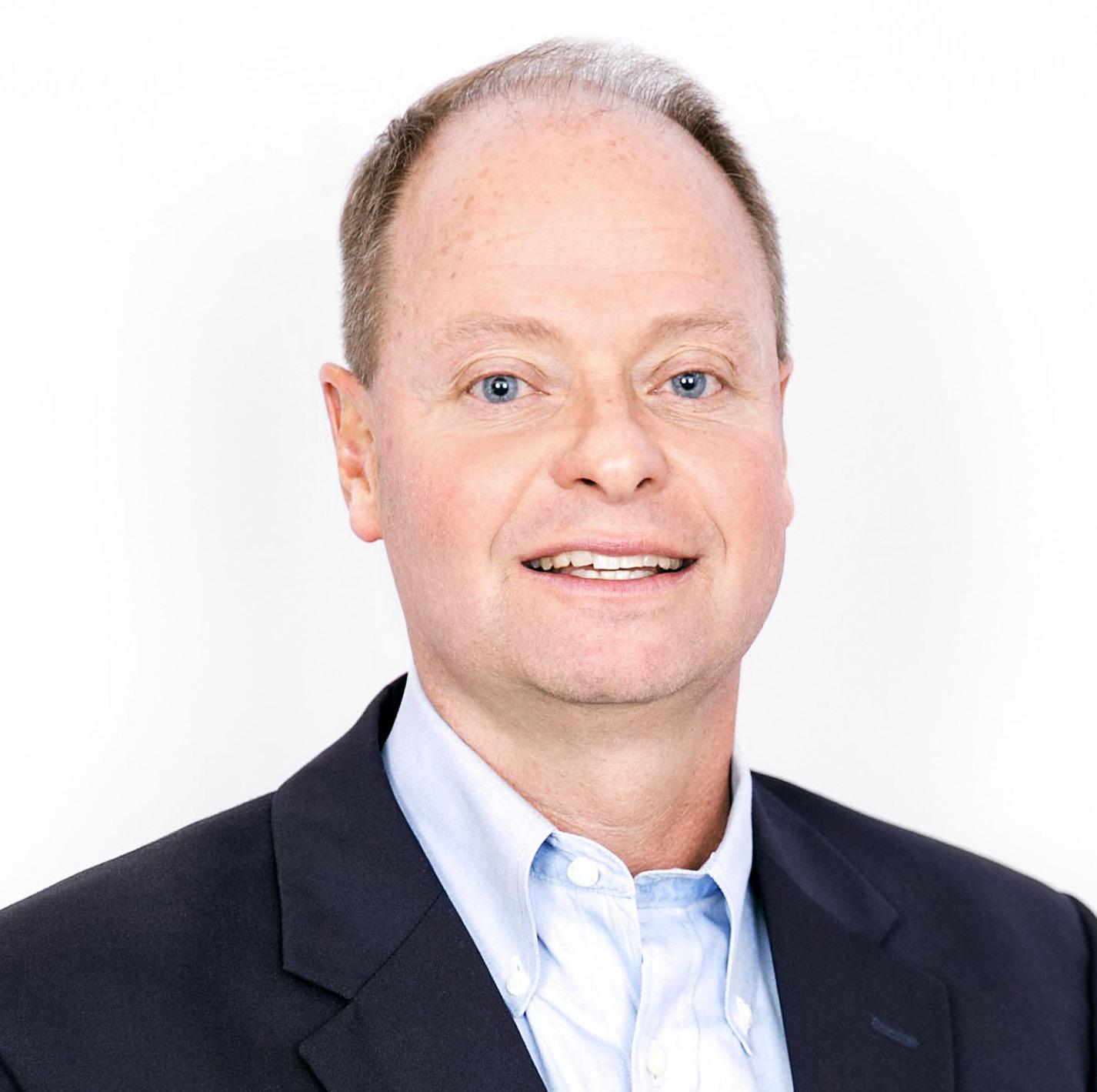
The cash recyclers have also had unintended advantages. Pilot’s average of about four robberies a month has dropped a staggering 95 percent. “You can only get $250 out of the machine at a time,” he says. “And, frankly, I think the people committing these crimes figured out very quickly that they weren’t really enjoying their robbery experience.”
Because safes are no longer on-site holding large amounts of cash, there just isn’t enough incentive for robbers.
In conjunction with successful cash recycler implementation, Pilot is also piloting an electronic locker device program to combat stores’ constant need for coin on hand. Instead of paying an armored vehicle $1,000 to deliver $300 worth of nickels once a month, Pilot has installed electronic lockers at a number of locations whose contents are filled routinely by UPS.
Whenever a store is out of necessary coinage, they simply get a code from a store website, input the code on the locker, and the amount of coin is automatically debited to store HQ. That coin is deposited
immediately into the cash recycler, and the process is complete.
Here, too, there have been unintended benefits. “We’ve eliminated another reason why money can go missing,” Clothier says. “We expect every store to understand their tills should come in at $0 every single day, no questions.”
Second, it keeps bulky and weighty bags of coin from piling up in offices that had recently been cleared of cash thanks to the recyclers. “Nobody has to count anything, and we’re hoping it’s just another way to make someone’s day simpler,” Clothier says.
When the HR department expressed a need for better HR systems at Pilot, Clothier says a novel idea presented itself. Pilot elected to buy the full suite of services from the company that was already providing their financial processes, relative upstart Infor.
“We liked them because you could actually talk to them,” Clothier says. “The other systems would be about ten times the cost, three times the implementation time, and they really didn’t care if they could solve your problems or not.”
Clothier said the success of the Infor implementation is rare for a number of reasons. “Rarely is an ERP a unified set by the same system, often because egos at the senior management level won’t allow it,” Clothier says. “No ERP is going to be the absolute best at every single process, but Infor has demonstrated the willingness to help us solve for the things we need it to do.”
It doesn’t hurt that Infor was the first company to operate exclusively from the cloud. “Those big companies are currently going through hell right now trying to get everyone moved to the cloud,” Clothier says. “We were already there, and it has paid off in spades.”
There is a board in Clothier’s office with forty-some projects either in the works or mapped out. The company was able to leverage Western Union into overhauling its lengthy transaction process down to mere minutes. Another process slashed.
Looking ahead, Clothier says he’s intrigued by presentations he’s seen involving artificial intelligence’s ability to read, pay, and account for services automatically, without a human ever getting involved.
Nearly three decades in, Clothier says he feels like he’s just getting started.
“Nobody has to count anything, and we’re hoping it’s just another way to make someone’s day simpler.”
DAVID CLOTHIER
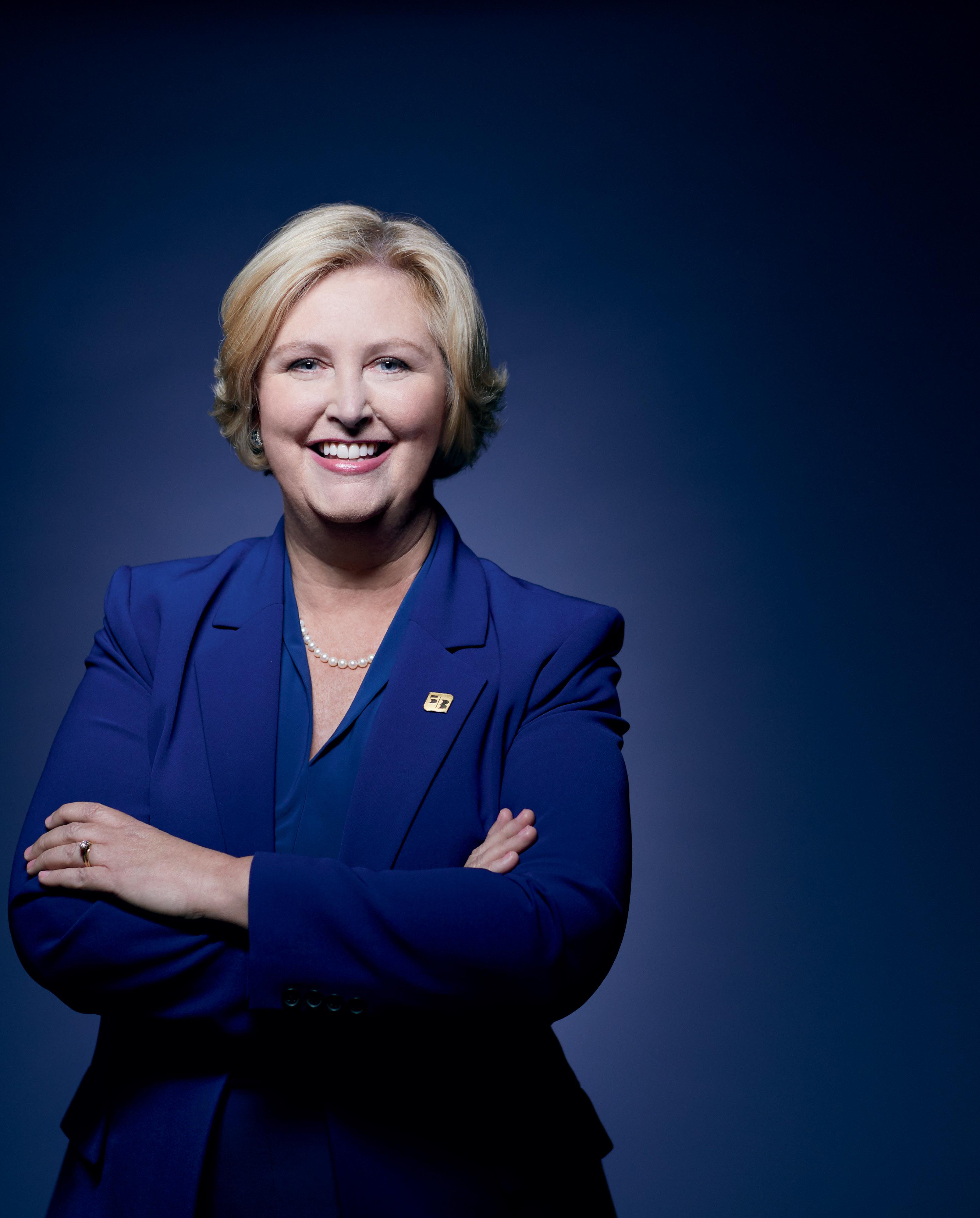
Roxanne Klein provides a look into Knoll’s quest to implement a new ERP system across the company
By CLINT WORTHINGTONWWhen furniture and textile company Knoll saw the need to revitalize its enterprise resource planning (ERP) platform, everyone from IT to human resources took part in the search for a new system that would be not only scalable but also easily implemented across Knoll’s many businesses.
Knoll began the long, arduous search for the ideal replacement for its ERP system. Eventually, the search led them to Oracle, a cloud-based system that uses machine learning and artificial intelligence to anticipate the needs of its users. Roxanne Klein, senior vice president for human resources at Knoll, takes Profile behind the curtain of the Oracle implementation.
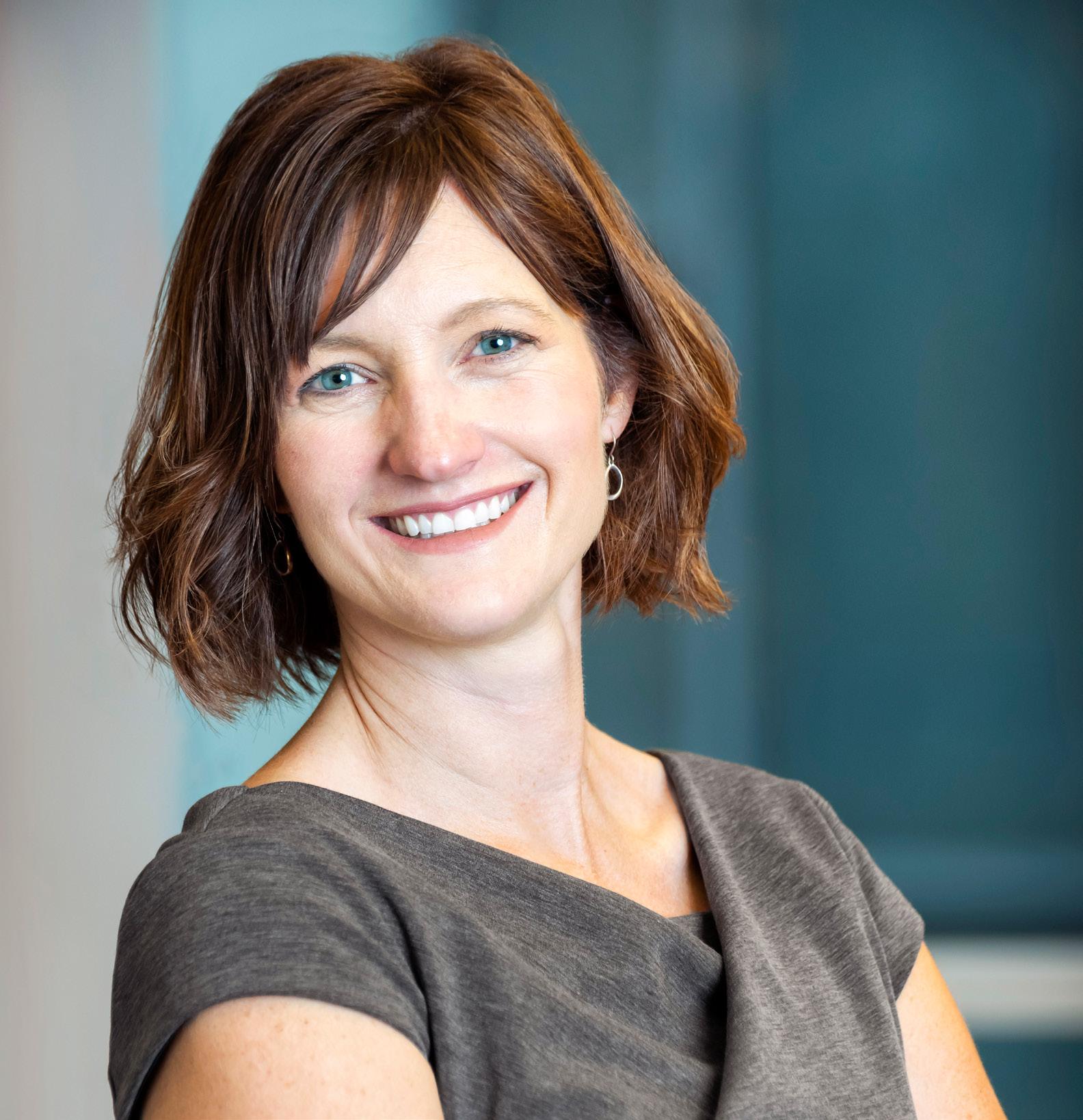
Knoll’s existing system was implemented many years ago and had been so specifically customized to the business that it eventually became ineligible for upgrades. The company had to create its own team of experts. “It had become more urgent for the business to make the system change,” Klein says.
While Klein wasn’t directly involved in the search process, she recalls a number of stakeholders taking part in a years-long search to find the right ERP software to update the existing platform. Companies like SAP and many others were considered, with the executive team sponsoring the search and getting heavily involved in the process. IT and business leaders received demos and talked through the capabilities and functionality of each process.
Eventually, their eyes turned to Oracle. “There are a lot of great systems out there,” Klein says, “and Oracle seemed to be the right platform for us.” While the system had a lot to offer, Klein notes one of its greatest strengths is its scalability. “We have brought together many businesses over the years,” she notes, “but we haven’t leveraged the backend integration of these business processes the way we could have.”
Because Oracle is so easily applied to enterprises of all sizes with little loss in compatibility, Knoll saw it as an ideal platform to implement.
Despite Oracle’s scalability and ease of use, the early days of its implementation into Knoll’s ERP carried no shortage of challenges.
Their first test into one of Knoll’s smaller businesses “faced tremendous challenges,” according to Klein. “We didn’t address the change management [aspect],” she says. The team overcustomized Oracle to that specific business instead of using more of its out-of-thebox functionality. “We didn’t make it better; we just took our current business processes and dropped them into our new system.”
Klein joined the finance and procurement team during the next implementation, with hopes of putting a fresh pair of eyes on the problem. A twelve-year veteran of the company with decades of HR experience in a variety of different industries, Klein immediately saw the need for HR to take a
more direct role in the implementation process. “The team was really struggling; the role of change management was not well understood,” she notes. She also saw the challenging dynamics at play in the project’s team meetings.
Of the implementation’s newfound success, Klein credits Knoll CEO Andrew B. Cogan for recognizing when problems arose and asking for help moving the process forward. “Oracle’s a great system,” she asserts, “but at the end of the day, it’s not simply the tool; it’s the talented people and their commitment to making it work that makes all the difference.”
To that end, Klein and her team identified gaps in process and communication and
Roxanne Klein SVP of Human Resources Knoll
Deloitte Consulting is proud to work with executives like Roxanne Klein at Knoll Inc. who take a bold leadership role in their business transformation.
Congratulations to Roxanne for her accomplishments across the Knoll organization.
Imagine now with Deloitte and Oracle.
www.deloitte.com/oracle
came up with activities to bring people into a more streamlined, cooperative process. Eventually, she landed on “a team that started working really well together,” Klein says.
She also helped select and hire a new chief information and technology officer, Usman Waheed, who brings a wealth of ERP experience to Knoll. Waheed demonstrates the same level of commitment to supporting the team and understands how critical change management is in a business transformation like this.
Since these changes, the momentum for Knoll’s ERP implementation process has continued to build, and the team is thrilled with the results. One particular coup was seeing the smooth implementation of Oracle into Knoll’s order management system—a scary phase of the project because it’s so customer facing. “It could not have gone better,” Klein notes, the change going through without “any complaints from customers and partners.”
Currently, Knoll is preparing to implement Oracle into its manufacturing systems, which Klein hopes will go as smoothly as order management. Throughout the process, Deloitte has partnered with Knoll and to ensure the implementation of Oracle goes as smoothly as possible. It’s something Klein is particularly grateful for. “Picking the right external partner and committing your top talent to a project is the key to successful initiatives like this,” she says.
As Knoll continues to integrate with Oracle, Klein is thrilled by the possibilities for growth, modernization, and business transformation this upgrade presents the company. “This should give our team the right tools to continue to improve the business.”
“Picking the right external partner and committing your top talent to a project like this is the key to successful initiatives.”
ROXANNE KLEIN
When Patty Trevino was growing up in Brownsville, Texas, the traditional thing to do was go to college and become a teacher. But she didn’t want to settle for it. “I didn’t want to become the expected teacher from Brownsville,” she explains. “Not that there’s anything wrong with that, because I have a lot of friends who are teachers, but it just wasn’t my passion.”
So, Trevino approached a career counselor, who helped her identify a new passion: marketing. She switched her major from education to marketing, breaking away from the Brownsville mold. Twenty years later, Trevino is pushing boundaries and building an innovation pipeline as senior vice president of brand marketing for Carl’s Jr. at CKE Restaurants Holdings.
It was during her first role as senior account planner at Bromley Communications that Trevino learned about Carl’s Jr. Her first client was Burger King—she eventually spent seven years working at the corporation—and she fell in love with the quick service restaurant (QSR) industry. The fast pace and the boldness of the industry immediately drew her in. As part of her role, Trevino had to understand not only Burger King’s brand but also what other big competitors, such as Carl’s Jr., were doing in the market.
“I was obsessed with Carl’s Jr. and everything that they were doing from an innovation perspective,” she says. “I always felt they never really followed the rules. They were a brand that broke the rules, and they weren’t afraid to set their own path.”
After spending time at Burger King and detouring into the casual dining industry, Trevino wanted to get back into the QSR industry. The vice president of marketing role at Carl’s Jr. came across her desk and she took it, eager to work with the boldness and personality of the brand the now SVP of marketing had always admired.
When she joined the company in early 2018, the team was beginning to build an innovation pipeline. “We went back to what Carl’s was known for,” Trevino explains, “and it was really about pushing the innovation or the flavor boundaries of our burgers.”
 Patty Trevino
SVP of Brand Marketing, Carl’s Jr. CKE Restaurants Holdings Inc.
Patty Trevino
SVP of Brand Marketing, Carl’s Jr. CKE Restaurants Holdings Inc.
At Carl’s Jr., innovation is not just about stacking toppings on the burger. Carl’s Jr. was the first brand to introduce the turkey burger and introduced the 100 percent Angus burger. So, in 2018, Trevino and her team looked at how to push the envelope again. Enter Beyond Meat.
There had been a huge increase of flexitarians, so the Carl’s team met with Beyond. “We were putting a plan together a week after our first meeting,” Trevino says. “We decided to launch at the end of December, and we’ve seen some really great success.”
Flavor boundaries aren’t limited to the protein of choice. This time, Carl’s went the high-end route: truffles. For a limited time in spring 2019, Carl’s added the Bacon Truffle Angus Burger and Bacon Truffle Cheese Fries to its menu.
“When you think about it, people don’t necessarily consider buying truffles from fast food,” Trevino says. But the menu innovation doesn’t stop there. “Innovation is not just about identifying new flavor trends but also leaning into what you’re known for.”
A staple burger on the Carl’s Jr. menu is the Western Bacon Cheeseburger. Trevino and her team worked with the Carl’s Jr. culinary team to create a promotional platform for the burger. First, the culinary team created a seasoning for the new Western Fries, served with a side of barbecue sauce. The original Western Bacon Cheeseburger features one burger patty, maybe two.
“We said, ‘Why not introduce a triple,’” Trevino explains. “People love to indulge in and try big, delicious burgers.”
Over the next few years, Trevino and her team will be pushing the boundaries even further to create innovative and indulgent items for Carl’s Jr. customers and beyond. They’ll be looking outside of the typical cheese and bacon and seeing what other protein and meat blends can find a home at Carl’s Jr. And the core menu will always be top of mind as Trevino and her team ask themselves how to extend the core flavors into breakfast or snack items.
“One critical thing to keep in mind is that when you do expand those flavors to other
areas of your menu, they have to remain true to that original product. We’re not going to just create a Western Bacon Cheeseburger shake just because it sounds amazing,” Trevino says.
The number one thing to keep in mind when innovating your brand is to understand what consumers want or need from the brand today, she explains. Not the brand from ten or fifteen years ago. That’s especially important in the fast-paced QSR industry.
The second thing is to keep your brand relevant in today’s advertising. “Fifteen years ago, when I was working at the agency, the most important thing was knowing all the different TV channels that our consumers were using,” Trevino explains. “Today, our younger audience is making sure we stay relevant in our digital marketing.”
Twenty years into her career, Trevino has found a home in the industry she fell in love with after college graduation. “The expectations of what I was going to be were very limited,” she says. “When you ignore those glass ceilings, you can achieve anything.”
“Innovation is not just about identifying new flavor trends but also leaning into what you’re known for.”
PATTY TREVINO
“I take responsibility for our people and our communications, but my role is ultimately focused on our culture,” says Rebecca Sinclair, chief people and communications officer of American Tire Distributors. As the major driver of the organization’s human capital strategy since 2017, Sinclair has worked diligently to manage transformational culture change across ATD’s more than 140 locations throughout North America.
Sinclair has decades of experience in the human resource field, learning virtually every aspect of HR’s role in business from some of the most well-regarded global
brands. In each role, she progressively learned valuable lessons that she carries through to her work in modernizing ATD’s unique approach to HR, which encompasses culture, talent management, knowledge growth, and communications.
Sinclair’s formative years were defined by her time at Victoria’s Secret, which provided unique opportunities that shaped her path forward. “I learned the value of focusing not just on HR but the business as a whole,” she notes of her time there, which granted her a window into a premier brand and the importance of innovative thinking that begins with the associate journey.
From there, she went to Starbucks, where she helped develop the divisional HR support
model that matched the company’s high growth and transformation by focusing on the next generation of retail talent to fuel performance. Great leaders have mentored Sinclair throughout her career, and she has learned the power of accountability, living by your core values, knowing that failures are opportunities, and that empowering people will accelerate a company’s ability to drive culture at scale.
Given her experience in a wide variety of industries, entering the tire distribution business at ATD was an exciting opportunity. “It’s a different business sector, but my experiences prepared me to be able to architect a strategy that would be agile and support the business transformation,” Sinclair says.
Both ATD and the replacement tire industry itself were on the cusp of unparalleled change. For more than eighty years, the replacement tire industry business had been stable, predictive, and framed in tradition.
The perfect storm in an evolving industry advanced plans to modernize the culture and embrace innovative technology to position the company to lead during this unprecedented time of change. “Now we are the most connected and insightful automotive tire provider in the industry,” Sinclair says.
So, how does one start to transform the culture, talent management, and communications for a company in an industry that has been doing things the same way? The answer: Get connected. Connect everything
and everyone, through cutting-edge technology and analytics, to the mission, the strategy, the culture, and the values.
As such, digitization has become an integral component of Sinclair’s work at ATD. However, there was one, very big problem—the majority of the associates were field-based, or “deskless,” and constrained by the rigors of a day serving customers.
Shortly after joining, Sinclair set to work introducing the sales and supply chain team to the Spark modern learning platform. Her modern approach, fueled by technology and advanced analytics, allows HR to offer definitive proof points to leadership and board members how increasing seller knowledge is linked to actual sales growth, and to
pre-emptively test strategies to see which ones lead to more profitable outcomes. “Imagine a world where HR is not just training people,” Sinclair says. “They come to us because we’re knowledgeable and can drive business outcomes.”
Expanding knowledge was a valuable growth opportunity for not only the associate but also ATD. That clear connection to analytics and results has guided each subsequent evolution at the company.
One of Sinclair’s most ambitious initiatives is to seamlessly align internal and external brands. “It’s a sign of a very modern company to streamline these functions,” she says. The new function allows management to communicate with every single worker at

Willis Towers Watson is proud to congratulate Rebecca Sinclair on her outstanding work transforming the culture of ATD though a People-First strategy.
the push of a button, including associates who are deskless. The HR department now plays a vital role in extending ATD’s brand and corporate culture.
All of this work is meant to advance ATD’s knowledge culture, which Sinclair praises the company for prioritizing. “We’re innovators and strategists, but also engineers,” she says. “Everyone on my team is an entrepreneur, always thinking of the next idea.”

By completing projects like digitizing the entire associate experience and providing more efficient communication across the company, Sinclair and her HR team have played a vital role in connecting every associate to what they need to know, how they need to do their jobs, and their role in the mission and vision of ATD.
“While our products and services are obviously critical to our success, the truth is that our associates are the connection to our customers. So, it only makes sense to ensure that our associates are closely connected to our culture and our vision,” she explains.
Between their innovative enterprise change management initiatives and the integration of state-of-the-art technology HR plays a vital part in that equation. For Sinclair, this comes down to the strong knowledge of culture she has created in ATD. “They’re hungry for opportunities to learn,” she says.
As chief people and communications officer, she leverages modern technology and advanced analytics allowing leaders to know what their people know, what they don’t know, and where there are growth opportunities. And, thanks to these new initiatives, she can drive her team—and ATD as a whole—toward even greater success. When associates are knowledgeable, appreciated, and engaged, they are passionate and create the future of a company.
Willis

www.willistowerswatson.com


“Imagine a world where HR is not just training people. They come to us because we’re knowledgeable and can drive business outcomes.”
REBECCA SINCLAIRTowers Watson
is a leading global advisory, broking, and solutions company that helps clients around the world turn risk into a path for growth. We deliver solutions that manage risk, optimize benefits, cultivate talent, and expand the power of capital to protect and strengthen institutions and individuals.
Amalgamated Bank has always been on a mission and, as one of its top lawyers, Mandy Tenner helps define what that means in the modern era
It’s hard to imagine Mandy Tenner being more perfectly suited for her job.
The senior vice president and deputy general counsel for socially responsible, New York City-based Amalgamated Bank works in an unusual space. The ninety-seven-year-old financial institution was chartered by the Amalgamated Clothing Workers of America union, and remains largely owned by Workers United, an affiliate of the Service Employees International United (SEIU). Over time, the mission of the bank, which is publicly traded and a Certified B-Corporation, has broadened to advance socially responsible causes such as sustainability, social justice, political organizations, and other social-impact enterprises.
Tenner’s own background might not have been a sure path to financial services law, but relative to Amalgamated, it makes a lot of sense. She is the granddaughter of Holocaust survivors and learned at home about selfless acts that saved lives during and after World War II. “My grandfather placed surviving children in homes after the war, and my grandmother was always grateful for the people who helped her survive,” she says. “I felt the need to pass that on.”
After undergraduate and graduate study in history, political science, French, and finance, she worked for the New Jersey Division of Youth and Family Services prior to interning for Amnesty International during her time in Paris. When she returned to the US, she joined Guggenheim Partners as a paralegal. There, her boss offered to pay the expense for Tenner to take the LSAT, after which she continued working while going to Brooklyn Law School. Clerking and internships led to her work for a global power company, ContourGlobal, which included legal responsibilities in Rwanda.

Since coming to Amalgamated in 2016, Tenner has fully embraced the ethos and business of values-based banking. “It’s in our lending, our employee policies, and in the support we provide to clients,” she says. The bank has more than $40 billion in custody and investment assets under management.
So how does a bank maximize shareholder value while serving other, nonfinancial objectives? Tenner explains that Amalgamated’s
“As a B-Corp, we are accountable and transparent about sustainability, employee ownership, staff diversity, and other impacts on society and the environment.”
investors understand long-term value and Amalgamated’s unique position as a values-based bank.
“There is a type of investor who looks for what we do,” she says. “We say we are ‘values-aligned.’” She also recognizes that all federal and state banking regulations on safety and soundness apply to them as any other bank.
But the bank’s status as a certified B-Corporation, and its commitment to align with the UN Principles for Responsible Banking, speak to an even higher standard for its charter. Tenner oversees the related filings for this, which she reports were extensive. “As a B-Corp, we are accountable and transparent about sustainability, employee ownership, staff diversity, and other impacts on society and the environment,” she says. In these designations Tenner and others forged new paths: Amalgamated is the biggest B-Corp bank in the US, and the first American bank to sign on to the UN Principles.
In addition to fulfilling the extensive reporting requirements to maintain the B-Corp certification, she holds multiple responsibilities at the bank, including engagement with the bank’s governance structure. By sitting in on key decision-making committees, including company board meetings, she observes how deep the values-based banking mission goes at Amalgamated. “For example, when discussing new products someone will ask, ‘How does this impact low-income communities?’” she says. “That’s true even behind closed doors.”
But perhaps her favorite work at Amalgamated are her roles with the bank’s foundation and in her own pro bono work.
Amalgamated Foundation, a 501(c)(3), is a donor-advised fund that took a stand in 2019 by initiating a campaign to prevent funding of groups that run at odds with the bank’s mission and ethos. According to Tenner, some organizations operate legally as charities while promoting discrimination—they intend to avoid them and are calling on others follow suit. “We have policies to screen out groups that are identified by organizations, such as the Southern Poverty Law Center, as hate groups.”

Tenner’s pro bono engagements are typically with individuals who need legal assistance. In a recent case from the Transgender Legal Defense and Education Fund, she helped a transgender man change his name. Tenner also worked with Immigration Equality to help a bisexual man from Mauritania find asylum in the US, and he is now gainfully employed.
“The bank was generous in the time I had to give to him, and in covering court fees,” says Tenner, who recently took on a case from Immigration Equality for a gay man from Venezuela. “Others on the management team do lots of things like this. It’s the culture of Amalgamated Bank. Community is important to us.”
Nelson Mullins is pleased to recognize the accomplishments of Mandy Tenner and Amalgamated Bank. Amalgamated Bank is America’s most socially responsible bank, and Mandy is a key member of the bank’s legal team and a pleasure to work with. Nelson Mullins has a leading financial services practice, combining industry experience, a command of the regulatory environment, business-focused transactions advice, and creativity to achieve results. We are particularly proud to work with Mandy and Amalgamated and to share their vision of helping those who do good, do better. Visit nelsonmullins.com to learn more about our firm and our financial services practice.
Stephen Clemons leverages his experience running large organizations to keep California on the cutting edge of energy efficiency
By BILLY YOSTStephen Clemons says that having the opportunity to be creative in providing technology solutions is absolutely critical to being satisfied, regardless of the position he’s in.
The current chief information officer at the Sacramento Municipal Utility District (SMUD) has spent twenty years finding new and innovative ways for technology to help raise the bar at some of California’s largest public and private institutions. His current work at SMUD is helping one of JD Power & Associates’ consistently top-rated electric utilities (for residential and business customer satisfaction) find increasingly powerful ways to facilitate customer interaction and provide energysaving solutions for the nation’s sixth-largest community-owned electric service provider.
“Stephen’s experience as a CIO covers a vast range of networks across public and private organizations,” says Peter Martini, president and cofounder of iBoss. “He has a deep technical expertise, but what makes Stephen stand

apart is his ability to see across different technologies and how they impact the commercial aspects of the organization which is essential for any modern day CIO.”
Clemons has overseen technology integration and executive roles for a variety of organizations ranging from pure technology companies to the entire state of California. “Being a CIO is about being able to collaborate with people, and in my case, the scope and scale of that group was very large,” Clemons says.
At the San Diego County Office of Education, Clemons oversaw data operations for 41 school districts that included 375,000 students and more than 55,000 employees, the third-largest academic payroll in the country. “Working in that environment with so many people and such a diverse portfolio, from running data centers to providing teacher trainings, it really got me to understand that to implement technology successfully, we had to be able to explain how to use that technology effectively.”
Placing a premium on understanding how customers, clients, and employees alike use technology would prove an enduring lesson, and one that consistently informs the CIO’s role at SMUD. “One of the biggest focuses here has been about how we get technology into the hands of our customers,” Clemons says. “Not just from a pure technology perspective but also in how they interact with it, whether it be by phone, email, or text.” SMUD has overhauled its billing process and allowed customers who may have had their power disconnected reconnect much more easily and without having to be passed around on what customers can see as a customer service carousel.
SMUD has also proven to be one of the most energy-efficient-minded utility organizations, not just in California but in the entire country. Clemons says the increasing focusing on the internet of things (IoT) has kept the organization at the forefront of energysaving initiatives. The potential for technology
like smart thermostats to provide immediate feedback back to SMUD and even allow the two to collaborate on ways to save money is an increasingly real prospect.
“So many more of these components are becoming connected,” Clemons says. “From electric vehicles to Wi-Fi-enabled pool pumps to smart thermostats, these are all realistically connected to the grid in some form or another, and it’s interesting to examine what’s possible.”

One of SMUD’s most surprising and welcome additions to its own revenue stream has been the response to the organization’s SMUD Energy Store, an online retail operation offering customers a variety of smart and energy-saving technologies. “We wanted to start small to see what the response would be,” Clemons said.
From conception to execution, the store was operating in three months. Within six months, the store had done $1.2 million in sales. “We’re selling more and more every day and providing value to our customers in terms of energy efficiency,” Clemons says. The additional revenue doesn’t hurt either.
Having an operational online store with a key distribution partner up in three months isn’t wildly impressive to Clemons. It’s just a byproduct of some of the lean-minded methodologies he has worked to ingrain in order to enable speed, efficiency, and cross-functional teamwork. “When I first came here, teams were operating with project plans and reporting, but operating Agile brings stories and epics to life about what you’re trying to create,” Clemons says. “I knew it was making a difference when our CEO started sharing videos about Agile with the whole organization.”
“I’ve worked with SMUD for twenty years and have found Steve very effective at getting

his team to buy-in to his vision and then managing the execution,” says Bob Wicke, managing director at Deloitte Consulting. “A good example is his initiative to use Agile methods, which we have seen adopted broadly across both the business and IT.”
For Clemons’ own team of 275 multidisciplinary employees, the CIO says the name of the game is maintain customer confidence in everything that SMUD does. “We’re literally responsible for keeping the lights on,” Clemons says. “Our people are responsible for keeping the customer informed when there may be outages and be proactive in terms of providing solutions.” Clemons says the JD Power & Associates awards are a reminder that his team is best-in-industry but that there is always room for growth.
In his own growth as a leader, Clemons says that not getting rattled is not only his strong suit but also a requirement of an effective leader. “We’ve had system outages or similar situations, but my approach was to view it as a learning experience and push our staff to imagine what a 99.99 percent uptime would look like in the future,” Clemons says. “If we’re able to create the desire to fulfill goals that we set, those problems become learning experiences, and we’re all better for it.”
Allowing that sort of growth, Clemons says, is a byproduct of the leadership at SMUD that has allowed the CIO to continue to think about innovation and new ways of approaching problems, old and new alike. “I couldn’t do what I do without the amazing and dedicated staff here,” Clemons says. “They’re amazing, and I have had the opportunity to think innovatively because of the leadership from the CEO, down.”
TechNet designed, developed, and implemented fully integrated multi-tenant on-prem and hybrid cloud solutions and exceeded our clients expectations. We have talented resources and teams that are proven to successfully provide robust solutions and manage enterprise systems using agile, waterfall and devops methodologies.
WE ARE FULLY COMMITTED TO “KEEP THE LIGHTS ON NO MATTER WHAT IT TAKES”
Steve, TechNet congratulate you on being featured in Profile Magazine. We wish you continued success and look forward to continue to work with you in the future!
“If we’re able to create the desire to fulfill goals that we set, those problems become learning experiences, and we’re all better for it.”
STEPHEN CLEMONS





Scott Kitching learned the importance of hard work at a very young age. His family’s three-thousand-acre farm outside Winnipeg, Canada, produced corn, potatoes, oats, wheat, and barley. Kitching did just about everything to help bring in the crops, driving tractors and combines for both the planting and harvesting. “It’s essential to pitch in when you live on a farm and your family’s livelihood depends on its success.”
Rolling up his sleeves to tackle whatever comes his way continues to be his modus operandi. After earning his bachelor of laws from the University of Manitoba, Kitching spent nine years focusing on business law at one of Winnipeg’s largest firms, Taylor McCaffrey. “I handled mergers and acquisitions, commercial lending, real estate transactions—whatever business needs the clients had,” he says. “I didn’t want to be siloed in a narrow practice area, so it was a great environment for me.”
One of the firm’s clients was Ceridian, a Minneapolis-based company that provides human resources software and services.
In 2003, Ceridian hired Kitching as general counsel for its Canadian division. “It was a great opportunity to be part of an exciting and growing business,” he recalls.
As the company’s first in-house counsel in Canada, Kitching tapped into his childhood and law firm-honed skill of multitasking and did whatever was needed. During the next ten years, he created a legal infrastructure, including a team of in-house attorneys and paralegals specializing in contracts and regulatory work.
In 2013, the company split its operating units into two distinct companies. The commercial fleet card payments division, known as Comdata, was split from the rest of the business and subsequently sold to Fleetcor. The remaining human capital management business continued to operate under the name Ceridian. Around the same time, Ceridian reorganized the management structure of its operations globally under one single management team directing 4,500 employees. As a result of that reorganization, Kitching became executive vice president and general counsel of Ceridian, though he continues to be based in Winnipeg.
In his current role, he has taken on additional legal areas, including corporate governance, privacy, and compliance. He also oversees enterprise risk management (ERM), which he defines as “identifying all the risks inherent in or facing a company and then properly managing and mitigating them.”
“Risk is always present in any business, in a variety of areas and degrees, and a proper ERM program isn’t simply about trying to avoid or eliminate risk entirely,” he adds, “but knowing to what degree you can accept and manage certain risks without prejudicing the business. You have to make sure you’re focusing on the right risks and that you have the right strategies and risk tolerance level for each circumstance.”
For instance, when it comes to protecting customers’ personal information, Kitching says they have a zero-risk policy, and emphasize data protection in every product and interaction. When California’s Consumer Privacy Act was passed in June 2018, it was flagged as a high priority to ensure that Ceridian was compliant with the new strict standards.
“Like we did when the EU passed its General Data Protection Regulation (GDPR) in May 2018, our ERM team and group of privacy lawyers worked to make sure every department of the business was reviewed and to ensure all necessary processes and controls were in place to comply with the new California standards,” Kitching says.
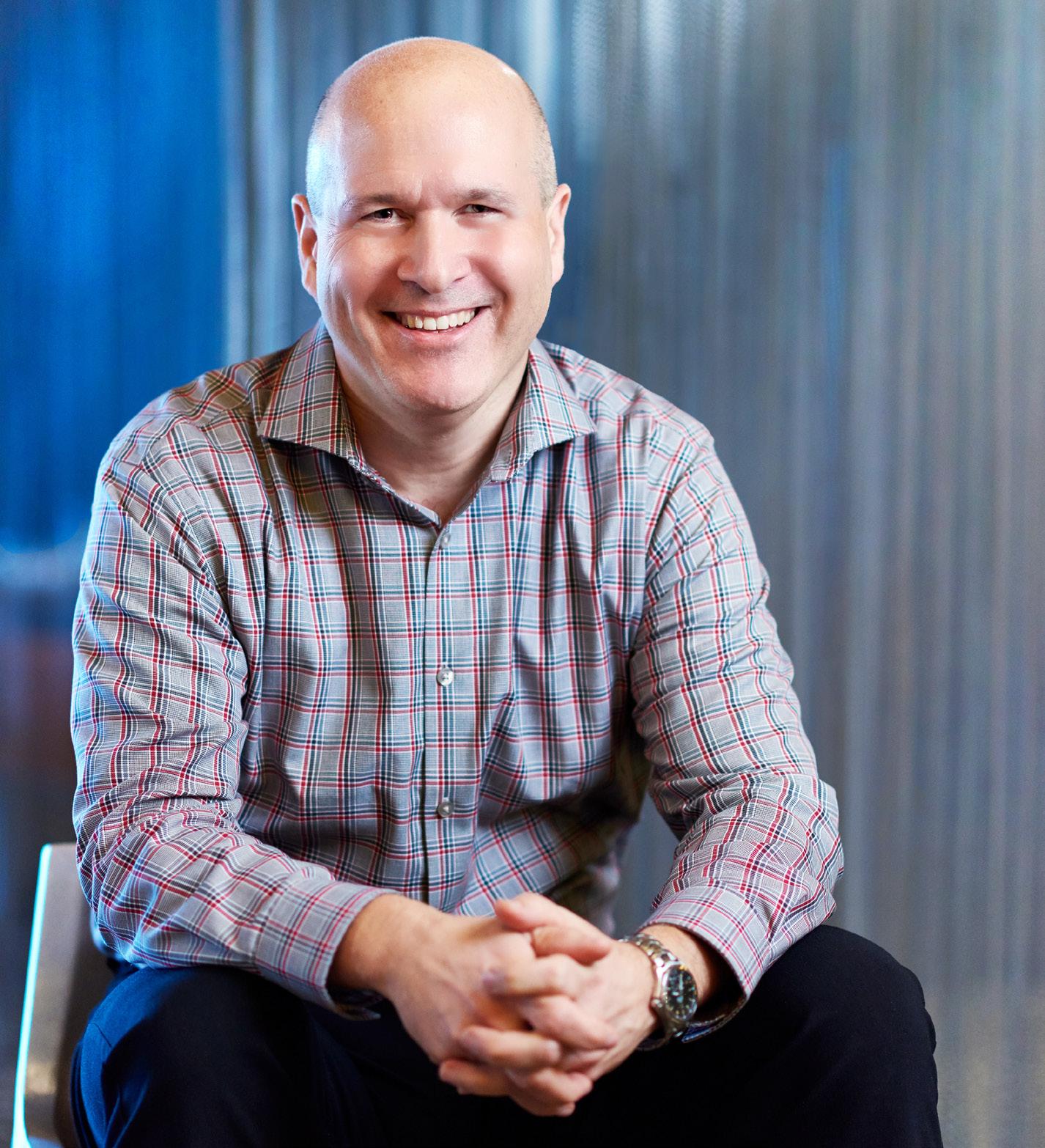
“Fortunately, we had a head start, since we had already undertaken a wholesale review of our privacy program in connection with the enactment of GDPR.”
To ensure all possible risks are managed properly, Ceridian has implemented specific risk management software that inventories and tracks all identified risks, including all mitigation efforts and detailed project plans. The tool also has an intuitive user interface and reporting tools, allowing Ceridian to create a “centralized dashboard” to easily review and report on the key risks and related activities. Through a variety of different processes and mechanisms, the ERM team is able to identify and track risks in real time, which Kitching says is critical to any successful ERM program.
“The ERM team assigns a risk level and develops an appropriate mitigation plan,” Kitching says. “For example, the business strategy team might be considering a new market or acquisition. That would be flagged by the ERM team, so people from finance, legal, marketing, and all other stakeholders can assess the pros and cons, identify potential stumbling blocks, and recommend a course of action.”
The process also enables Ceridian to respond quickly to market demands. “Our comprehensive and real-time approach to managing risk makes us nimble by giving us

a process for quickly assessing new opportunities, evaluating their inherent risks, and determining how best to move forward,” Kitching says.
A case in point is its on-demand payment solution, which enables employees to access their earned wages whenever they want, which means they do not need to wait for fixed paydays. The requests, calculations, and payouts happen seamlessly via Dayforce, Ceridian’s cloud platform. “We kept getting requests for on-demand pay through our customer suggestion portal, especially from workers in the gig economy,” Kitching observes. “Our culture of rapid risk assessment, teamwork, and focus on the customer enabled us to be the first HCM company to offer a solution.”
The approach seems to be working. “We consistently receive world-class Net Promoter Scores (NPS) from our customers,” Kitching notes. “We’re very proud of our customer service numbers and work hard to continue to deserve it by staying on top of everything that affects our clients, whether it involves new wage and hour laws or ways to improve employee satisfaction.
“We’re not just selling a product,” he continues. “We establish partnerships with our customers to help make their companies and employees more productive and profitable.”
Weil salutes Scott Kitching and appreciates the opportunity to work with Ceridian HCM and its exceptional legal team.
“A proper ERM program isn’t simply about trying to avoid or eliminate risk entirely, but knowing to what degree you can accept and manage certain risks without prejudicing the business.”
SCOTT KITCHING

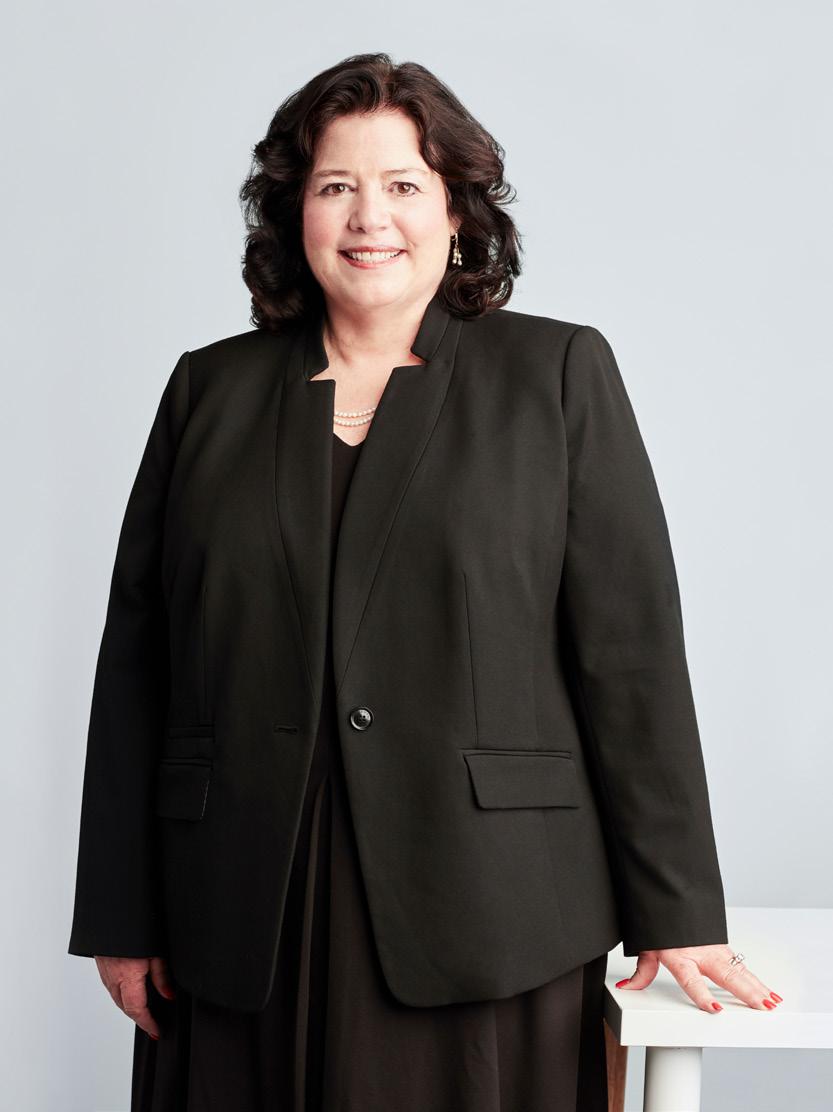
Life is not a race. Slow down and enjoy your successes (both personal and
I would tell myself to always be kind. I think that in the business world, so

Too many things come to mind! I’d say to spend less energy worrying and to rest

We are pleased to support the leading executives featured by Profile with whom we are honored to work.



